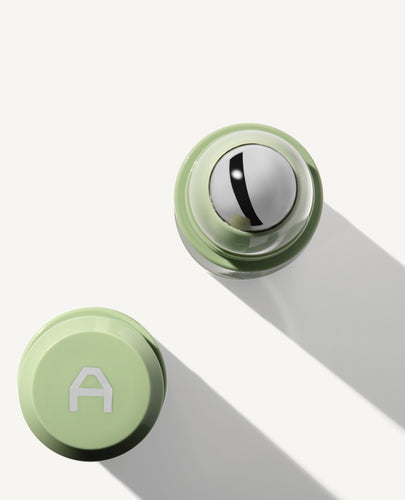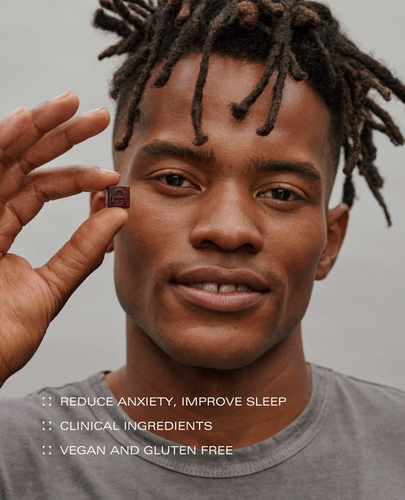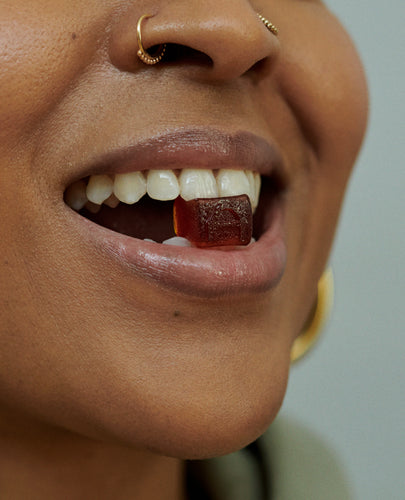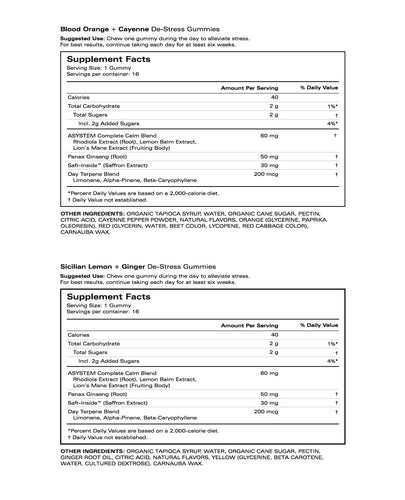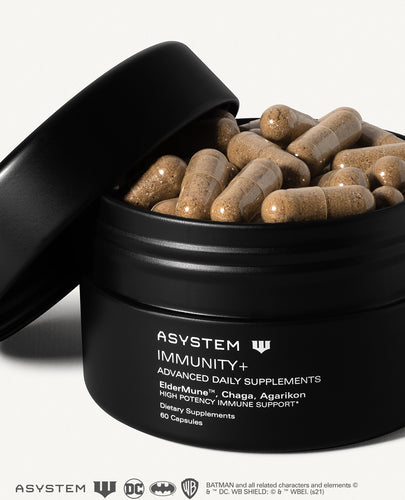asystem-wellness.myshopify.com
[{"id":8231984595184,"title":"Productivity Gummies","handle":"productivity-gummies-2","description":"\u003cp\u003eFind a calm, focused flow state.\u003c\/p\u003e\n\u003cp\u003e \u003c\/p\u003e\n\u003cp\u003eNotifications, alerts, a constant influx of tasks... we get it. It's hard to stay focused. That's why we created a daily productivity gummy. A natural solution to the age of attention stealing.\u003c\/p\u003e\n\u003cp\u003e \u003c\/p\u003e\n\u003cp\u003eMade with B vitamins, powerful nootropics like Lion's Mane and Suntheanine® (a 100% pure form of L-Theanine).\u003c\/p\u003e\n\u003cp\u003e \u003c\/p\u003e\n\u003cp\u003eWhether you are looking to replace your pre-workout or stay consistent - productivity gummies help to sharpen concentration and quiet the mind - so you can get stuff done without the burnout.*\u003c\/p\u003e\n\u003cp\u003e\u003cbr\u003e\u003c\/p\u003e","published_at":"2023-03-09T16:36:28-05:00","created_at":"2023-03-06T12:14:17-05:00","vendor":"ASYSTEM","type":"Consumable","tags":[],"price":4500,"price_min":4500,"price_max":4500,"available":true,"price_varies":false,"compare_at_price":null,"compare_at_price_min":0,"compare_at_price_max":0,"compare_at_price_varies":false,"variants":[{"id":43888157950192,"title":"Travel Tin + Refill (32 Gummies)","option1":"Travel Tin + Refill (32 Gummies)","option2":null,"option3":null,"sku":"PD-30D-M1","requires_shipping":true,"taxable":true,"featured_image":null,"available":true,"name":"Productivity Gummies - Travel Tin + Refill (32 Gummies)","public_title":"Travel Tin + Refill (32 Gummies)","options":["Travel Tin + Refill (32 Gummies)"],"price":4500,"weight":0,"compare_at_price":null,"inventory_management":"shopify","barcode":"","requires_selling_plan":false,"selling_plan_allocations":[{"price_adjustments":[{"position":1,"price":4050}],"price":4050,"compare_at_price":4500,"per_delivery_price":4050,"selling_plan_id":6412730608,"selling_plan_group_id":"26f8c07511f4e08730e3622e037123a1a3a51836"}]},{"id":43888157982960,"title":"Two Refills (32 Gummies)","option1":"Two Refills (32 Gummies)","option2":null,"option3":null,"sku":"PD-30D-MR","requires_shipping":true,"taxable":true,"featured_image":null,"available":true,"name":"Productivity Gummies - Two Refills (32 Gummies)","public_title":"Two Refills (32 Gummies)","options":["Two Refills (32 Gummies)"],"price":4500,"weight":0,"compare_at_price":null,"inventory_management":"shopify","barcode":"","requires_selling_plan":false,"selling_plan_allocations":[{"price_adjustments":[{"position":1,"price":4050}],"price":4050,"compare_at_price":4500,"per_delivery_price":4050,"selling_plan_id":6412730608,"selling_plan_group_id":"26f8c07511f4e08730e3622e037123a1a3a51836"}]}],"images":["\/\/www.asystem.com\/cdn\/shop\/products\/ProductivityPDPMainImage1_1_e02339e5-574a-4fe2-8a51-95ca8ca9e076.jpg?v=1678122871","\/\/www.asystem.com\/cdn\/shop\/products\/ProductivityPDPMainImage9_1_1_be838234-d5a8-407c-a506-57ab21e7b1f1.jpg?v=1678122871","\/\/www.asystem.com\/cdn\/shop\/files\/Hero-Productivity_1_1_05e50786-9198-403e-9d23-5e646e6a83bd.jpg?v=1736798772","\/\/www.asystem.com\/cdn\/shop\/products\/Hero-Productivity_3_1_03fc1e97-1786-4aea-bab3-4b0a1e75b0c7.jpg?v=1736798772","\/\/www.asystem.com\/cdn\/shop\/products\/ProductivityPDPMainImage10_1_1_442bdb62-f601-4bd3-91f1-656d5df71c47.jpg?v=1736798772","\/\/www.asystem.com\/cdn\/shop\/products\/ProductivityPDPMainImage7_1_2136c215-f23f-417f-a61c-e61c04a1b5c7.jpg?v=1736798772","\/\/www.asystem.com\/cdn\/shop\/files\/ProductivityPDPMainImage6_1_0a4116ba-bf4c-452b-bbc2-a5005a688f30.jpg?v=1736798772","\/\/www.asystem.com\/cdn\/shop\/files\/ProductivityPDPMainImage4_1_fa61b2b3-4968-4b69-8dde-d643a89fa317.jpg?v=1736798772","\/\/www.asystem.com\/cdn\/shop\/files\/ProductivityPDPMainImage2_1_1_095550cd-34a8-490c-b154-7744f1f788e3.jpg?v=1736798772","\/\/www.asystem.com\/cdn\/shop\/files\/af7d456e5717--Productivity-PDP-Main-Image-11-Ingredients_1600x_crop_center_1_103602d4-48e4-407d-bc2a-bbfb13c619d9.jpg?v=1736798772"],"featured_image":"\/\/www.asystem.com\/cdn\/shop\/products\/ProductivityPDPMainImage1_1_e02339e5-574a-4fe2-8a51-95ca8ca9e076.jpg?v=1678122871","options":["Pick Your Pack"],"media":[{"alt":null,"id":32250359873776,"position":1,"preview_image":{"aspect_ratio":0.779,"height":1348,"width":1050,"src":"\/\/www.asystem.com\/cdn\/shop\/products\/ProductivityPDPMainImage1_1_e02339e5-574a-4fe2-8a51-95ca8ca9e076.jpg?v=1678122871"},"aspect_ratio":0.779,"height":1348,"media_type":"image","src":"\/\/www.asystem.com\/cdn\/shop\/products\/ProductivityPDPMainImage1_1_e02339e5-574a-4fe2-8a51-95ca8ca9e076.jpg?v=1678122871","width":1050},{"alt":null,"id":32250359906544,"position":2,"preview_image":{"aspect_ratio":0.779,"height":1348,"width":1050,"src":"\/\/www.asystem.com\/cdn\/shop\/products\/ProductivityPDPMainImage9_1_1_be838234-d5a8-407c-a506-57ab21e7b1f1.jpg?v=1678122871"},"aspect_ratio":0.779,"height":1348,"media_type":"image","src":"\/\/www.asystem.com\/cdn\/shop\/products\/ProductivityPDPMainImage9_1_1_be838234-d5a8-407c-a506-57ab21e7b1f1.jpg?v=1678122871","width":1050},{"alt":null,"id":38379967185136,"position":3,"preview_image":{"aspect_ratio":0.779,"height":1348,"width":1050,"src":"\/\/www.asystem.com\/cdn\/shop\/files\/Hero-Productivity_1_1_05e50786-9198-403e-9d23-5e646e6a83bd.jpg?v=1736798772"},"aspect_ratio":0.779,"height":1348,"media_type":"image","src":"\/\/www.asystem.com\/cdn\/shop\/files\/Hero-Productivity_1_1_05e50786-9198-403e-9d23-5e646e6a83bd.jpg?v=1736798772","width":1050},{"alt":null,"id":32250359972080,"position":4,"preview_image":{"aspect_ratio":0.779,"height":1348,"width":1050,"src":"\/\/www.asystem.com\/cdn\/shop\/products\/Hero-Productivity_3_1_03fc1e97-1786-4aea-bab3-4b0a1e75b0c7.jpg?v=1736798772"},"aspect_ratio":0.779,"height":1348,"media_type":"image","src":"\/\/www.asystem.com\/cdn\/shop\/products\/Hero-Productivity_3_1_03fc1e97-1786-4aea-bab3-4b0a1e75b0c7.jpg?v=1736798772","width":1050},{"alt":null,"id":32250360037616,"position":5,"preview_image":{"aspect_ratio":0.779,"height":1348,"width":1050,"src":"\/\/www.asystem.com\/cdn\/shop\/products\/ProductivityPDPMainImage10_1_1_442bdb62-f601-4bd3-91f1-656d5df71c47.jpg?v=1736798772"},"aspect_ratio":0.779,"height":1348,"media_type":"image","src":"\/\/www.asystem.com\/cdn\/shop\/products\/ProductivityPDPMainImage10_1_1_442bdb62-f601-4bd3-91f1-656d5df71c47.jpg?v=1736798772","width":1050},{"alt":null,"id":32250360070384,"position":6,"preview_image":{"aspect_ratio":0.777,"height":1348,"width":1048,"src":"\/\/www.asystem.com\/cdn\/shop\/products\/ProductivityPDPMainImage7_1_2136c215-f23f-417f-a61c-e61c04a1b5c7.jpg?v=1736798772"},"aspect_ratio":0.777,"height":1348,"media_type":"image","src":"\/\/www.asystem.com\/cdn\/shop\/products\/ProductivityPDPMainImage7_1_2136c215-f23f-417f-a61c-e61c04a1b5c7.jpg?v=1736798772","width":1048},{"alt":null,"id":38379982422256,"position":7,"preview_image":{"aspect_ratio":0.779,"height":1348,"width":1050,"src":"\/\/www.asystem.com\/cdn\/shop\/files\/ProductivityPDPMainImage6_1_0a4116ba-bf4c-452b-bbc2-a5005a688f30.jpg?v=1736798772"},"aspect_ratio":0.779,"height":1348,"media_type":"image","src":"\/\/www.asystem.com\/cdn\/shop\/files\/ProductivityPDPMainImage6_1_0a4116ba-bf4c-452b-bbc2-a5005a688f30.jpg?v=1736798772","width":1050},{"alt":null,"id":38379981504752,"position":8,"preview_image":{"aspect_ratio":0.777,"height":1348,"width":1048,"src":"\/\/www.asystem.com\/cdn\/shop\/files\/ProductivityPDPMainImage4_1_fa61b2b3-4968-4b69-8dde-d643a89fa317.jpg?v=1736798772"},"aspect_ratio":0.777,"height":1348,"media_type":"image","src":"\/\/www.asystem.com\/cdn\/shop\/files\/ProductivityPDPMainImage4_1_fa61b2b3-4968-4b69-8dde-d643a89fa317.jpg?v=1736798772","width":1048},{"alt":null,"id":38379977048304,"position":9,"preview_image":{"aspect_ratio":0.779,"height":1348,"width":1050,"src":"\/\/www.asystem.com\/cdn\/shop\/files\/ProductivityPDPMainImage2_1_1_095550cd-34a8-490c-b154-7744f1f788e3.jpg?v=1736798772"},"aspect_ratio":0.779,"height":1348,"media_type":"image","src":"\/\/www.asystem.com\/cdn\/shop\/files\/ProductivityPDPMainImage2_1_1_095550cd-34a8-490c-b154-7744f1f788e3.jpg?v=1736798772","width":1050},{"alt":null,"id":38379970003184,"position":10,"preview_image":{"aspect_ratio":0.779,"height":1348,"width":1050,"src":"\/\/www.asystem.com\/cdn\/shop\/files\/af7d456e5717--Productivity-PDP-Main-Image-11-Ingredients_1600x_crop_center_1_103602d4-48e4-407d-bc2a-bbfb13c619d9.jpg?v=1736798772"},"aspect_ratio":0.779,"height":1348,"media_type":"image","src":"\/\/www.asystem.com\/cdn\/shop\/files\/af7d456e5717--Productivity-PDP-Main-Image-11-Ingredients_1600x_crop_center_1_103602d4-48e4-407d-bc2a-bbfb13c619d9.jpg?v=1736798772","width":1050}],"requires_selling_plan":false,"selling_plan_groups":[{"id":"26f8c07511f4e08730e3622e037123a1a3a51836","name":"Subscribe \u0026 Save","options":[{"name":"Delivery Every","position":1,"values":["32 Days"]}],"selling_plans":[{"id":6412730608,"name":"Subscribe \u0026 Save","description":null,"options":[{"name":"Delivery Every","position":1,"value":"32 Days"}],"recurring_deliveries":true,"price_adjustments":[{"order_count":null,"position":1,"value_type":"percentage","value":10}],"checkout_charge":{"value_type":"percentage","value":100}}],"app_id":"5859381"}],"content":"\u003cp\u003eFind a calm, focused flow state.\u003c\/p\u003e\n\u003cp\u003e \u003c\/p\u003e\n\u003cp\u003eNotifications, alerts, a constant influx of tasks... we get it. It's hard to stay focused. That's why we created a daily productivity gummy. A natural solution to the age of attention stealing.\u003c\/p\u003e\n\u003cp\u003e \u003c\/p\u003e\n\u003cp\u003eMade with B vitamins, powerful nootropics like Lion's Mane and Suntheanine® (a 100% pure form of L-Theanine).\u003c\/p\u003e\n\u003cp\u003e \u003c\/p\u003e\n\u003cp\u003eWhether you are looking to replace your pre-workout or stay consistent - productivity gummies help to sharpen concentration and quiet the mind - so you can get stuff done without the burnout.*\u003c\/p\u003e\n\u003cp\u003e\u003cbr\u003e\u003c\/p\u003e"},{"id":1920854982719,"title":"Complete Optimization for Men","handle":"mens-essentials-system","description":"\u003cp\u003eFor a limited time Buy 2 Get 1 Free on our Complete Optimization Supplements. Add this to your routine at a discount while it lasts.\u003c\/p\u003e\n\u003cstyle type=\"text\/css\"\u003e\u003c!--\ntd {border: 1px solid #ccc;}br {mso-data-placement:same-cell;}\n--\u003e\u003c\/style\u003e\n\u003cp\u003e \u003c\/p\u003e\n\u003cp\u003e\u003cspan style=\"font-weight: 400;\"\u003e\u003c\/span\u003e\u003cspan style=\"font-weight: 400;\"\u003eA 30-Day supply of Complete Optimization Supplements: a convenient daily pack of five capsules that contains adaptogens, nootropics, and clinically proven ingredients to boost your energy, immunity, and focus.*\u003c\/span\u003e\u003c\/p\u003e","published_at":"2023-06-27T14:04:32-04:00","created_at":"2019-07-15T18:51:57-04:00","vendor":"asystem-wellness","type":"One Time Purchase","tags":["label:for men","mh_sync","no-shipping-label-for-uk-can","NonCore","One Time"],"price":3000,"price_min":3000,"price_max":3000,"available":true,"price_varies":false,"compare_at_price":8500,"compare_at_price_min":8500,"compare_at_price_max":8500,"compare_at_price_varies":false,"variants":[{"id":15462676987967,"title":"Default Title","option1":"Default Title","option2":null,"option3":null,"sku":"ASYS-COS-30D-1","requires_shipping":true,"taxable":true,"featured_image":null,"available":true,"name":"Complete Optimization for Men","public_title":null,"options":["Default Title"],"price":3000,"weight":487,"compare_at_price":8500,"inventory_management":"shopify","barcode":"850014293000","requires_selling_plan":false,"selling_plan_allocations":[{"price_adjustments":[{"position":1,"price":2280}],"price":2280,"compare_at_price":3000,"per_delivery_price":2280,"selling_plan_id":6321766640,"selling_plan_group_id":"29f14af005b6a36aab0617f0ee0e9027aaa08c7e"}]}],"images":["\/\/www.asystem.com\/cdn\/shop\/files\/01-Hero.jpg?v=1731452393","\/\/www.asystem.com\/cdn\/shop\/products\/BI-20190507_ASY_BLS_08_295.jpg?v=1717088785","\/\/www.asystem.com\/cdn\/shop\/files\/Frame586_3_1-edit.jpg?v=1717088785","\/\/www.asystem.com\/cdn\/shop\/files\/02-Hero_1_8d6dae24-5a9e-4d4e-aff4-f9618d470be3.jpg?v=1717088785","\/\/www.asystem.com\/cdn\/shop\/files\/4VB53c2M_1_4636a801-d6cc-4070-95a9-f24b6bc6f2db.jpg?v=1717088785","\/\/www.asystem.com\/cdn\/shop\/products\/9a917f7e5260--Supplements_1600x_crop_center2.jpg?v=1717088785"],"featured_image":"\/\/www.asystem.com\/cdn\/shop\/files\/01-Hero.jpg?v=1731452393","options":["Title"],"media":[{"alt":null,"id":37876565934320,"position":1,"preview_image":{"aspect_ratio":0.779,"height":1348,"width":1050,"src":"\/\/www.asystem.com\/cdn\/shop\/files\/01-Hero.jpg?v=1731452393"},"aspect_ratio":0.779,"height":1348,"media_type":"image","src":"\/\/www.asystem.com\/cdn\/shop\/files\/01-Hero.jpg?v=1731452393","width":1050},{"alt":null,"id":31511708336368,"position":2,"preview_image":{"aspect_ratio":1.5,"height":2000,"width":3000,"src":"\/\/www.asystem.com\/cdn\/shop\/products\/BI-20190507_ASY_BLS_08_295.jpg?v=1717088785"},"aspect_ratio":1.5,"height":2000,"media_type":"image","src":"\/\/www.asystem.com\/cdn\/shop\/products\/BI-20190507_ASY_BLS_08_295.jpg?v=1717088785","width":3000},{"alt":null,"id":35892377944304,"position":3,"preview_image":{"aspect_ratio":0.779,"height":1348,"width":1050,"src":"\/\/www.asystem.com\/cdn\/shop\/files\/Frame586_3_1-edit.jpg?v=1717088785"},"aspect_ratio":0.779,"height":1348,"media_type":"image","src":"\/\/www.asystem.com\/cdn\/shop\/files\/Frame586_3_1-edit.jpg?v=1717088785","width":1050},{"alt":null,"id":34958268006640,"position":4,"preview_image":{"aspect_ratio":0.779,"height":1348,"width":1050,"src":"\/\/www.asystem.com\/cdn\/shop\/files\/02-Hero_1_8d6dae24-5a9e-4d4e-aff4-f9618d470be3.jpg?v=1717088785"},"aspect_ratio":0.779,"height":1348,"media_type":"image","src":"\/\/www.asystem.com\/cdn\/shop\/files\/02-Hero_1_8d6dae24-5a9e-4d4e-aff4-f9618d470be3.jpg?v=1717088785","width":1050},{"alt":null,"id":34958960066800,"position":5,"preview_image":{"aspect_ratio":0.779,"height":1348,"width":1050,"src":"\/\/www.asystem.com\/cdn\/shop\/files\/4VB53c2M_1_4636a801-d6cc-4070-95a9-f24b6bc6f2db.jpg?v=1717088785"},"aspect_ratio":0.779,"height":1348,"media_type":"image","src":"\/\/www.asystem.com\/cdn\/shop\/files\/4VB53c2M_1_4636a801-d6cc-4070-95a9-f24b6bc6f2db.jpg?v=1717088785","width":1050},{"alt":null,"id":31415961846000,"position":6,"preview_image":{"aspect_ratio":0.779,"height":1348,"width":1050,"src":"\/\/www.asystem.com\/cdn\/shop\/products\/9a917f7e5260--Supplements_1600x_crop_center2.jpg?v=1717088785"},"aspect_ratio":0.779,"height":1348,"media_type":"image","src":"\/\/www.asystem.com\/cdn\/shop\/products\/9a917f7e5260--Supplements_1600x_crop_center2.jpg?v=1717088785","width":1050}],"requires_selling_plan":false,"selling_plan_groups":[{"id":"29f14af005b6a36aab0617f0ee0e9027aaa08c7e","name":"Subscribe \u0026 Save","options":[{"name":"Deliver every","position":1,"values":["30 days"]}],"selling_plans":[{"id":6321766640,"name":"Subscribe \u0026 Save","description":null,"options":[{"name":"Deliver every","position":1,"value":"30 days"}],"recurring_deliveries":true,"price_adjustments":[{"order_count":null,"position":1,"value_type":"percentage","value":24}],"checkout_charge":{"value_type":"percentage","value":100}}],"app_id":"5859381"}],"content":"\u003cp\u003eFor a limited time Buy 2 Get 1 Free on our Complete Optimization Supplements. Add this to your routine at a discount while it lasts.\u003c\/p\u003e\n\u003cstyle type=\"text\/css\"\u003e\u003c!--\ntd {border: 1px solid #ccc;}br {mso-data-placement:same-cell;}\n--\u003e\u003c\/style\u003e\n\u003cp\u003e \u003c\/p\u003e\n\u003cp\u003e\u003cspan style=\"font-weight: 400;\"\u003e\u003c\/span\u003e\u003cspan style=\"font-weight: 400;\"\u003eA 30-Day supply of Complete Optimization Supplements: a convenient daily pack of five capsules that contains adaptogens, nootropics, and clinically proven ingredients to boost your energy, immunity, and focus.*\u003c\/span\u003e\u003c\/p\u003e"},{"id":7855599649008,"title":"Sleep Gummies (Melatonin Free)","handle":"complete-calm-sleep-gummies-melatonin-free","description":"\u003cp\u003e\u003cspan style=\"font-weight: 400;\"\u003eAn advanced sleep gummy. \u003c\/span\u003e\u003cspan style=\"font-weight: 400;\"\u003eMade with natural botanicals and adaptogens like \u003c\/span\u003e\u003cspan style=\"font-weight: 400;\"\u003eL-Tryptophan, Chamomile, Passionflower, Holy Basil, and a patented pure saffron, Safr-Inside™, clinically studied to help support stress and sleep. Calm your mind so you can relax, Zzz, and wake up refreshed.*\u003c\/span\u003e\u003c\/p\u003e\n\u003cp\u003e\u003cspan style=\"font-weight: 400;\"\u003e\u003cbr\u003e\u003c\/span\u003e\u003cspan style=\"font-weight: 400;\"\u003eImprove sleep quality. No daytime grogginess.*\u003c\/span\u003e\u003c\/p\u003e\n\u003cp\u003e\u003cbr\u003e\u003c\/p\u003e","published_at":"2022-02-28T12:10:16-05:00","created_at":"2022-02-28T12:10:17-05:00","vendor":"ASYSTEM","type":"Consumable","tags":["Gummy"],"price":5900,"price_min":5900,"price_max":5900,"available":true,"price_varies":false,"compare_at_price":null,"compare_at_price_min":0,"compare_at_price_max":0,"compare_at_price_varies":false,"variants":[{"id":42479566356720,"title":"Travel Tin + Refill (32 Gummies)","option1":"Travel Tin + Refill (32 Gummies)","option2":null,"option3":null,"sku":"CCS-WB-32D-M1","requires_shipping":true,"taxable":true,"featured_image":null,"available":true,"name":"Sleep Gummies (Melatonin Free) - Travel Tin + Refill (32 Gummies)","public_title":"Travel Tin + Refill (32 Gummies)","options":["Travel Tin + Refill (32 Gummies)"],"price":5900,"weight":0,"compare_at_price":null,"inventory_management":"shopify","barcode":"","requires_selling_plan":false,"selling_plan_allocations":[{"price_adjustments":[{"position":1,"price":5310}],"price":5310,"compare_at_price":5900,"per_delivery_price":5310,"selling_plan_id":6412730608,"selling_plan_group_id":"26f8c07511f4e08730e3622e037123a1a3a51836"}]},{"id":42563604250864,"title":"Two Refills (32 Gummies)","option1":"Two Refills (32 Gummies)","option2":null,"option3":null,"sku":"CCS-WB-32D-MR","requires_shipping":true,"taxable":true,"featured_image":null,"available":true,"name":"Sleep Gummies (Melatonin Free) - Two Refills (32 Gummies)","public_title":"Two Refills (32 Gummies)","options":["Two Refills (32 Gummies)"],"price":5900,"weight":0,"compare_at_price":null,"inventory_management":"shopify","barcode":"","requires_selling_plan":false,"selling_plan_allocations":[{"price_adjustments":[{"position":1,"price":5310}],"price":5310,"compare_at_price":5900,"per_delivery_price":5310,"selling_plan_id":6412730608,"selling_plan_group_id":"26f8c07511f4e08730e3622e037123a1a3a51836"}]}],"images":["\/\/www.asystem.com\/cdn\/shop\/files\/Melatonin-Free-Thumbnail_036cdd64-4c43-4d59-b8ca-ea7e16cb0a46.jpg?v=1736372556","\/\/www.asystem.com\/cdn\/shop\/files\/Frame583_2_bd6888b9-fcd9-471f-ba8b-282679a933ed.jpg?v=1738077084","\/\/www.asystem.com\/cdn\/shop\/files\/Sleep-Gummies-Lifestyles_ab6b5f45-1d49-4cad-a069-06dcfe6a5171.jpg?v=1738077084","\/\/www.asystem.com\/cdn\/shop\/files\/Frame16_1_af3d7997-fcbb-47c5-a836-81d1080cca1c.jpg?v=1738077084","\/\/www.asystem.com\/cdn\/shop\/files\/Frame14_1_1_01801a67-e4cc-4763-a888-7d3d434f423a.jpg?v=1738077084","\/\/www.asystem.com\/cdn\/shop\/products\/Frame15_1_1_44e20c12-7006-4d70-bb9b-90db50e48ed9.jpg?v=1738077084","\/\/www.asystem.com\/cdn\/shop\/files\/Melatonin_Free_4_2_8496afaa-918c-4979-af5d-c973b937bdcb.jpg?v=1738077084"],"featured_image":"\/\/www.asystem.com\/cdn\/shop\/files\/Melatonin-Free-Thumbnail_036cdd64-4c43-4d59-b8ca-ea7e16cb0a46.jpg?v=1736372556","options":["Pick Your Pack"],"media":[{"alt":null,"id":38336111706352,"position":1,"preview_image":{"aspect_ratio":0.8,"height":1350,"width":1080,"src":"\/\/www.asystem.com\/cdn\/shop\/files\/Melatonin-Free-Thumbnail_036cdd64-4c43-4d59-b8ca-ea7e16cb0a46.jpg?v=1736372556"},"aspect_ratio":0.8,"height":1350,"media_type":"image","src":"\/\/www.asystem.com\/cdn\/shop\/files\/Melatonin-Free-Thumbnail_036cdd64-4c43-4d59-b8ca-ea7e16cb0a46.jpg?v=1736372556","width":1080},{"alt":null,"id":38504150040816,"position":2,"preview_image":{"aspect_ratio":0.779,"height":1348,"width":1050,"src":"\/\/www.asystem.com\/cdn\/shop\/files\/Frame583_2_bd6888b9-fcd9-471f-ba8b-282679a933ed.jpg?v=1738077084"},"aspect_ratio":0.779,"height":1348,"media_type":"image","src":"\/\/www.asystem.com\/cdn\/shop\/files\/Frame583_2_bd6888b9-fcd9-471f-ba8b-282679a933ed.jpg?v=1738077084","width":1050},{"alt":null,"id":38336112099568,"position":3,"preview_image":{"aspect_ratio":0.779,"height":2809,"width":2188,"src":"\/\/www.asystem.com\/cdn\/shop\/files\/Sleep-Gummies-Lifestyles_ab6b5f45-1d49-4cad-a069-06dcfe6a5171.jpg?v=1738077084"},"aspect_ratio":0.779,"height":2809,"media_type":"image","src":"\/\/www.asystem.com\/cdn\/shop\/files\/Sleep-Gummies-Lifestyles_ab6b5f45-1d49-4cad-a069-06dcfe6a5171.jpg?v=1738077084","width":2188},{"alt":null,"id":38504148697328,"position":4,"preview_image":{"aspect_ratio":0.779,"height":1348,"width":1050,"src":"\/\/www.asystem.com\/cdn\/shop\/files\/Frame16_1_af3d7997-fcbb-47c5-a836-81d1080cca1c.jpg?v=1738077084"},"aspect_ratio":0.779,"height":1348,"media_type":"image","src":"\/\/www.asystem.com\/cdn\/shop\/files\/Frame16_1_af3d7997-fcbb-47c5-a836-81d1080cca1c.jpg?v=1738077084","width":1050},{"alt":null,"id":38504148664560,"position":5,"preview_image":{"aspect_ratio":0.779,"height":1348,"width":1050,"src":"\/\/www.asystem.com\/cdn\/shop\/files\/Frame14_1_1_01801a67-e4cc-4763-a888-7d3d434f423a.jpg?v=1738077084"},"aspect_ratio":0.779,"height":1348,"media_type":"image","src":"\/\/www.asystem.com\/cdn\/shop\/files\/Frame14_1_1_01801a67-e4cc-4763-a888-7d3d434f423a.jpg?v=1738077084","width":1050},{"alt":null,"id":31420166963440,"position":6,"preview_image":{"aspect_ratio":0.779,"height":1348,"width":1050,"src":"\/\/www.asystem.com\/cdn\/shop\/products\/Frame15_1_1_44e20c12-7006-4d70-bb9b-90db50e48ed9.jpg?v=1738077084"},"aspect_ratio":0.779,"height":1348,"media_type":"image","src":"\/\/www.asystem.com\/cdn\/shop\/products\/Frame15_1_1_44e20c12-7006-4d70-bb9b-90db50e48ed9.jpg?v=1738077084","width":1050},{"alt":null,"id":38336112591088,"position":7,"preview_image":{"aspect_ratio":0.779,"height":1348,"width":1050,"src":"\/\/www.asystem.com\/cdn\/shop\/files\/Melatonin_Free_4_2_8496afaa-918c-4979-af5d-c973b937bdcb.jpg?v=1738077084"},"aspect_ratio":0.779,"height":1348,"media_type":"image","src":"\/\/www.asystem.com\/cdn\/shop\/files\/Melatonin_Free_4_2_8496afaa-918c-4979-af5d-c973b937bdcb.jpg?v=1738077084","width":1050}],"requires_selling_plan":false,"selling_plan_groups":[{"id":"26f8c07511f4e08730e3622e037123a1a3a51836","name":"Subscribe \u0026 Save","options":[{"name":"Delivery Every","position":1,"values":["32 Days"]}],"selling_plans":[{"id":6412730608,"name":"Subscribe \u0026 Save","description":null,"options":[{"name":"Delivery Every","position":1,"value":"32 Days"}],"recurring_deliveries":true,"price_adjustments":[{"order_count":null,"position":1,"value_type":"percentage","value":10}],"checkout_charge":{"value_type":"percentage","value":100}}],"app_id":"5859381"}],"content":"\u003cp\u003e\u003cspan style=\"font-weight: 400;\"\u003eAn advanced sleep gummy. \u003c\/span\u003e\u003cspan style=\"font-weight: 400;\"\u003eMade with natural botanicals and adaptogens like \u003c\/span\u003e\u003cspan style=\"font-weight: 400;\"\u003eL-Tryptophan, Chamomile, Passionflower, Holy Basil, and a patented pure saffron, Safr-Inside™, clinically studied to help support stress and sleep. Calm your mind so you can relax, Zzz, and wake up refreshed.*\u003c\/span\u003e\u003c\/p\u003e\n\u003cp\u003e\u003cspan style=\"font-weight: 400;\"\u003e\u003cbr\u003e\u003c\/span\u003e\u003cspan style=\"font-weight: 400;\"\u003eImprove sleep quality. No daytime grogginess.*\u003c\/span\u003e\u003c\/p\u003e\n\u003cp\u003e\u003cbr\u003e\u003c\/p\u003e"},{"id":8370566627568,"title":"Sleep Gummies + Melatonin","handle":"complete-calm-melatonin-sleep-gummies","description":"\u003cp\u003e\u003cspan style=\"font-weight: 400;\"\u003eAn advanced all natural sleep gummy. Perfect for jet lag or anyone needing some better zzz's. \u003c\/span\u003e\u003cspan style=\"font-weight: 400;\"\u003eClinically studied to help fall asleep fast, improve sleep quality, and wake up free of grogginess.\u003c\/span\u003e\u003c\/p\u003e\n\u003cp\u003e \u003c\/p\u003e\n\u003cp\u003e\u003cspan style=\"font-weight: 400;\"\u003eMade with botanicals, adaptogens, and clinically studied ingredients like \u003c\/span\u003e\u003cspan style=\"font-weight: 400;\"\u003eSafr-Inside™, PhytoMelatonin, Chamomile, Passionflower, Holy Basil, and more. *\u003c\/span\u003e\u003cspan style=\"font-weight: 400;\"\u003e\u003c\/span\u003e\u003cbr\u003e\u003c\/p\u003e","published_at":"2023-10-31T15:05:31-04:00","created_at":"2023-10-31T15:02:57-04:00","vendor":"ASYSTEM","type":"Consumable","tags":["Gummy"],"price":3500,"price_min":3500,"price_max":5900,"available":true,"price_varies":true,"compare_at_price":null,"compare_at_price_min":0,"compare_at_price_max":0,"compare_at_price_varies":false,"variants":[{"id":44354525790448,"title":"Travel Tin + Refill (32 Gummies)","option1":"Travel Tin + Refill (32 Gummies)","option2":null,"option3":null,"sku":"CCS-WBM-32D-M1","requires_shipping":true,"taxable":true,"featured_image":null,"available":true,"name":"Sleep Gummies + Melatonin - Travel Tin + Refill (32 Gummies)","public_title":"Travel Tin + Refill (32 Gummies)","options":["Travel Tin + Refill (32 Gummies)"],"price":5900,"weight":0,"compare_at_price":null,"inventory_management":"shopify","barcode":"","requires_selling_plan":false,"selling_plan_allocations":[{"price_adjustments":[{"position":1,"price":5310}],"price":5310,"compare_at_price":5900,"per_delivery_price":5310,"selling_plan_id":6412730608,"selling_plan_group_id":"26f8c07511f4e08730e3622e037123a1a3a51836"}]},{"id":44354525888752,"title":"Two Refills (32 Gummies)","option1":"Two Refills (32 Gummies)","option2":null,"option3":null,"sku":"CCS-WBM-32D-MR","requires_shipping":true,"taxable":true,"featured_image":null,"available":true,"name":"Sleep Gummies + Melatonin - Two Refills (32 Gummies)","public_title":"Two Refills (32 Gummies)","options":["Two Refills (32 Gummies)"],"price":5900,"weight":0,"compare_at_price":null,"inventory_management":"shopify","barcode":"","requires_selling_plan":false,"selling_plan_allocations":[{"price_adjustments":[{"position":1,"price":5310}],"price":5310,"compare_at_price":5900,"per_delivery_price":5310,"selling_plan_id":6412730608,"selling_plan_group_id":"26f8c07511f4e08730e3622e037123a1a3a51836"}]},{"id":44354525855984,"title":"Travel Tin (16 Gummies)","option1":"Travel Tin (16 Gummies)","option2":null,"option3":null,"sku":"ASYS-CCS-WBWM-16D-2","requires_shipping":true,"taxable":true,"featured_image":null,"available":true,"name":"Sleep Gummies + Melatonin - Travel Tin (16 Gummies)","public_title":"Travel Tin (16 Gummies)","options":["Travel Tin (16 Gummies)"],"price":3500,"weight":0,"compare_at_price":null,"inventory_management":"shopify","barcode":"850014293109","requires_selling_plan":false,"selling_plan_allocations":[{"price_adjustments":[{"position":1,"price":3150}],"price":3150,"compare_at_price":3500,"per_delivery_price":3150,"selling_plan_id":6412730608,"selling_plan_group_id":"26f8c07511f4e08730e3622e037123a1a3a51836"}]}],"images":["\/\/www.asystem.com\/cdn\/shop\/files\/Melatonin-Thumbnail_0badce13-7427-46c9-ab2c-ca429066bec9.jpg?v=1736371853","\/\/www.asystem.com\/cdn\/shop\/files\/Frame583_2_adb02b17-b865-4d87-931c-18aa1e1d8376.jpg?v=1738077335","\/\/www.asystem.com\/cdn\/shop\/files\/Sleep-Gummies-Lifestyles_60367b42-8c44-4149-a4a1-a2399f63589a.jpg?v=1738077335","\/\/www.asystem.com\/cdn\/shop\/files\/Frame15_1_1_b92820bc-5c16-4724-a832-32a46ee7fc70.jpg?v=1738077335","\/\/www.asystem.com\/cdn\/shop\/files\/Frame14_1_1_0895987b-5b8c-44d4-9d11-e8cc6441f41e.jpg?v=1738077335","\/\/www.asystem.com\/cdn\/shop\/files\/Frame16_1_8ba914a7-7fd1-4feb-83cd-2832387c9d72.jpg?v=1738077335","\/\/www.asystem.com\/cdn\/shop\/files\/Melatonin_4_2_f8a05b6d-cfbf-46b5-b49b-686986409854.jpg?v=1738077335"],"featured_image":"\/\/www.asystem.com\/cdn\/shop\/files\/Melatonin-Thumbnail_0badce13-7427-46c9-ab2c-ca429066bec9.jpg?v=1736371853","options":["Pick Your Pack"],"media":[{"alt":null,"id":38336041844976,"position":1,"preview_image":{"aspect_ratio":0.8,"height":1350,"width":1080,"src":"\/\/www.asystem.com\/cdn\/shop\/files\/Melatonin-Thumbnail_0badce13-7427-46c9-ab2c-ca429066bec9.jpg?v=1736371853"},"aspect_ratio":0.8,"height":1350,"media_type":"image","src":"\/\/www.asystem.com\/cdn\/shop\/files\/Melatonin-Thumbnail_0badce13-7427-46c9-ab2c-ca429066bec9.jpg?v=1736371853","width":1080},{"alt":null,"id":38504173076720,"position":2,"preview_image":{"aspect_ratio":0.779,"height":1348,"width":1050,"src":"\/\/www.asystem.com\/cdn\/shop\/files\/Frame583_2_adb02b17-b865-4d87-931c-18aa1e1d8376.jpg?v=1738077335"},"aspect_ratio":0.779,"height":1348,"media_type":"image","src":"\/\/www.asystem.com\/cdn\/shop\/files\/Frame583_2_adb02b17-b865-4d87-931c-18aa1e1d8376.jpg?v=1738077335","width":1050},{"alt":null,"id":38336043385072,"position":3,"preview_image":{"aspect_ratio":0.779,"height":2809,"width":2188,"src":"\/\/www.asystem.com\/cdn\/shop\/files\/Sleep-Gummies-Lifestyles_60367b42-8c44-4149-a4a1-a2399f63589a.jpg?v=1738077335"},"aspect_ratio":0.779,"height":2809,"media_type":"image","src":"\/\/www.asystem.com\/cdn\/shop\/files\/Sleep-Gummies-Lifestyles_60367b42-8c44-4149-a4a1-a2399f63589a.jpg?v=1738077335","width":2188},{"alt":null,"id":33567431950576,"position":4,"preview_image":{"aspect_ratio":0.779,"height":1348,"width":1050,"src":"\/\/www.asystem.com\/cdn\/shop\/files\/Frame15_1_1_b92820bc-5c16-4724-a832-32a46ee7fc70.jpg?v=1738077335"},"aspect_ratio":0.779,"height":1348,"media_type":"image","src":"\/\/www.asystem.com\/cdn\/shop\/files\/Frame15_1_1_b92820bc-5c16-4724-a832-32a46ee7fc70.jpg?v=1738077335","width":1050},{"alt":null,"id":38504173011184,"position":5,"preview_image":{"aspect_ratio":0.779,"height":1348,"width":1050,"src":"\/\/www.asystem.com\/cdn\/shop\/files\/Frame14_1_1_0895987b-5b8c-44d4-9d11-e8cc6441f41e.jpg?v=1738077335"},"aspect_ratio":0.779,"height":1348,"media_type":"image","src":"\/\/www.asystem.com\/cdn\/shop\/files\/Frame14_1_1_0895987b-5b8c-44d4-9d11-e8cc6441f41e.jpg?v=1738077335","width":1050},{"alt":null,"id":38504173043952,"position":6,"preview_image":{"aspect_ratio":0.779,"height":1348,"width":1050,"src":"\/\/www.asystem.com\/cdn\/shop\/files\/Frame16_1_8ba914a7-7fd1-4feb-83cd-2832387c9d72.jpg?v=1738077335"},"aspect_ratio":0.779,"height":1348,"media_type":"image","src":"\/\/www.asystem.com\/cdn\/shop\/files\/Frame16_1_8ba914a7-7fd1-4feb-83cd-2832387c9d72.jpg?v=1738077335","width":1050},{"alt":null,"id":38336043319536,"position":7,"preview_image":{"aspect_ratio":0.779,"height":1348,"width":1050,"src":"\/\/www.asystem.com\/cdn\/shop\/files\/Melatonin_4_2_f8a05b6d-cfbf-46b5-b49b-686986409854.jpg?v=1738077335"},"aspect_ratio":0.779,"height":1348,"media_type":"image","src":"\/\/www.asystem.com\/cdn\/shop\/files\/Melatonin_4_2_f8a05b6d-cfbf-46b5-b49b-686986409854.jpg?v=1738077335","width":1050}],"requires_selling_plan":false,"selling_plan_groups":[{"id":"26f8c07511f4e08730e3622e037123a1a3a51836","name":"Subscribe \u0026 Save","options":[{"name":"Delivery Every","position":1,"values":["32 Days"]}],"selling_plans":[{"id":6412730608,"name":"Subscribe \u0026 Save","description":null,"options":[{"name":"Delivery Every","position":1,"value":"32 Days"}],"recurring_deliveries":true,"price_adjustments":[{"order_count":null,"position":1,"value_type":"percentage","value":10}],"checkout_charge":{"value_type":"percentage","value":100}}],"app_id":"5859381"}],"content":"\u003cp\u003e\u003cspan style=\"font-weight: 400;\"\u003eAn advanced all natural sleep gummy. Perfect for jet lag or anyone needing some better zzz's. \u003c\/span\u003e\u003cspan style=\"font-weight: 400;\"\u003eClinically studied to help fall asleep fast, improve sleep quality, and wake up free of grogginess.\u003c\/span\u003e\u003c\/p\u003e\n\u003cp\u003e \u003c\/p\u003e\n\u003cp\u003e\u003cspan style=\"font-weight: 400;\"\u003eMade with botanicals, adaptogens, and clinically studied ingredients like \u003c\/span\u003e\u003cspan style=\"font-weight: 400;\"\u003eSafr-Inside™, PhytoMelatonin, Chamomile, Passionflower, Holy Basil, and more. *\u003c\/span\u003e\u003cspan style=\"font-weight: 400;\"\u003e\u003c\/span\u003e\u003cbr\u003e\u003c\/p\u003e"},{"id":4485572952127,"title":"Radical Relief Gel Roll On","handle":"gel-roll-on","description":"\u003cp\u003e\u003cspan style=\"font-weight: 400;\"\u003eThe most powerful, instant pain-fighting topical on the market. \u003c\/span\u003e\u003cspan style=\"font-weight: 400;\"\u003eTested and used by athletes for workout recovery, viral for PMS cramp relief. \u003c\/span\u003e\u003c\/p\u003e\n\u003cp\u003e\u003cbr\u003e\u003c\/p\u003e\n\u003cp\u003e\u003cspan style=\"font-weight: 400;\"\u003ePacked with \u003c\/span\u003e\u003cspan style=\"font-weight: 400;\"\u003ea unique blend of muscle-soothing clinical, natural, and\u003c\/span\u003e\u003cspan style=\"font-weight: 400;\"\u003e 25% active ingredients (that’s 5x more than anyone else) like Menthol, Methyl Salicylate, Arnica Montana Oil, Pinus Pinaster Bark, and Vitamin E. \u003c\/span\u003e\u003c\/p\u003e\n\u003cp\u003e\u003cbr\u003e\u003c\/p\u003e\n\u003cp\u003e\u003cspan style=\"font-weight: 400;\"\u003eOur Radical Relief Gel Roll On works instantly to relieve pain. \u003c\/span\u003e\u003cspan style=\"font-weight: 400;\"\u003eWhether you’ve got muscle aches, period cramps, or even headaches this soothing wonder releases a cooling sensation followed by warmth and features a cryosphere applicator \u003c\/span\u003e\u003cspan style=\"font-weight: 400;\"\u003eto massage directly into your muscles and joints, further releasing tension.\u003c\/span\u003e\u003c\/p\u003e\n\u003cp\u003e \u003c\/p\u003e\n\u003cp\u003e\u003ca rel=\"noopener\" title=\"Radical Relief Gel Roll On Drug Facts\" href=\"https:\/\/cdn.shopify.com\/s\/files\/1\/0085\/4061\/8815\/files\/GROsupplementfacts-2024.jpg?v=1720727228\" target=\"_blank\"\u003e\u003cspan style=\"font-weight: 400;\"\u003eIngredient List\u003c\/span\u003e (click here)\u003c\/a\u003e\u003c\/p\u003e\n\u003cdiv\u003e\u003c\/div\u003e\n\u003cstyle type=\"text\/css\"\u003e\u003c!--\ntd {border: 1px solid #ccc;}br {mso-data-placement:same-cell;}\n--\u003e\u003c\/style\u003e","published_at":"2023-09-21T12:19:02-04:00","created_at":"2020-02-10T22:16:22-05:00","vendor":"ASYSTEM","type":"One Time Purchase","tags":["no-shipping-label-for-uk-can"],"price":4900,"price_min":4900,"price_max":4900,"available":true,"price_varies":false,"compare_at_price":null,"compare_at_price_min":0,"compare_at_price_max":0,"compare_at_price_varies":false,"variants":[{"id":31780335517759,"title":"Default Title","option1":"Default Title","option2":null,"option3":null,"sku":"ASYS-GR-30D-2","requires_shipping":true,"taxable":true,"featured_image":null,"available":true,"name":"Radical Relief Gel Roll On","public_title":null,"options":["Default Title"],"price":4900,"weight":363,"compare_at_price":null,"inventory_management":"shopify","barcode":"850014293024","requires_selling_plan":false,"selling_plan_allocations":[{"price_adjustments":[{"position":1,"price":4410}],"price":4410,"compare_at_price":4900,"per_delivery_price":4410,"selling_plan_id":6412763376,"selling_plan_group_id":"26f8c07511f4e08730e3622e037123a1a3a51836"}]}],"images":["\/\/www.asystem.com\/cdn\/shop\/files\/PDP-Gel-01.jpg?v=1689621580","\/\/www.asystem.com\/cdn\/shop\/files\/PDP-Carousel-Gel-03.jpg?v=1689621580","\/\/www.asystem.com\/cdn\/shop\/products\/GelRollOn3.jpg?v=1689621580","\/\/www.asystem.com\/cdn\/shop\/files\/GROsupplementfacts-2024-1050x1348.jpg?v=1724790174","\/\/www.asystem.com\/cdn\/shop\/files\/GRO-male-lifestyle.jpg?v=1720727231","\/\/www.asystem.com\/cdn\/shop\/files\/PDP-Carousel-Gel-04.jpg?v=1720727231","\/\/www.asystem.com\/cdn\/shop\/files\/PDP-Gel-590x550.jpg?v=1720727231"],"featured_image":"\/\/www.asystem.com\/cdn\/shop\/files\/PDP-Gel-01.jpg?v=1689621580","options":["Title"],"media":[{"alt":null,"id":32940971491568,"position":1,"preview_image":{"aspect_ratio":0.779,"height":1348,"width":1050,"src":"\/\/www.asystem.com\/cdn\/shop\/files\/PDP-Gel-01.jpg?v=1689621580"},"aspect_ratio":0.779,"height":1348,"media_type":"image","src":"\/\/www.asystem.com\/cdn\/shop\/files\/PDP-Gel-01.jpg?v=1689621580","width":1050},{"alt":null,"id":32940971557104,"position":2,"preview_image":{"aspect_ratio":0.8,"height":1000,"width":800,"src":"\/\/www.asystem.com\/cdn\/shop\/files\/PDP-Carousel-Gel-03.jpg?v=1689621580"},"aspect_ratio":0.8,"height":1000,"media_type":"image","src":"\/\/www.asystem.com\/cdn\/shop\/files\/PDP-Carousel-Gel-03.jpg?v=1689621580","width":800},{"alt":null,"id":31419831845104,"position":3,"preview_image":{"aspect_ratio":0.779,"height":1348,"width":1050,"src":"\/\/www.asystem.com\/cdn\/shop\/products\/GelRollOn3.jpg?v=1689621580"},"aspect_ratio":0.779,"height":1348,"media_type":"image","src":"\/\/www.asystem.com\/cdn\/shop\/products\/GelRollOn3.jpg?v=1689621580","width":1050},{"alt":null,"id":36903985512688,"position":4,"preview_image":{"aspect_ratio":0.779,"height":1348,"width":1050,"src":"\/\/www.asystem.com\/cdn\/shop\/files\/GROsupplementfacts-2024-1050x1348.jpg?v=1724790174"},"aspect_ratio":0.779,"height":1348,"media_type":"image","src":"\/\/www.asystem.com\/cdn\/shop\/files\/GROsupplementfacts-2024-1050x1348.jpg?v=1724790174","width":1050},{"alt":null,"id":34774295609584,"position":5,"preview_image":{"aspect_ratio":0.779,"height":1348,"width":1050,"src":"\/\/www.asystem.com\/cdn\/shop\/files\/GRO-male-lifestyle.jpg?v=1720727231"},"aspect_ratio":0.779,"height":1348,"media_type":"image","src":"\/\/www.asystem.com\/cdn\/shop\/files\/GRO-male-lifestyle.jpg?v=1720727231","width":1050},{"alt":null,"id":32940971524336,"position":6,"preview_image":{"aspect_ratio":0.8,"height":1000,"width":800,"src":"\/\/www.asystem.com\/cdn\/shop\/files\/PDP-Carousel-Gel-04.jpg?v=1720727231"},"aspect_ratio":0.8,"height":1000,"media_type":"image","src":"\/\/www.asystem.com\/cdn\/shop\/files\/PDP-Carousel-Gel-04.jpg?v=1720727231","width":800},{"alt":null,"id":32940971426032,"position":7,"preview_image":{"aspect_ratio":1.073,"height":550,"width":590,"src":"\/\/www.asystem.com\/cdn\/shop\/files\/PDP-Gel-590x550.jpg?v=1720727231"},"aspect_ratio":1.073,"height":550,"media_type":"image","src":"\/\/www.asystem.com\/cdn\/shop\/files\/PDP-Gel-590x550.jpg?v=1720727231","width":590}],"requires_selling_plan":false,"selling_plan_groups":[{"id":"26f8c07511f4e08730e3622e037123a1a3a51836","name":"Subscribe \u0026 Save","options":[{"name":"Delivery Every","position":1,"values":["90 Days"]}],"selling_plans":[{"id":6412763376,"name":"Subscribe \u0026 Save","description":null,"options":[{"name":"Delivery Every","position":1,"value":"90 Days"}],"recurring_deliveries":true,"price_adjustments":[{"order_count":null,"position":1,"value_type":"percentage","value":10}],"checkout_charge":{"value_type":"percentage","value":100}}],"app_id":"5859381"}],"content":"\u003cp\u003e\u003cspan style=\"font-weight: 400;\"\u003eThe most powerful, instant pain-fighting topical on the market. \u003c\/span\u003e\u003cspan style=\"font-weight: 400;\"\u003eTested and used by athletes for workout recovery, viral for PMS cramp relief. \u003c\/span\u003e\u003c\/p\u003e\n\u003cp\u003e\u003cbr\u003e\u003c\/p\u003e\n\u003cp\u003e\u003cspan style=\"font-weight: 400;\"\u003ePacked with \u003c\/span\u003e\u003cspan style=\"font-weight: 400;\"\u003ea unique blend of muscle-soothing clinical, natural, and\u003c\/span\u003e\u003cspan style=\"font-weight: 400;\"\u003e 25% active ingredients (that’s 5x more than anyone else) like Menthol, Methyl Salicylate, Arnica Montana Oil, Pinus Pinaster Bark, and Vitamin E. \u003c\/span\u003e\u003c\/p\u003e\n\u003cp\u003e\u003cbr\u003e\u003c\/p\u003e\n\u003cp\u003e\u003cspan style=\"font-weight: 400;\"\u003eOur Radical Relief Gel Roll On works instantly to relieve pain. \u003c\/span\u003e\u003cspan style=\"font-weight: 400;\"\u003eWhether you’ve got muscle aches, period cramps, or even headaches this soothing wonder releases a cooling sensation followed by warmth and features a cryosphere applicator \u003c\/span\u003e\u003cspan style=\"font-weight: 400;\"\u003eto massage directly into your muscles and joints, further releasing tension.\u003c\/span\u003e\u003c\/p\u003e\n\u003cp\u003e \u003c\/p\u003e\n\u003cp\u003e\u003ca rel=\"noopener\" title=\"Radical Relief Gel Roll On Drug Facts\" href=\"https:\/\/cdn.shopify.com\/s\/files\/1\/0085\/4061\/8815\/files\/GROsupplementfacts-2024.jpg?v=1720727228\" target=\"_blank\"\u003e\u003cspan style=\"font-weight: 400;\"\u003eIngredient List\u003c\/span\u003e (click here)\u003c\/a\u003e\u003c\/p\u003e\n\u003cdiv\u003e\u003c\/div\u003e\n\u003cstyle type=\"text\/css\"\u003e\u003c!--\ntd {border: 1px solid #ccc;}br {mso-data-placement:same-cell;}\n--\u003e\u003c\/style\u003e"},{"id":6619438383297,"title":"De-Stress Gummies","handle":"complete-calm-destress","description":"\u003cp\u003eImprove your ability to handle stress and tune into a sense of relaxed presence. \u003c\/p\u003e\n\u003cp\u003e \u003c\/p\u003e\n\u003cp\u003eMade with natural, clinically studied ingredients like Safr'Inside™ and ancient botanicals like Lemon Balm, Lion's Mane, and more. \u003c\/p\u003e\n\u003cp\u003e \u003c\/p\u003e\n\u003cp\u003eTake one gummy daily to cut through the noise of external stressors and cue blissful relaxation.*\u003c\/p\u003e","published_at":"2021-03-30T16:37:32-04:00","created_at":"2021-03-30T16:21:45-04:00","vendor":"ASYSTEM","type":"Consumable","tags":["Gummy"],"price":5900,"price_min":5900,"price_max":5900,"available":true,"price_varies":false,"compare_at_price":null,"compare_at_price_min":0,"compare_at_price_max":0,"compare_at_price_varies":false,"variants":[{"id":39557338038465,"title":"Sicilian Lemon + Ginger","option1":"Sicilian Lemon + Ginger","option2":null,"option3":null,"sku":"CCDS-SLG-32D-M1","requires_shipping":true,"taxable":true,"featured_image":null,"available":true,"name":"De-Stress Gummies - Sicilian Lemon + Ginger","public_title":"Sicilian Lemon + Ginger","options":["Sicilian Lemon + Ginger"],"price":5900,"weight":0,"compare_at_price":null,"inventory_management":"shopify","barcode":"","requires_selling_plan":false,"selling_plan_allocations":[{"price_adjustments":[{"position":1,"price":5310}],"price":5310,"compare_at_price":5900,"per_delivery_price":5310,"selling_plan_id":6412730608,"selling_plan_group_id":"26f8c07511f4e08730e3622e037123a1a3a51836"}]},{"id":39557338104001,"title":"Blood Orange + Cayenne","option1":"Blood Orange + Cayenne","option2":null,"option3":null,"sku":"CCDS-BOC-32D-M1","requires_shipping":true,"taxable":true,"featured_image":null,"available":true,"name":"De-Stress Gummies - Blood Orange + Cayenne","public_title":"Blood Orange + Cayenne","options":["Blood Orange + Cayenne"],"price":5900,"weight":0,"compare_at_price":null,"inventory_management":"shopify","barcode":"","requires_selling_plan":false,"selling_plan_allocations":[{"price_adjustments":[{"position":1,"price":5310}],"price":5310,"compare_at_price":5900,"per_delivery_price":5310,"selling_plan_id":6412730608,"selling_plan_group_id":"26f8c07511f4e08730e3622e037123a1a3a51836"}]}],"images":["\/\/www.asystem.com\/cdn\/shop\/files\/destress-lemon_portrait-PDP_70f83a97-03d6-4427-a8d5-c4adc938ccea.jpg?v=1736803188","\/\/www.asystem.com\/cdn\/shop\/files\/Destress-Gummies-Lifestyles-02.jpg?v=1736803188","\/\/www.asystem.com\/cdn\/shop\/files\/Destress-Gummies-Lifestyles-01_1629dd6e-cd60-4902-8643-baa3dd7c8ab3.jpg?v=1736803188","\/\/www.asystem.com\/cdn\/shop\/products\/Frame22_ba10d037-b093-4a12-a2fd-39d6c3be723b_1.jpg?v=1736803188","\/\/www.asystem.com\/cdn\/shop\/files\/Frame11_1_e4ea6a92-5ddf-4e81-9589-c93e7236ac8c.jpg?v=1738077618","\/\/www.asystem.com\/cdn\/shop\/products\/Frame10_69b1ba65-7207-4197-b883-0e8b29c7da00_1.jpg?v=1738077618","\/\/www.asystem.com\/cdn\/shop\/products\/Frame4_83dae107-3a51-4cc2-be58-9425fa050506_1.jpg?v=1738077618","\/\/www.asystem.com\/cdn\/shop\/files\/De-Stress_1.jpg?v=1738077618"],"featured_image":"\/\/www.asystem.com\/cdn\/shop\/files\/destress-lemon_portrait-PDP_70f83a97-03d6-4427-a8d5-c4adc938ccea.jpg?v=1736803188","options":["Pick Your Flavor"],"media":[{"alt":null,"id":38380462178544,"position":1,"preview_image":{"aspect_ratio":0.779,"height":1348,"width":1050,"src":"\/\/www.asystem.com\/cdn\/shop\/files\/destress-lemon_portrait-PDP_70f83a97-03d6-4427-a8d5-c4adc938ccea.jpg?v=1736803188"},"aspect_ratio":0.779,"height":1348,"media_type":"image","src":"\/\/www.asystem.com\/cdn\/shop\/files\/destress-lemon_portrait-PDP_70f83a97-03d6-4427-a8d5-c4adc938ccea.jpg?v=1736803188","width":1050},{"alt":null,"id":35875266887920,"position":2,"preview_image":{"aspect_ratio":0.779,"height":2809,"width":2188,"src":"\/\/www.asystem.com\/cdn\/shop\/files\/Destress-Gummies-Lifestyles-02.jpg?v=1736803188"},"aspect_ratio":0.779,"height":2809,"media_type":"image","src":"\/\/www.asystem.com\/cdn\/shop\/files\/Destress-Gummies-Lifestyles-02.jpg?v=1736803188","width":2188},{"alt":null,"id":38380462964976,"position":3,"preview_image":{"aspect_ratio":0.779,"height":2809,"width":2188,"src":"\/\/www.asystem.com\/cdn\/shop\/files\/Destress-Gummies-Lifestyles-01_1629dd6e-cd60-4902-8643-baa3dd7c8ab3.jpg?v=1736803188"},"aspect_ratio":0.779,"height":2809,"media_type":"image","src":"\/\/www.asystem.com\/cdn\/shop\/files\/Destress-Gummies-Lifestyles-01_1629dd6e-cd60-4902-8643-baa3dd7c8ab3.jpg?v=1736803188","width":2188},{"alt":null,"id":31420185510128,"position":4,"preview_image":{"aspect_ratio":0.78,"height":1344,"width":1048,"src":"\/\/www.asystem.com\/cdn\/shop\/products\/Frame22_ba10d037-b093-4a12-a2fd-39d6c3be723b_1.jpg?v=1736803188"},"aspect_ratio":0.78,"height":1344,"media_type":"image","src":"\/\/www.asystem.com\/cdn\/shop\/products\/Frame22_ba10d037-b093-4a12-a2fd-39d6c3be723b_1.jpg?v=1736803188","width":1048},{"alt":null,"id":38504202567920,"position":5,"preview_image":{"aspect_ratio":0.78,"height":1344,"width":1048,"src":"\/\/www.asystem.com\/cdn\/shop\/files\/Frame11_1_e4ea6a92-5ddf-4e81-9589-c93e7236ac8c.jpg?v=1738077618"},"aspect_ratio":0.78,"height":1344,"media_type":"image","src":"\/\/www.asystem.com\/cdn\/shop\/files\/Frame11_1_e4ea6a92-5ddf-4e81-9589-c93e7236ac8c.jpg?v=1738077618","width":1048},{"alt":null,"id":31420185575664,"position":6,"preview_image":{"aspect_ratio":0.78,"height":1344,"width":1048,"src":"\/\/www.asystem.com\/cdn\/shop\/products\/Frame10_69b1ba65-7207-4197-b883-0e8b29c7da00_1.jpg?v=1738077618"},"aspect_ratio":0.78,"height":1344,"media_type":"image","src":"\/\/www.asystem.com\/cdn\/shop\/products\/Frame10_69b1ba65-7207-4197-b883-0e8b29c7da00_1.jpg?v=1738077618","width":1048},{"alt":null,"id":31420185608432,"position":7,"preview_image":{"aspect_ratio":0.78,"height":1344,"width":1048,"src":"\/\/www.asystem.com\/cdn\/shop\/products\/Frame4_83dae107-3a51-4cc2-be58-9425fa050506_1.jpg?v=1738077618"},"aspect_ratio":0.78,"height":1344,"media_type":"image","src":"\/\/www.asystem.com\/cdn\/shop\/products\/Frame4_83dae107-3a51-4cc2-be58-9425fa050506_1.jpg?v=1738077618","width":1048},{"alt":null,"id":38380463194352,"position":8,"preview_image":{"aspect_ratio":0.779,"height":1348,"width":1050,"src":"\/\/www.asystem.com\/cdn\/shop\/files\/De-Stress_1.jpg?v=1738077618"},"aspect_ratio":0.779,"height":1348,"media_type":"image","src":"\/\/www.asystem.com\/cdn\/shop\/files\/De-Stress_1.jpg?v=1738077618","width":1050}],"requires_selling_plan":false,"selling_plan_groups":[{"id":"26f8c07511f4e08730e3622e037123a1a3a51836","name":"Subscribe \u0026 Save","options":[{"name":"Delivery Every","position":1,"values":["32 Days"]}],"selling_plans":[{"id":6412730608,"name":"Subscribe \u0026 Save","description":null,"options":[{"name":"Delivery Every","position":1,"value":"32 Days"}],"recurring_deliveries":true,"price_adjustments":[{"order_count":null,"position":1,"value_type":"percentage","value":10}],"checkout_charge":{"value_type":"percentage","value":100}}],"app_id":"5859381"}],"content":"\u003cp\u003eImprove your ability to handle stress and tune into a sense of relaxed presence. \u003c\/p\u003e\n\u003cp\u003e \u003c\/p\u003e\n\u003cp\u003eMade with natural, clinically studied ingredients like Safr'Inside™ and ancient botanicals like Lemon Balm, Lion's Mane, and more. \u003c\/p\u003e\n\u003cp\u003e \u003c\/p\u003e\n\u003cp\u003eTake one gummy daily to cut through the noise of external stressors and cue blissful relaxation.*\u003c\/p\u003e"},{"id":9141443461360,"title":"The Athlete's Tool Kit","handle":"the-athletes-tool-kit","description":"\u003cp dir=\"ltr\"\u003e\u003cspan\u003eLevel up your workouts and recovery routine to optimize your goals with the ASYSTEM Athlete's Toolkit. Created to give you the best stamina, energy, recovery, and performance while remaining in a centered state of mind, allowing you to stay consistent with gains and meet your goals.*\u003c\/span\u003e\u003c\/p\u003e\n\u003cp\u003e\u003cb\u003e\u003cbr\u003e\u003c\/b\u003e\u003c\/p\u003e\n\u003cp dir=\"ltr\"\u003e\u003cstrong\u003eWhat's Inside:\u003c\/strong\u003e\u003c\/p\u003e\n\u003cp dir=\"ltr\"\u003e\u003cspan\u003e(3) Radical Relief Gel Roll On \u003c\/span\u003e\u003c\/p\u003e\n\u003cp dir=\"ltr\"\u003e\u003cspan\u003e(1) 32-day supply of Productivity Gummies\u003c\/span\u003e\u003c\/p\u003e\n\u003cp\u003e \u003c\/p\u003e","published_at":"2025-03-06T11:16:44-05:00","created_at":"2024-12-17T15:46:17-05:00","vendor":"ASYSTEM","type":"","tags":[],"price":14200,"price_min":14200,"price_max":14200,"available":true,"price_varies":false,"compare_at_price":17800,"compare_at_price_min":17800,"compare_at_price_max":17800,"compare_at_price_varies":false,"variants":[{"id":46901300035824,"title":"Default Title","option1":"Default Title","option2":null,"option3":null,"sku":null,"requires_shipping":true,"taxable":true,"featured_image":null,"available":true,"name":"The Athlete's Tool Kit","public_title":null,"options":["Default Title"],"price":14200,"weight":0,"compare_at_price":17800,"inventory_management":"shopify","barcode":null,"requires_selling_plan":false,"selling_plan_allocations":[]}],"images":["\/\/www.asystem.com\/cdn\/shop\/files\/Athletes-Tool-Kit-Bundle-PDP-Stylized-Image-V1_9acb1cf0-83fa-48f0-8dc8-8c302cfbd266.png?v=1734628168","\/\/www.asystem.com\/cdn\/shop\/files\/Athletes-Tool-Kit-Bundle-PDP-Stylized-Image-V8.png?v=1735227475","\/\/www.asystem.com\/cdn\/shop\/files\/Athletes-Tool-Kit-Bundle-background.jpg?v=1735227475","\/\/www.asystem.com\/cdn\/shop\/files\/ProductivityPDPMainImage1_1_e02339e5-574a-4fe2-8a51-95ca8ca9e076.jpg?v=1735227475","\/\/www.asystem.com\/cdn\/shop\/files\/PDP-Gel-01_76a06581-f887-46d2-858d-89ff96cd4604.jpg?v=1735227475"],"featured_image":"\/\/www.asystem.com\/cdn\/shop\/files\/Athletes-Tool-Kit-Bundle-PDP-Stylized-Image-V1_9acb1cf0-83fa-48f0-8dc8-8c302cfbd266.png?v=1734628168","options":["Title"],"media":[{"alt":null,"id":38194644418800,"position":1,"preview_image":{"aspect_ratio":0.8,"height":1500,"width":1200,"src":"\/\/www.asystem.com\/cdn\/shop\/files\/Athletes-Tool-Kit-Bundle-PDP-Stylized-Image-V1_9acb1cf0-83fa-48f0-8dc8-8c302cfbd266.png?v=1734628168"},"aspect_ratio":0.8,"height":1500,"media_type":"image","src":"\/\/www.asystem.com\/cdn\/shop\/files\/Athletes-Tool-Kit-Bundle-PDP-Stylized-Image-V1_9acb1cf0-83fa-48f0-8dc8-8c302cfbd266.png?v=1734628168","width":1200},{"alt":null,"id":38249102868720,"position":2,"preview_image":{"aspect_ratio":0.8,"height":1500,"width":1200,"src":"\/\/www.asystem.com\/cdn\/shop\/files\/Athletes-Tool-Kit-Bundle-PDP-Stylized-Image-V8.png?v=1735227475"},"aspect_ratio":0.8,"height":1500,"media_type":"image","src":"\/\/www.asystem.com\/cdn\/shop\/files\/Athletes-Tool-Kit-Bundle-PDP-Stylized-Image-V8.png?v=1735227475","width":1200},{"alt":null,"id":38249104638192,"position":3,"preview_image":{"aspect_ratio":0.8,"height":1350,"width":1080,"src":"\/\/www.asystem.com\/cdn\/shop\/files\/Athletes-Tool-Kit-Bundle-background.jpg?v=1735227475"},"aspect_ratio":0.8,"height":1350,"media_type":"image","src":"\/\/www.asystem.com\/cdn\/shop\/files\/Athletes-Tool-Kit-Bundle-background.jpg?v=1735227475","width":1080},{"alt":null,"id":35100019491056,"position":4,"preview_image":{"aspect_ratio":0.779,"height":1348,"width":1050,"src":"\/\/www.asystem.com\/cdn\/shop\/files\/ProductivityPDPMainImage1_1_e02339e5-574a-4fe2-8a51-95ca8ca9e076.jpg?v=1735227475"},"aspect_ratio":0.779,"height":1348,"media_type":"image","src":"\/\/www.asystem.com\/cdn\/shop\/files\/ProductivityPDPMainImage1_1_e02339e5-574a-4fe2-8a51-95ca8ca9e076.jpg?v=1735227475","width":1050},{"alt":null,"id":36724772143344,"position":5,"preview_image":{"aspect_ratio":0.779,"height":1348,"width":1050,"src":"\/\/www.asystem.com\/cdn\/shop\/files\/PDP-Gel-01_76a06581-f887-46d2-858d-89ff96cd4604.jpg?v=1735227475"},"aspect_ratio":0.779,"height":1348,"media_type":"image","src":"\/\/www.asystem.com\/cdn\/shop\/files\/PDP-Gel-01_76a06581-f887-46d2-858d-89ff96cd4604.jpg?v=1735227475","width":1050}],"requires_selling_plan":false,"selling_plan_groups":[],"content":"\u003cp dir=\"ltr\"\u003e\u003cspan\u003eLevel up your workouts and recovery routine to optimize your goals with the ASYSTEM Athlete's Toolkit. Created to give you the best stamina, energy, recovery, and performance while remaining in a centered state of mind, allowing you to stay consistent with gains and meet your goals.*\u003c\/span\u003e\u003c\/p\u003e\n\u003cp\u003e\u003cb\u003e\u003cbr\u003e\u003c\/b\u003e\u003c\/p\u003e\n\u003cp dir=\"ltr\"\u003e\u003cstrong\u003eWhat's Inside:\u003c\/strong\u003e\u003c\/p\u003e\n\u003cp dir=\"ltr\"\u003e\u003cspan\u003e(3) Radical Relief Gel Roll On \u003c\/span\u003e\u003c\/p\u003e\n\u003cp dir=\"ltr\"\u003e\u003cspan\u003e(1) 32-day supply of Productivity Gummies\u003c\/span\u003e\u003c\/p\u003e\n\u003cp\u003e \u003c\/p\u003e"},{"id":9092130799856,"title":"The System Reset Bundle","handle":"the-system-reset-bundle-virtual","description":"\u003cp dir=\"ltr\"\u003e\u003cspan\u003eThe System Reset Bundle was built to help you kickstart your reset journey. Establishing a new routine like hitting the gym, breathwork or daily journaling can be overwhelming at first. Our products were built to lay the foundation for unlocking your true potential to achieve your goals. \u003c\/span\u003e\u003c\/p\u003e\n\u003cp\u003e\u003cb\u003e\u003cbr\u003e\u003c\/b\u003e\u003c\/p\u003e\n\u003cp dir=\"ltr\"\u003e\u003cspan\u003eJumpstart your new routine by remaining focused with Productivity gummies, avoiding burnout with Destress Gummies, recovering from that new gym routine or WFH tech neck with Radical Relief Gel Roll On, and resetting in a deep, restorative sleep with Sleep Gummies. Your new system, your best life.* \u003c\/span\u003e\u003cb\u003e\u003c\/b\u003e\u003c\/p\u003e\n\u003cp\u003e \u003c\/p\u003e\n\u003cp dir=\"ltr\"\u003e\u003cstrong\u003eWhat's Inside:\u003c\/strong\u003e\u003c\/p\u003e\n\u003cp dir=\"ltr\"\u003e\u003cspan\u003e32-day supply of Productivity Gummies \u003c\/span\u003e\u003c\/p\u003e\n\u003cp dir=\"ltr\"\u003e\u003cspan\u003e32-day supply of Destress Gummies \u003c\/span\u003e\u003c\/p\u003e\n\u003cp dir=\"ltr\"\u003e\u003cspan\u003e90-day supply of Radical Relief Gel Roll On \u003c\/span\u003e\u003c\/p\u003e\n\u003cp dir=\"ltr\"\u003e\u003cspan\u003e32-day supply of Sleep Gummies \u003c\/span\u003e\u003c\/p\u003e\n\u003cp\u003e \u003c\/p\u003e","published_at":"2025-03-31T14:27:32-04:00","created_at":"2024-11-05T21:29:08-05:00","vendor":"ASYSTEM","type":"","tags":["strikethrough-price"],"price":17000,"price_min":17000,"price_max":17000,"available":true,"price_varies":false,"compare_at_price":21200,"compare_at_price_min":21200,"compare_at_price_max":21200,"compare_at_price_varies":false,"variants":[{"id":46767047803120,"title":"Sicilian Lemon + Ginger \/ Wild Berry + Melatonin","option1":"Sicilian Lemon + Ginger","option2":"Wild Berry + Melatonin","option3":null,"sku":"","requires_shipping":true,"taxable":true,"featured_image":null,"available":true,"name":"The System Reset Bundle - Sicilian Lemon + Ginger \/ Wild Berry + Melatonin","public_title":"Sicilian Lemon + Ginger \/ Wild Berry + Melatonin","options":["Sicilian Lemon + Ginger","Wild Berry + Melatonin"],"price":17000,"weight":0,"compare_at_price":21200,"inventory_management":"shopify","barcode":"","requires_selling_plan":false,"selling_plan_allocations":[]},{"id":46767047835888,"title":"Sicilian Lemon + Ginger \/ Wild Berry (Melatonin Free)","option1":"Sicilian Lemon + Ginger","option2":"Wild Berry (Melatonin Free)","option3":null,"sku":"","requires_shipping":true,"taxable":true,"featured_image":null,"available":true,"name":"The System Reset Bundle - Sicilian Lemon + Ginger \/ Wild Berry (Melatonin Free)","public_title":"Sicilian Lemon + Ginger \/ Wild Berry (Melatonin Free)","options":["Sicilian Lemon + Ginger","Wild Berry (Melatonin Free)"],"price":17000,"weight":0,"compare_at_price":21200,"inventory_management":"shopify","barcode":"","requires_selling_plan":false,"selling_plan_allocations":[]},{"id":46767047868656,"title":"Blood Orange + Cayenne \/ Wild Berry + Melatonin","option1":"Blood Orange + Cayenne","option2":"Wild Berry + Melatonin","option3":null,"sku":"","requires_shipping":true,"taxable":true,"featured_image":null,"available":true,"name":"The System Reset Bundle - Blood Orange + Cayenne \/ Wild Berry + Melatonin","public_title":"Blood Orange + Cayenne \/ Wild Berry + Melatonin","options":["Blood Orange + Cayenne","Wild Berry + Melatonin"],"price":17000,"weight":0,"compare_at_price":21200,"inventory_management":"shopify","barcode":"","requires_selling_plan":false,"selling_plan_allocations":[]},{"id":46767047901424,"title":"Blood Orange + Cayenne \/ Wild Berry (Melatonin Free)","option1":"Blood Orange + Cayenne","option2":"Wild Berry (Melatonin Free)","option3":null,"sku":"","requires_shipping":true,"taxable":true,"featured_image":null,"available":true,"name":"The System Reset Bundle - Blood Orange + Cayenne \/ Wild Berry (Melatonin Free)","public_title":"Blood Orange + Cayenne \/ Wild Berry (Melatonin Free)","options":["Blood Orange + Cayenne","Wild Berry (Melatonin Free)"],"price":17000,"weight":0,"compare_at_price":21200,"inventory_management":"shopify","barcode":"","requires_selling_plan":false,"selling_plan_allocations":[]}],"images":["\/\/www.asystem.com\/cdn\/shop\/files\/System-Reset-Bundle-Stylized-PDP-Image.png?v=1731957861","\/\/www.asystem.com\/cdn\/shop\/files\/System-Reset-Melatonin-Bundle-SLG-background.jpg?v=1731033625","\/\/www.asystem.com\/cdn\/shop\/files\/PDP-Gel-01_76a06581-f887-46d2-858d-89ff96cd4604.jpg?v=1735227475","\/\/www.asystem.com\/cdn\/shop\/files\/Destress-Gummies-Thumbnail.jpg?v=1727195902","\/\/www.asystem.com\/cdn\/shop\/files\/ProductivityPDPMainImage1_1_1575f18c-bcb5-41db-aab2-d26c42caa0c9.jpg?v=1717448081","\/\/www.asystem.com\/cdn\/shop\/files\/Melatonin-Thumbnail.jpg?v=1736371853"],"featured_image":"\/\/www.asystem.com\/cdn\/shop\/files\/System-Reset-Bundle-Stylized-PDP-Image.png?v=1731957861","options":["Choose Your De-Stress Flavor","Choose Your Sleep Gummy Type"],"media":[{"alt":null,"id":37929840378096,"position":1,"preview_image":{"aspect_ratio":0.8,"height":1500,"width":1200,"src":"\/\/www.asystem.com\/cdn\/shop\/files\/System-Reset-Bundle-Stylized-PDP-Image.png?v=1731957861"},"aspect_ratio":0.8,"height":1500,"media_type":"image","src":"\/\/www.asystem.com\/cdn\/shop\/files\/System-Reset-Bundle-Stylized-PDP-Image.png?v=1731957861","width":1200},{"alt":null,"id":37831989756144,"position":2,"preview_image":{"aspect_ratio":0.8,"height":1350,"width":1080,"src":"\/\/www.asystem.com\/cdn\/shop\/files\/System-Reset-Melatonin-Bundle-SLG-background.jpg?v=1731033625"},"aspect_ratio":0.8,"height":1350,"media_type":"image","src":"\/\/www.asystem.com\/cdn\/shop\/files\/System-Reset-Melatonin-Bundle-SLG-background.jpg?v=1731033625","width":1080},{"alt":null,"id":36724772143344,"position":3,"preview_image":{"aspect_ratio":0.779,"height":1348,"width":1050,"src":"\/\/www.asystem.com\/cdn\/shop\/files\/PDP-Gel-01_76a06581-f887-46d2-858d-89ff96cd4604.jpg?v=1735227475"},"aspect_ratio":0.779,"height":1348,"media_type":"image","src":"\/\/www.asystem.com\/cdn\/shop\/files\/PDP-Gel-01_76a06581-f887-46d2-858d-89ff96cd4604.jpg?v=1735227475","width":1050},{"alt":null,"id":37273597444336,"position":4,"preview_image":{"aspect_ratio":0.8,"height":1350,"width":1080,"src":"\/\/www.asystem.com\/cdn\/shop\/files\/Destress-Gummies-Thumbnail.jpg?v=1727195902"},"aspect_ratio":0.8,"height":1350,"media_type":"image","src":"\/\/www.asystem.com\/cdn\/shop\/files\/Destress-Gummies-Thumbnail.jpg?v=1727195902","width":1080},{"alt":null,"id":35931565883632,"position":5,"preview_image":{"aspect_ratio":0.779,"height":1348,"width":1050,"src":"\/\/www.asystem.com\/cdn\/shop\/files\/ProductivityPDPMainImage1_1_1575f18c-bcb5-41db-aab2-d26c42caa0c9.jpg?v=1717448081"},"aspect_ratio":0.779,"height":1348,"media_type":"image","src":"\/\/www.asystem.com\/cdn\/shop\/files\/ProductivityPDPMainImage1_1_1575f18c-bcb5-41db-aab2-d26c42caa0c9.jpg?v=1717448081","width":1050},{"alt":null,"id":36904481259760,"position":6,"preview_image":{"aspect_ratio":0.8,"height":1350,"width":1080,"src":"\/\/www.asystem.com\/cdn\/shop\/files\/Melatonin-Thumbnail.jpg?v=1736371853"},"aspect_ratio":0.8,"height":1350,"media_type":"image","src":"\/\/www.asystem.com\/cdn\/shop\/files\/Melatonin-Thumbnail.jpg?v=1736371853","width":1080}],"requires_selling_plan":false,"selling_plan_groups":[],"content":"\u003cp dir=\"ltr\"\u003e\u003cspan\u003eThe System Reset Bundle was built to help you kickstart your reset journey. Establishing a new routine like hitting the gym, breathwork or daily journaling can be overwhelming at first. Our products were built to lay the foundation for unlocking your true potential to achieve your goals. \u003c\/span\u003e\u003c\/p\u003e\n\u003cp\u003e\u003cb\u003e\u003cbr\u003e\u003c\/b\u003e\u003c\/p\u003e\n\u003cp dir=\"ltr\"\u003e\u003cspan\u003eJumpstart your new routine by remaining focused with Productivity gummies, avoiding burnout with Destress Gummies, recovering from that new gym routine or WFH tech neck with Radical Relief Gel Roll On, and resetting in a deep, restorative sleep with Sleep Gummies. Your new system, your best life.* \u003c\/span\u003e\u003cb\u003e\u003c\/b\u003e\u003c\/p\u003e\n\u003cp\u003e \u003c\/p\u003e\n\u003cp dir=\"ltr\"\u003e\u003cstrong\u003eWhat's Inside:\u003c\/strong\u003e\u003c\/p\u003e\n\u003cp dir=\"ltr\"\u003e\u003cspan\u003e32-day supply of Productivity Gummies \u003c\/span\u003e\u003c\/p\u003e\n\u003cp dir=\"ltr\"\u003e\u003cspan\u003e32-day supply of Destress Gummies \u003c\/span\u003e\u003c\/p\u003e\n\u003cp dir=\"ltr\"\u003e\u003cspan\u003e90-day supply of Radical Relief Gel Roll On \u003c\/span\u003e\u003c\/p\u003e\n\u003cp dir=\"ltr\"\u003e\u003cspan\u003e32-day supply of Sleep Gummies \u003c\/span\u003e\u003c\/p\u003e\n\u003cp\u003e \u003c\/p\u003e"},{"id":9091628564720,"title":"Peak Performance Bundle","handle":"peak-performance-bundle-virtual","description":"\u003cp dir=\"ltr\"\u003e\u003cspan\u003eLevel up your well-being and optimize your drive in life with the ASYSTEM Peak Performance Bundle. Created to give you the best stamina, energy, recovery, and performance while remaining in a centered state of mind.*\u003c\/span\u003e\u003c\/p\u003e\n\u003cp dir=\"ltr\"\u003e \u003c\/p\u003e\n\u003cp dir=\"ltr\"\u003e\u003cspan\u003eCrafted with clinically studied ingredients, vitamins, and botanicals to give you the natural power you need to conquer your day like the gladiator you are. \u003c\/span\u003e\u003cb\u003e\u003c\/b\u003e\u003c\/p\u003e\n\u003cp\u003e \u003c\/p\u003e\n\u003cp dir=\"ltr\"\u003e\u003cstrong\u003eWhat's Inside:\u003c\/strong\u003e\u003c\/p\u003e\n\u003cp dir=\"ltr\"\u003e\u003cspan\u003e30-day supply of Complete Optimization Supplements for Men \u003c\/span\u003e\u003c\/p\u003e\n\u003cp dir=\"ltr\"\u003e\u003cspan\u003e90-day supply of Radical Relief Gel Roll On \u003c\/span\u003e\u003c\/p\u003e\n\u003cp dir=\"ltr\"\u003e\u003cspan\u003e32-day supply of Male Libido Gummies\u003c\/span\u003e\u003c\/p\u003e\n\u003cp\u003e \u003c\/p\u003e","published_at":"2025-03-06T11:10:50-05:00","created_at":"2024-11-05T14:28:11-05:00","vendor":"ASYSTEM","type":"","tags":[],"price":14300,"price_min":14300,"price_max":14300,"available":true,"price_varies":false,"compare_at_price":17900,"compare_at_price_min":17900,"compare_at_price_max":17900,"compare_at_price_varies":false,"variants":[{"id":46765503348976,"title":"Default Title","option1":"Default Title","option2":null,"option3":null,"sku":null,"requires_shipping":true,"taxable":true,"featured_image":null,"available":true,"name":"Peak Performance Bundle","public_title":null,"options":["Default Title"],"price":14300,"weight":0,"compare_at_price":17900,"inventory_management":"shopify","barcode":null,"requires_selling_plan":false,"selling_plan_allocations":[]}],"images":["\/\/www.asystem.com\/cdn\/shop\/files\/Peak-Performance-Bundle-Stylized-PDP-Image.png?v=1731957861","\/\/www.asystem.com\/cdn\/shop\/files\/Peak-Performance-Bundle-background.jpg?v=1731033846","\/\/www.asystem.com\/cdn\/shop\/files\/01-Hero.jpg?v=1731452393","\/\/www.asystem.com\/cdn\/shop\/files\/male-libido-portrait-PDP_606_b49504f6-2f7a-45cf-aa2a-6f0f87a6e822.jpg?v=1730411256","\/\/www.asystem.com\/cdn\/shop\/files\/PDP-Gel-01_76a06581-f887-46d2-858d-89ff96cd4604.jpg?v=1735227475","\/\/www.asystem.com\/cdn\/shop\/files\/Frame16_1_d44c2936-fbaf-479a-9c44-87fcf08281cc.jpg?v=1709928127"],"featured_image":"\/\/www.asystem.com\/cdn\/shop\/files\/Peak-Performance-Bundle-Stylized-PDP-Image.png?v=1731957861","options":["Title"],"media":[{"alt":null,"id":37929840279792,"position":1,"preview_image":{"aspect_ratio":0.8,"height":1500,"width":1200,"src":"\/\/www.asystem.com\/cdn\/shop\/files\/Peak-Performance-Bundle-Stylized-PDP-Image.png?v=1731957861"},"aspect_ratio":0.8,"height":1500,"media_type":"image","src":"\/\/www.asystem.com\/cdn\/shop\/files\/Peak-Performance-Bundle-Stylized-PDP-Image.png?v=1731957861","width":1200},{"alt":null,"id":37832013086960,"position":2,"preview_image":{"aspect_ratio":0.8,"height":1350,"width":1080,"src":"\/\/www.asystem.com\/cdn\/shop\/files\/Peak-Performance-Bundle-background.jpg?v=1731033846"},"aspect_ratio":0.8,"height":1350,"media_type":"image","src":"\/\/www.asystem.com\/cdn\/shop\/files\/Peak-Performance-Bundle-background.jpg?v=1731033846","width":1080},{"alt":null,"id":37876565934320,"position":3,"preview_image":{"aspect_ratio":0.779,"height":1348,"width":1050,"src":"\/\/www.asystem.com\/cdn\/shop\/files\/01-Hero.jpg?v=1731452393"},"aspect_ratio":0.779,"height":1348,"media_type":"image","src":"\/\/www.asystem.com\/cdn\/shop\/files\/01-Hero.jpg?v=1731452393","width":1050},{"alt":null,"id":37761068400880,"position":4,"preview_image":{"aspect_ratio":0.779,"height":1348,"width":1050,"src":"\/\/www.asystem.com\/cdn\/shop\/files\/male-libido-portrait-PDP_606_b49504f6-2f7a-45cf-aa2a-6f0f87a6e822.jpg?v=1730411256"},"aspect_ratio":0.779,"height":1348,"media_type":"image","src":"\/\/www.asystem.com\/cdn\/shop\/files\/male-libido-portrait-PDP_606_b49504f6-2f7a-45cf-aa2a-6f0f87a6e822.jpg?v=1730411256","width":1050},{"alt":null,"id":36724772143344,"position":5,"preview_image":{"aspect_ratio":0.779,"height":1348,"width":1050,"src":"\/\/www.asystem.com\/cdn\/shop\/files\/PDP-Gel-01_76a06581-f887-46d2-858d-89ff96cd4604.jpg?v=1735227475"},"aspect_ratio":0.779,"height":1348,"media_type":"image","src":"\/\/www.asystem.com\/cdn\/shop\/files\/PDP-Gel-01_76a06581-f887-46d2-858d-89ff96cd4604.jpg?v=1735227475","width":1050},{"alt":null,"id":34774917480688,"position":6,"preview_image":{"aspect_ratio":0.779,"height":1348,"width":1050,"src":"\/\/www.asystem.com\/cdn\/shop\/files\/Frame16_1_d44c2936-fbaf-479a-9c44-87fcf08281cc.jpg?v=1709928127"},"aspect_ratio":0.779,"height":1348,"media_type":"image","src":"\/\/www.asystem.com\/cdn\/shop\/files\/Frame16_1_d44c2936-fbaf-479a-9c44-87fcf08281cc.jpg?v=1709928127","width":1050}],"requires_selling_plan":false,"selling_plan_groups":[],"content":"\u003cp dir=\"ltr\"\u003e\u003cspan\u003eLevel up your well-being and optimize your drive in life with the ASYSTEM Peak Performance Bundle. Created to give you the best stamina, energy, recovery, and performance while remaining in a centered state of mind.*\u003c\/span\u003e\u003c\/p\u003e\n\u003cp dir=\"ltr\"\u003e \u003c\/p\u003e\n\u003cp dir=\"ltr\"\u003e\u003cspan\u003eCrafted with clinically studied ingredients, vitamins, and botanicals to give you the natural power you need to conquer your day like the gladiator you are. \u003c\/span\u003e\u003cb\u003e\u003c\/b\u003e\u003c\/p\u003e\n\u003cp\u003e \u003c\/p\u003e\n\u003cp dir=\"ltr\"\u003e\u003cstrong\u003eWhat's Inside:\u003c\/strong\u003e\u003c\/p\u003e\n\u003cp dir=\"ltr\"\u003e\u003cspan\u003e30-day supply of Complete Optimization Supplements for Men \u003c\/span\u003e\u003c\/p\u003e\n\u003cp dir=\"ltr\"\u003e\u003cspan\u003e90-day supply of Radical Relief Gel Roll On \u003c\/span\u003e\u003c\/p\u003e\n\u003cp dir=\"ltr\"\u003e\u003cspan\u003e32-day supply of Male Libido Gummies\u003c\/span\u003e\u003c\/p\u003e\n\u003cp\u003e \u003c\/p\u003e"},{"id":9092036821232,"title":"Mind, Body, \u0026 Sleep Bundle","handle":"mind-body-sleep-bundle-virtual","description":"\u003cp dir=\"ltr\"\u003e\u003cspan\u003eDesigned for the man looking to reach a state of equilibrium through optimized rest and recovery. \u003c\/span\u003e\u003c\/p\u003e\n\u003cp\u003e\u003cb\u003e\u003cbr\u003e\u003c\/b\u003e\u003c\/p\u003e\n\u003cp dir=\"ltr\"\u003e\u003cspan\u003eThis balanced bundle starts with daily Complete Optimization Supplement to help achieve peak performance while alleviating stress and reducing inflammation, leveling up your recovery with the Radical Relief Roll On to ease sore muscles, and night capping with clinically studied Sleep Gummies to put you into a restorative, deep sleep.*\u003c\/span\u003e\u003cb\u003e\u003c\/b\u003e\u003c\/p\u003e\n\u003cp\u003e \u003c\/p\u003e\n\u003cp dir=\"ltr\"\u003e\u003cstrong\u003eWhat's Inside:\u003c\/strong\u003e\u003c\/p\u003e\n\u003cp dir=\"ltr\"\u003e\u003cspan\u003e30 day supply of Complete Optimization Supplements for Men \u003c\/span\u003e\u003c\/p\u003e\n\u003cp dir=\"ltr\"\u003e\u003cspan\u003e90 day supply of Radical Relief Gel Roll On \u003c\/span\u003e\u003c\/p\u003e\n\u003cp dir=\"ltr\"\u003e\u003cspan\u003e32 day supply of Sleep Gummies \u003c\/span\u003e\u003c\/p\u003e\n\u003cp\u003e \u003c\/p\u003e","published_at":"2025-03-06T11:12:36-05:00","created_at":"2024-11-05T20:23:55-05:00","vendor":"ASYSTEM","type":"","tags":[],"price":15400,"price_min":15400,"price_max":15400,"available":true,"price_varies":false,"compare_at_price":19300,"compare_at_price_min":19300,"compare_at_price_max":19300,"compare_at_price_varies":false,"variants":[{"id":46766904541424,"title":"Wild Berry + Melatonin","option1":"Wild Berry + Melatonin","option2":null,"option3":null,"sku":"","requires_shipping":true,"taxable":true,"featured_image":{"id":45565351428336,"product_id":9092036821232,"position":5,"created_at":"2023-12-01T12:09:01-05:00","updated_at":"2023-12-01T12:09:02-05:00","alt":null,"width":510,"height":510,"src":"\/\/www.asystem.com\/cdn\/shop\/files\/sleep-m-fda-portrait-pdp.jpg?v=1701450542","variant_ids":[46766904541424]},"available":true,"name":"Mind, Body, \u0026 Sleep Bundle - Wild Berry + Melatonin","public_title":"Wild Berry + Melatonin","options":["Wild Berry + Melatonin"],"price":15400,"weight":0,"compare_at_price":19300,"inventory_management":"shopify","barcode":"","featured_media":{"alt":null,"id":33787572191472,"position":5,"preview_image":{"aspect_ratio":1.0,"height":510,"width":510,"src":"\/\/www.asystem.com\/cdn\/shop\/files\/sleep-m-fda-portrait-pdp.jpg?v=1701450542"}},"requires_selling_plan":false,"selling_plan_allocations":[]},{"id":46766904574192,"title":"Wild Berry (Melatonin Free)","option1":"Wild Berry (Melatonin Free)","option2":null,"option3":null,"sku":"","requires_shipping":true,"taxable":true,"featured_image":null,"available":true,"name":"Mind, Body, \u0026 Sleep Bundle - Wild Berry (Melatonin Free)","public_title":"Wild Berry (Melatonin Free)","options":["Wild Berry (Melatonin Free)"],"price":15400,"weight":0,"compare_at_price":19300,"inventory_management":"shopify","barcode":"","requires_selling_plan":false,"selling_plan_allocations":[]}],"images":["\/\/www.asystem.com\/cdn\/shop\/files\/Mind-Body-Bundle-Stylized-PDP-Image.png?v=1731957859","\/\/www.asystem.com\/cdn\/shop\/files\/Mind-Body-Sleep-Bundle-Melatonin-background.jpg?v=1731033890","\/\/www.asystem.com\/cdn\/shop\/files\/01-Hero.jpg?v=1731452393","\/\/www.asystem.com\/cdn\/shop\/files\/PDP-Gel-01_76a06581-f887-46d2-858d-89ff96cd4604.jpg?v=1735227475","\/\/www.asystem.com\/cdn\/shop\/files\/sleep-m-fda-portrait-pdp.jpg?v=1701450542"],"featured_image":"\/\/www.asystem.com\/cdn\/shop\/files\/Mind-Body-Bundle-Stylized-PDP-Image.png?v=1731957859","options":["Choose Your Sleep Gummy Type"],"media":[{"alt":null,"id":37929840148720,"position":1,"preview_image":{"aspect_ratio":0.8,"height":1500,"width":1200,"src":"\/\/www.asystem.com\/cdn\/shop\/files\/Mind-Body-Bundle-Stylized-PDP-Image.png?v=1731957859"},"aspect_ratio":0.8,"height":1500,"media_type":"image","src":"\/\/www.asystem.com\/cdn\/shop\/files\/Mind-Body-Bundle-Stylized-PDP-Image.png?v=1731957859","width":1200},{"alt":null,"id":37832017215728,"position":2,"preview_image":{"aspect_ratio":0.8,"height":1350,"width":1080,"src":"\/\/www.asystem.com\/cdn\/shop\/files\/Mind-Body-Sleep-Bundle-Melatonin-background.jpg?v=1731033890"},"aspect_ratio":0.8,"height":1350,"media_type":"image","src":"\/\/www.asystem.com\/cdn\/shop\/files\/Mind-Body-Sleep-Bundle-Melatonin-background.jpg?v=1731033890","width":1080},{"alt":null,"id":37876565934320,"position":3,"preview_image":{"aspect_ratio":0.779,"height":1348,"width":1050,"src":"\/\/www.asystem.com\/cdn\/shop\/files\/01-Hero.jpg?v=1731452393"},"aspect_ratio":0.779,"height":1348,"media_type":"image","src":"\/\/www.asystem.com\/cdn\/shop\/files\/01-Hero.jpg?v=1731452393","width":1050},{"alt":null,"id":36724772143344,"position":4,"preview_image":{"aspect_ratio":0.779,"height":1348,"width":1050,"src":"\/\/www.asystem.com\/cdn\/shop\/files\/PDP-Gel-01_76a06581-f887-46d2-858d-89ff96cd4604.jpg?v=1735227475"},"aspect_ratio":0.779,"height":1348,"media_type":"image","src":"\/\/www.asystem.com\/cdn\/shop\/files\/PDP-Gel-01_76a06581-f887-46d2-858d-89ff96cd4604.jpg?v=1735227475","width":1050},{"alt":null,"id":33787572191472,"position":5,"preview_image":{"aspect_ratio":1.0,"height":510,"width":510,"src":"\/\/www.asystem.com\/cdn\/shop\/files\/sleep-m-fda-portrait-pdp.jpg?v=1701450542"},"aspect_ratio":1.0,"height":510,"media_type":"image","src":"\/\/www.asystem.com\/cdn\/shop\/files\/sleep-m-fda-portrait-pdp.jpg?v=1701450542","width":510}],"requires_selling_plan":false,"selling_plan_groups":[],"content":"\u003cp dir=\"ltr\"\u003e\u003cspan\u003eDesigned for the man looking to reach a state of equilibrium through optimized rest and recovery. \u003c\/span\u003e\u003c\/p\u003e\n\u003cp\u003e\u003cb\u003e\u003cbr\u003e\u003c\/b\u003e\u003c\/p\u003e\n\u003cp dir=\"ltr\"\u003e\u003cspan\u003eThis balanced bundle starts with daily Complete Optimization Supplement to help achieve peak performance while alleviating stress and reducing inflammation, leveling up your recovery with the Radical Relief Roll On to ease sore muscles, and night capping with clinically studied Sleep Gummies to put you into a restorative, deep sleep.*\u003c\/span\u003e\u003cb\u003e\u003c\/b\u003e\u003c\/p\u003e\n\u003cp\u003e \u003c\/p\u003e\n\u003cp dir=\"ltr\"\u003e\u003cstrong\u003eWhat's Inside:\u003c\/strong\u003e\u003c\/p\u003e\n\u003cp dir=\"ltr\"\u003e\u003cspan\u003e30 day supply of Complete Optimization Supplements for Men \u003c\/span\u003e\u003c\/p\u003e\n\u003cp dir=\"ltr\"\u003e\u003cspan\u003e90 day supply of Radical Relief Gel Roll On \u003c\/span\u003e\u003c\/p\u003e\n\u003cp dir=\"ltr\"\u003e\u003cspan\u003e32 day supply of Sleep Gummies \u003c\/span\u003e\u003c\/p\u003e\n\u003cp\u003e \u003c\/p\u003e"},{"id":9092073914608,"title":"The High Performer Bundle","handle":"the-high-performer-bundle-virtual","description":"\u003cp dir=\"ltr\"\u003e\u003cspan\u003eDesigned for the high performers looking to keep up with life and avoid burnout. \u003c\/span\u003e\u003c\/p\u003e\n\u003cp\u003e\u003cb\u003e\u003cbr\u003e\u003c\/b\u003e\u003c\/p\u003e\n\u003cp dir=\"ltr\"\u003e\u003cspan\u003eThe daily Men’s Complete Optimization Supplements will push your workout routine and overall drive to the next level. Level up your brainstorms and crush your projects with Productivity gummies. Sleep gummies will help you chill out and decompress with a deep restful sleep.*\u003c\/span\u003e\u003c\/p\u003e\n\u003cp\u003e\u003cb\u003e\u003cbr\u003e\u003c\/b\u003e\u003c\/p\u003e\n\u003cp dir=\"ltr\"\u003e\u003cstrong\u003eWhat's Inside:\u003c\/strong\u003e\u003c\/p\u003e\n\u003cp dir=\"ltr\"\u003e\u003cspan\u003e30-day supply of Complete Optimization Supplements for Men \u003c\/span\u003e\u003c\/p\u003e\n\u003cp dir=\"ltr\"\u003e\u003cspan\u003e32-day supply of Productivity Gummies \u003c\/span\u003e\u003c\/p\u003e\n\u003cp dir=\"ltr\"\u003e\u003cspan\u003e32-day supply of Sleep Gummies \u003c\/span\u003e\u003c\/p\u003e\n\u003cp\u003e \u003c\/p\u003e","published_at":"2025-03-06T11:13:07-05:00","created_at":"2024-11-05T20:47:59-05:00","vendor":"ASYSTEM","type":"","tags":[],"price":15100,"price_min":15100,"price_max":15100,"available":true,"price_varies":false,"compare_at_price":18900,"compare_at_price_min":18900,"compare_at_price_max":18900,"compare_at_price_varies":false,"variants":[{"id":46766967652592,"title":"Wild Berry + Melatonin","option1":"Wild Berry + Melatonin","option2":null,"option3":null,"sku":"","requires_shipping":true,"taxable":true,"featured_image":null,"available":true,"name":"The High Performer Bundle - Wild Berry + Melatonin","public_title":"Wild Berry + Melatonin","options":["Wild Berry + Melatonin"],"price":15100,"weight":0,"compare_at_price":18900,"inventory_management":"shopify","barcode":"","requires_selling_plan":false,"selling_plan_allocations":[]},{"id":46766967685360,"title":"Wild Berry (Melatonin Free)","option1":"Wild Berry (Melatonin Free)","option2":null,"option3":null,"sku":"","requires_shipping":true,"taxable":true,"featured_image":null,"available":true,"name":"The High Performer Bundle - Wild Berry (Melatonin Free)","public_title":"Wild Berry (Melatonin Free)","options":["Wild Berry (Melatonin Free)"],"price":15100,"weight":0,"compare_at_price":18900,"inventory_management":"shopify","barcode":"","requires_selling_plan":false,"selling_plan_allocations":[]}],"images":["\/\/www.asystem.com\/cdn\/shop\/files\/High-Performer-Bundle-Stylized-PDP-Image.png?v=1731957858","\/\/www.asystem.com\/cdn\/shop\/files\/The-High-Performer-Bundle-Melatonin-SLG-background.jpg?v=1731033539","\/\/www.asystem.com\/cdn\/shop\/files\/01-Hero.jpg?v=1731452393","\/\/www.asystem.com\/cdn\/shop\/files\/ProductivityPDPMainImage1_1_1575f18c-bcb5-41db-aab2-d26c42caa0c9.jpg?v=1717448081","\/\/www.asystem.com\/cdn\/shop\/files\/sleep-m-fda-portrait-pdp_b8a6c395-7c55-4ef6-b1d6-87c60bdcc2ca.jpg?v=1706202597","\/\/www.asystem.com\/cdn\/shop\/files\/The-High-Performer-Bundle-Melatonin-SLG-background.png?v=1734554499"],"featured_image":"\/\/www.asystem.com\/cdn\/shop\/files\/High-Performer-Bundle-Stylized-PDP-Image.png?v=1731957858","options":["Choose Your Sleep Gummy Type"],"media":[{"alt":null,"id":37929840115952,"position":1,"preview_image":{"aspect_ratio":0.8,"height":1500,"width":1200,"src":"\/\/www.asystem.com\/cdn\/shop\/files\/High-Performer-Bundle-Stylized-PDP-Image.png?v=1731957858"},"aspect_ratio":0.8,"height":1500,"media_type":"image","src":"\/\/www.asystem.com\/cdn\/shop\/files\/High-Performer-Bundle-Stylized-PDP-Image.png?v=1731957858","width":1200},{"alt":null,"id":37831984480496,"position":2,"preview_image":{"aspect_ratio":0.8,"height":1350,"width":1080,"src":"\/\/www.asystem.com\/cdn\/shop\/files\/The-High-Performer-Bundle-Melatonin-SLG-background.jpg?v=1731033539"},"aspect_ratio":0.8,"height":1350,"media_type":"image","src":"\/\/www.asystem.com\/cdn\/shop\/files\/The-High-Performer-Bundle-Melatonin-SLG-background.jpg?v=1731033539","width":1080},{"alt":null,"id":37876565934320,"position":3,"preview_image":{"aspect_ratio":0.779,"height":1348,"width":1050,"src":"\/\/www.asystem.com\/cdn\/shop\/files\/01-Hero.jpg?v=1731452393"},"aspect_ratio":0.779,"height":1348,"media_type":"image","src":"\/\/www.asystem.com\/cdn\/shop\/files\/01-Hero.jpg?v=1731452393","width":1050},{"alt":null,"id":35931565883632,"position":4,"preview_image":{"aspect_ratio":0.779,"height":1348,"width":1050,"src":"\/\/www.asystem.com\/cdn\/shop\/files\/ProductivityPDPMainImage1_1_1575f18c-bcb5-41db-aab2-d26c42caa0c9.jpg?v=1717448081"},"aspect_ratio":0.779,"height":1348,"media_type":"image","src":"\/\/www.asystem.com\/cdn\/shop\/files\/ProductivityPDPMainImage1_1_1575f18c-bcb5-41db-aab2-d26c42caa0c9.jpg?v=1717448081","width":1050},{"alt":null,"id":34336237093104,"position":5,"preview_image":{"aspect_ratio":1.0,"height":510,"width":510,"src":"\/\/www.asystem.com\/cdn\/shop\/files\/sleep-m-fda-portrait-pdp_b8a6c395-7c55-4ef6-b1d6-87c60bdcc2ca.jpg?v=1706202597"},"aspect_ratio":1.0,"height":510,"media_type":"image","src":"\/\/www.asystem.com\/cdn\/shop\/files\/sleep-m-fda-portrait-pdp_b8a6c395-7c55-4ef6-b1d6-87c60bdcc2ca.jpg?v=1706202597","width":510},{"alt":null,"id":38187257987312,"position":6,"preview_image":{"aspect_ratio":0.8,"height":1350,"width":1080,"src":"\/\/www.asystem.com\/cdn\/shop\/files\/The-High-Performer-Bundle-Melatonin-SLG-background.png?v=1734554499"},"aspect_ratio":0.8,"height":1350,"media_type":"image","src":"\/\/www.asystem.com\/cdn\/shop\/files\/The-High-Performer-Bundle-Melatonin-SLG-background.png?v=1734554499","width":1080}],"requires_selling_plan":false,"selling_plan_groups":[],"content":"\u003cp dir=\"ltr\"\u003e\u003cspan\u003eDesigned for the high performers looking to keep up with life and avoid burnout. \u003c\/span\u003e\u003c\/p\u003e\n\u003cp\u003e\u003cb\u003e\u003cbr\u003e\u003c\/b\u003e\u003c\/p\u003e\n\u003cp dir=\"ltr\"\u003e\u003cspan\u003eThe daily Men’s Complete Optimization Supplements will push your workout routine and overall drive to the next level. Level up your brainstorms and crush your projects with Productivity gummies. Sleep gummies will help you chill out and decompress with a deep restful sleep.*\u003c\/span\u003e\u003c\/p\u003e\n\u003cp\u003e\u003cb\u003e\u003cbr\u003e\u003c\/b\u003e\u003c\/p\u003e\n\u003cp dir=\"ltr\"\u003e\u003cstrong\u003eWhat's Inside:\u003c\/strong\u003e\u003c\/p\u003e\n\u003cp dir=\"ltr\"\u003e\u003cspan\u003e30-day supply of Complete Optimization Supplements for Men \u003c\/span\u003e\u003c\/p\u003e\n\u003cp dir=\"ltr\"\u003e\u003cspan\u003e32-day supply of Productivity Gummies \u003c\/span\u003e\u003c\/p\u003e\n\u003cp dir=\"ltr\"\u003e\u003cspan\u003e32-day supply of Sleep Gummies \u003c\/span\u003e\u003c\/p\u003e\n\u003cp\u003e \u003c\/p\u003e"},{"id":9092161143024,"title":"First Class Rest \u0026 Recovery Bundle","handle":"first-class-rest-recovery-bundle-virtual","description":"\u003cp dir=\"ltr\"\u003e\u003cspan\u003eThe First-Class Rest \u0026amp; Recover bundle is for our holiday travelers looking to not lose their minds this November and December. Packed airports. Endless traffic. Family. The holidays can take a serious toll on the nervous system. \u003c\/span\u003e\u003c\/p\u003e\n\u003cp\u003e\u003cb\u003e\u003cbr\u003e\u003c\/b\u003e\u003c\/p\u003e\n\u003cp dir=\"ltr\"\u003e\u003cspan\u003eWe created this bundle to include our favorite de-stress products. Our Destress gummies are formulated with powerful ingredients so you can tolerate the crowds, flight jitters, and family comments with ease. Our Gel Roll On will relieve your tight neck and shoulders after that crowded flight. Our Sleep Gummies are clinically studied to give you deep restful sleep regardless of whose bed you’re in.*\u003c\/span\u003e\u003c\/p\u003e\n\u003cp\u003e \u003c\/p\u003e\n\u003cp dir=\"ltr\"\u003e\u003cstrong\u003eWhat's Inside:\u003c\/strong\u003e\u003c\/p\u003e\n\u003cp dir=\"ltr\"\u003e\u003cspan\u003e32-day supply of Destress Gummies \u003c\/span\u003e\u003c\/p\u003e\n\u003cp dir=\"ltr\"\u003e\u003cspan\u003e90-day supply of Radical Relief Gel Roll On \u003c\/span\u003e\u003c\/p\u003e\n\u003cp dir=\"ltr\"\u003e\u003cspan\u003e32-day supply of Sleep Gummies \u003c\/span\u003e\u003c\/p\u003e\n\u003cp\u003e \u003c\/p\u003e","published_at":"2025-03-31T14:27:02-04:00","created_at":"2024-11-05T21:50:49-05:00","vendor":"ASYSTEM","type":"","tags":[],"price":13400,"price_min":13400,"price_max":13400,"available":true,"price_varies":false,"compare_at_price":16700,"compare_at_price_min":16700,"compare_at_price_max":16700,"compare_at_price_varies":false,"variants":[{"id":46767091712240,"title":"Sicilian Lemon + Ginger \/ Wild Berry + Melatonin","option1":"Sicilian Lemon + Ginger","option2":"Wild Berry + Melatonin","option3":null,"sku":"","requires_shipping":true,"taxable":true,"featured_image":null,"available":true,"name":"First Class Rest \u0026 Recovery Bundle - Sicilian Lemon + Ginger \/ Wild Berry + Melatonin","public_title":"Sicilian Lemon + Ginger \/ Wild Berry + Melatonin","options":["Sicilian Lemon + Ginger","Wild Berry + Melatonin"],"price":13400,"weight":0,"compare_at_price":16700,"inventory_management":"shopify","barcode":"","requires_selling_plan":false,"selling_plan_allocations":[]},{"id":46767091745008,"title":"Sicilian Lemon + Ginger \/ Wild Berry (Melatonin Free)","option1":"Sicilian Lemon + Ginger","option2":"Wild Berry (Melatonin Free)","option3":null,"sku":"","requires_shipping":true,"taxable":true,"featured_image":null,"available":true,"name":"First Class Rest \u0026 Recovery Bundle - Sicilian Lemon + Ginger \/ Wild Berry (Melatonin Free)","public_title":"Sicilian Lemon + Ginger \/ Wild Berry (Melatonin Free)","options":["Sicilian Lemon + Ginger","Wild Berry (Melatonin Free)"],"price":13400,"weight":0,"compare_at_price":16700,"inventory_management":"shopify","barcode":"","requires_selling_plan":false,"selling_plan_allocations":[]},{"id":46767091777776,"title":"Blood Orange + Cayenne \/ Wild Berry + Melatonin","option1":"Blood Orange + Cayenne","option2":"Wild Berry + Melatonin","option3":null,"sku":"","requires_shipping":true,"taxable":true,"featured_image":null,"available":true,"name":"First Class Rest \u0026 Recovery Bundle - Blood Orange + Cayenne \/ Wild Berry + Melatonin","public_title":"Blood Orange + Cayenne \/ Wild Berry + Melatonin","options":["Blood Orange + Cayenne","Wild Berry + Melatonin"],"price":13400,"weight":0,"compare_at_price":16700,"inventory_management":"shopify","barcode":"","requires_selling_plan":false,"selling_plan_allocations":[]},{"id":46767091810544,"title":"Blood Orange + Cayenne \/ Wild Berry (Melatonin Free)","option1":"Blood Orange + Cayenne","option2":"Wild Berry (Melatonin Free)","option3":null,"sku":"","requires_shipping":true,"taxable":true,"featured_image":null,"available":true,"name":"First Class Rest \u0026 Recovery Bundle - Blood Orange + Cayenne \/ Wild Berry (Melatonin Free)","public_title":"Blood Orange + Cayenne \/ Wild Berry (Melatonin Free)","options":["Blood Orange + Cayenne","Wild Berry (Melatonin Free)"],"price":13400,"weight":0,"compare_at_price":16700,"inventory_management":"shopify","barcode":"","requires_selling_plan":false,"selling_plan_allocations":[]}],"images":["\/\/www.asystem.com\/cdn\/shop\/files\/First-Class-Bundle-Stylized-PDP-Image.png?v=1731957856","\/\/www.asystem.com\/cdn\/shop\/files\/First-Class-Rest-Recovery-Bundle-Melatonin-SLG-background.jpg?v=1731033338","\/\/www.asystem.com\/cdn\/shop\/files\/PDP-Gel-01_76a06581-f887-46d2-858d-89ff96cd4604.jpg?v=1735227475","\/\/www.asystem.com\/cdn\/shop\/files\/Destress-Gummies-Thumbnail.jpg?v=1727195902","\/\/www.asystem.com\/cdn\/shop\/files\/Melatonin-Thumbnail.jpg?v=1736371853"],"featured_image":"\/\/www.asystem.com\/cdn\/shop\/files\/First-Class-Bundle-Stylized-PDP-Image.png?v=1731957856","options":["Choose Your De-Stress Flavor","Choose Your Sleep Gummy Type"],"media":[{"alt":null,"id":37929839853808,"position":1,"preview_image":{"aspect_ratio":0.8,"height":1500,"width":1200,"src":"\/\/www.asystem.com\/cdn\/shop\/files\/First-Class-Bundle-Stylized-PDP-Image.png?v=1731957856"},"aspect_ratio":0.8,"height":1500,"media_type":"image","src":"\/\/www.asystem.com\/cdn\/shop\/files\/First-Class-Bundle-Stylized-PDP-Image.png?v=1731957856","width":1200},{"alt":null,"id":37831967080688,"position":2,"preview_image":{"aspect_ratio":0.8,"height":1350,"width":1080,"src":"\/\/www.asystem.com\/cdn\/shop\/files\/First-Class-Rest-Recovery-Bundle-Melatonin-SLG-background.jpg?v=1731033338"},"aspect_ratio":0.8,"height":1350,"media_type":"image","src":"\/\/www.asystem.com\/cdn\/shop\/files\/First-Class-Rest-Recovery-Bundle-Melatonin-SLG-background.jpg?v=1731033338","width":1080},{"alt":null,"id":36724772143344,"position":3,"preview_image":{"aspect_ratio":0.779,"height":1348,"width":1050,"src":"\/\/www.asystem.com\/cdn\/shop\/files\/PDP-Gel-01_76a06581-f887-46d2-858d-89ff96cd4604.jpg?v=1735227475"},"aspect_ratio":0.779,"height":1348,"media_type":"image","src":"\/\/www.asystem.com\/cdn\/shop\/files\/PDP-Gel-01_76a06581-f887-46d2-858d-89ff96cd4604.jpg?v=1735227475","width":1050},{"alt":null,"id":37273597444336,"position":4,"preview_image":{"aspect_ratio":0.8,"height":1350,"width":1080,"src":"\/\/www.asystem.com\/cdn\/shop\/files\/Destress-Gummies-Thumbnail.jpg?v=1727195902"},"aspect_ratio":0.8,"height":1350,"media_type":"image","src":"\/\/www.asystem.com\/cdn\/shop\/files\/Destress-Gummies-Thumbnail.jpg?v=1727195902","width":1080},{"alt":null,"id":36904481259760,"position":5,"preview_image":{"aspect_ratio":0.8,"height":1350,"width":1080,"src":"\/\/www.asystem.com\/cdn\/shop\/files\/Melatonin-Thumbnail.jpg?v=1736371853"},"aspect_ratio":0.8,"height":1350,"media_type":"image","src":"\/\/www.asystem.com\/cdn\/shop\/files\/Melatonin-Thumbnail.jpg?v=1736371853","width":1080}],"requires_selling_plan":false,"selling_plan_groups":[],"content":"\u003cp dir=\"ltr\"\u003e\u003cspan\u003eThe First-Class Rest \u0026amp; Recover bundle is for our holiday travelers looking to not lose their minds this November and December. Packed airports. Endless traffic. Family. The holidays can take a serious toll on the nervous system. \u003c\/span\u003e\u003c\/p\u003e\n\u003cp\u003e\u003cb\u003e\u003cbr\u003e\u003c\/b\u003e\u003c\/p\u003e\n\u003cp dir=\"ltr\"\u003e\u003cspan\u003eWe created this bundle to include our favorite de-stress products. Our Destress gummies are formulated with powerful ingredients so you can tolerate the crowds, flight jitters, and family comments with ease. Our Gel Roll On will relieve your tight neck and shoulders after that crowded flight. Our Sleep Gummies are clinically studied to give you deep restful sleep regardless of whose bed you’re in.*\u003c\/span\u003e\u003c\/p\u003e\n\u003cp\u003e \u003c\/p\u003e\n\u003cp dir=\"ltr\"\u003e\u003cstrong\u003eWhat's Inside:\u003c\/strong\u003e\u003c\/p\u003e\n\u003cp dir=\"ltr\"\u003e\u003cspan\u003e32-day supply of Destress Gummies \u003c\/span\u003e\u003c\/p\u003e\n\u003cp dir=\"ltr\"\u003e\u003cspan\u003e90-day supply of Radical Relief Gel Roll On \u003c\/span\u003e\u003c\/p\u003e\n\u003cp dir=\"ltr\"\u003e\u003cspan\u003e32-day supply of Sleep Gummies \u003c\/span\u003e\u003c\/p\u003e\n\u003cp\u003e \u003c\/p\u003e"},{"id":8233839460592,"title":"Female Libido Gummies","handle":"female-libido-gummies-2","description":"\u003cp data-mce-fragment=\"1\"\u003eAn all-natural, daily solution to enhance sexual arousal and stimulation.* \u003cbr\u003eClinically proven ingredients. Tastes delicious.\u003c\/p\u003e","published_at":"2023-03-09T16:43:03-05:00","created_at":"2023-03-09T16:43:04-05:00","vendor":"ASYSTEM","type":"Consumable","tags":[],"price":4500,"price_min":4500,"price_max":4500,"available":true,"price_varies":false,"compare_at_price":null,"compare_at_price_min":0,"compare_at_price_max":0,"compare_at_price_varies":false,"variants":[{"id":43899916091632,"title":"Travel Tin + Refill (32 Gummies)","option1":"Travel Tin + Refill (32 Gummies)","option2":null,"option3":null,"sku":"FLG-32D-M1","requires_shipping":true,"taxable":true,"featured_image":null,"available":true,"name":"Female Libido Gummies - Travel Tin + Refill (32 Gummies)","public_title":"Travel Tin + Refill (32 Gummies)","options":["Travel Tin + Refill (32 Gummies)"],"price":4500,"weight":122,"compare_at_price":null,"inventory_management":"shopify","barcode":"","requires_selling_plan":false,"selling_plan_allocations":[{"price_adjustments":[{"position":1,"price":4050}],"price":4050,"compare_at_price":4500,"per_delivery_price":4050,"selling_plan_id":6412730608,"selling_plan_group_id":"26f8c07511f4e08730e3622e037123a1a3a51836"}]},{"id":43899916124400,"title":"Two Refills (32 Gummies)","option1":"Two Refills (32 Gummies)","option2":null,"option3":null,"sku":"FLG-32D-MR","requires_shipping":true,"taxable":true,"featured_image":null,"available":true,"name":"Female Libido Gummies - Two Refills (32 Gummies)","public_title":"Two Refills (32 Gummies)","options":["Two Refills (32 Gummies)"],"price":4500,"weight":122,"compare_at_price":null,"inventory_management":"shopify","barcode":"","requires_selling_plan":false,"selling_plan_allocations":[{"price_adjustments":[{"position":1,"price":4050}],"price":4050,"compare_at_price":4500,"per_delivery_price":4050,"selling_plan_id":6412730608,"selling_plan_group_id":"26f8c07511f4e08730e3622e037123a1a3a51836"}]}],"images":["\/\/www.asystem.com\/cdn\/shop\/files\/Frame1036clean_46b5321b-6cf4-4274-b4b4-cc4ca1ad6e7d.jpg?v=1730411099","\/\/www.asystem.com\/cdn\/shop\/products\/Frame809_2_9679a515-2d6e-487d-8db1-d581f8d80f10.jpg?v=1709784028","\/\/www.asystem.com\/cdn\/shop\/files\/Frame808_1e0a4354-f5f5-4946-9db5-dfd4053cc93b.jpg?v=1738010079","\/\/www.asystem.com\/cdn\/shop\/files\/20211213_MD_Spector_Libido_0567-edit-min_9fad5db2-b1c7-4b5a-b1c4-ef35fa35584f.jpg?v=1738010079","\/\/www.asystem.com\/cdn\/shop\/files\/Artboard1copy4-100_1_1603ff1b-93ac-4794-81b8-e7ee1d344daf.jpg?v=1738010079","\/\/www.asystem.com\/cdn\/shop\/products\/Frame802_1_a6fa35fa-8bbf-4cd9-b631-5f9b192a173f.jpg?v=1738010079","\/\/www.asystem.com\/cdn\/shop\/files\/Frame774_1_6f2e6aaa-76b7-475b-8561-39b0b4cb5e38.jpg?v=1738010079","\/\/www.asystem.com\/cdn\/shop\/files\/Frame773_1_405a2e32-45b3-40c4-82ac-c43c7fa113fe.jpg?v=1738010079","\/\/www.asystem.com\/cdn\/shop\/files\/Frame766_0762d892-1dcb-4c4b-8637-0f00f58e762a.jpg?v=1738010079"],"featured_image":"\/\/www.asystem.com\/cdn\/shop\/files\/Frame1036clean_46b5321b-6cf4-4274-b4b4-cc4ca1ad6e7d.jpg?v=1730411099","options":["Pick Your Pack"],"media":[{"alt":null,"id":37761059356912,"position":1,"preview_image":{"aspect_ratio":0.8,"height":1350,"width":1080,"src":"\/\/www.asystem.com\/cdn\/shop\/files\/Frame1036clean_46b5321b-6cf4-4274-b4b4-cc4ca1ad6e7d.jpg?v=1730411099"},"aspect_ratio":0.8,"height":1350,"media_type":"image","src":"\/\/www.asystem.com\/cdn\/shop\/files\/Frame1036clean_46b5321b-6cf4-4274-b4b4-cc4ca1ad6e7d.jpg?v=1730411099","width":1080},{"alt":null,"id":32272938500336,"position":2,"preview_image":{"aspect_ratio":0.779,"height":1348,"width":1050,"src":"\/\/www.asystem.com\/cdn\/shop\/products\/Frame809_2_9679a515-2d6e-487d-8db1-d581f8d80f10.jpg?v=1709784028"},"aspect_ratio":0.779,"height":1348,"media_type":"image","src":"\/\/www.asystem.com\/cdn\/shop\/products\/Frame809_2_9679a515-2d6e-487d-8db1-d581f8d80f10.jpg?v=1709784028","width":1050},{"alt":null,"id":38496908607728,"position":3,"preview_image":{"aspect_ratio":0.779,"height":1348,"width":1050,"src":"\/\/www.asystem.com\/cdn\/shop\/files\/Frame808_1e0a4354-f5f5-4946-9db5-dfd4053cc93b.jpg?v=1738010079"},"aspect_ratio":0.779,"height":1348,"media_type":"image","src":"\/\/www.asystem.com\/cdn\/shop\/files\/Frame808_1e0a4354-f5f5-4946-9db5-dfd4053cc93b.jpg?v=1738010079","width":1050},{"alt":null,"id":34267110605040,"position":4,"preview_image":{"aspect_ratio":0.667,"height":5187,"width":3458,"src":"\/\/www.asystem.com\/cdn\/shop\/files\/20211213_MD_Spector_Libido_0567-edit-min_9fad5db2-b1c7-4b5a-b1c4-ef35fa35584f.jpg?v=1738010079"},"aspect_ratio":0.667,"height":5187,"media_type":"image","src":"\/\/www.asystem.com\/cdn\/shop\/files\/20211213_MD_Spector_Libido_0567-edit-min_9fad5db2-b1c7-4b5a-b1c4-ef35fa35584f.jpg?v=1738010079","width":3458},{"alt":null,"id":38496908476656,"position":5,"preview_image":{"aspect_ratio":0.779,"height":1348,"width":1050,"src":"\/\/www.asystem.com\/cdn\/shop\/files\/Artboard1copy4-100_1_1603ff1b-93ac-4794-81b8-e7ee1d344daf.jpg?v=1738010079"},"aspect_ratio":0.779,"height":1348,"media_type":"image","src":"\/\/www.asystem.com\/cdn\/shop\/files\/Artboard1copy4-100_1_1603ff1b-93ac-4794-81b8-e7ee1d344daf.jpg?v=1738010079","width":1050},{"alt":null,"id":32272938631408,"position":6,"preview_image":{"aspect_ratio":0.779,"height":1348,"width":1050,"src":"\/\/www.asystem.com\/cdn\/shop\/products\/Frame802_1_a6fa35fa-8bbf-4cd9-b631-5f9b192a173f.jpg?v=1738010079"},"aspect_ratio":0.779,"height":1348,"media_type":"image","src":"\/\/www.asystem.com\/cdn\/shop\/products\/Frame802_1_a6fa35fa-8bbf-4cd9-b631-5f9b192a173f.jpg?v=1738010079","width":1050},{"alt":null,"id":38496908574960,"position":7,"preview_image":{"aspect_ratio":0.779,"height":1348,"width":1050,"src":"\/\/www.asystem.com\/cdn\/shop\/files\/Frame774_1_6f2e6aaa-76b7-475b-8561-39b0b4cb5e38.jpg?v=1738010079"},"aspect_ratio":0.779,"height":1348,"media_type":"image","src":"\/\/www.asystem.com\/cdn\/shop\/files\/Frame774_1_6f2e6aaa-76b7-475b-8561-39b0b4cb5e38.jpg?v=1738010079","width":1050},{"alt":null,"id":38496908542192,"position":8,"preview_image":{"aspect_ratio":0.779,"height":1348,"width":1050,"src":"\/\/www.asystem.com\/cdn\/shop\/files\/Frame773_1_405a2e32-45b3-40c4-82ac-c43c7fa113fe.jpg?v=1738010079"},"aspect_ratio":0.779,"height":1348,"media_type":"image","src":"\/\/www.asystem.com\/cdn\/shop\/files\/Frame773_1_405a2e32-45b3-40c4-82ac-c43c7fa113fe.jpg?v=1738010079","width":1050},{"alt":null,"id":38496908509424,"position":9,"preview_image":{"aspect_ratio":0.8,"height":1350,"width":1080,"src":"\/\/www.asystem.com\/cdn\/shop\/files\/Frame766_0762d892-1dcb-4c4b-8637-0f00f58e762a.jpg?v=1738010079"},"aspect_ratio":0.8,"height":1350,"media_type":"image","src":"\/\/www.asystem.com\/cdn\/shop\/files\/Frame766_0762d892-1dcb-4c4b-8637-0f00f58e762a.jpg?v=1738010079","width":1080}],"requires_selling_plan":false,"selling_plan_groups":[{"id":"26f8c07511f4e08730e3622e037123a1a3a51836","name":"Subscribe \u0026 Save","options":[{"name":"Delivery Every","position":1,"values":["32 Days"]}],"selling_plans":[{"id":6412730608,"name":"Subscribe \u0026 Save","description":null,"options":[{"name":"Delivery Every","position":1,"value":"32 Days"}],"recurring_deliveries":true,"price_adjustments":[{"order_count":null,"position":1,"value_type":"percentage","value":10}],"checkout_charge":{"value_type":"percentage","value":100}}],"app_id":"5859381"}],"content":"\u003cp data-mce-fragment=\"1\"\u003eAn all-natural, daily solution to enhance sexual arousal and stimulation.* \u003cbr\u003eClinically proven ingredients. Tastes delicious.\u003c\/p\u003e"},{"id":8233838608624,"title":"Male Libido Gummies","handle":"male-libido-gummies-2","description":"\u003cp\u003e\u003cspan style=\"font-weight: 400;\"\u003eAn all-natural, daily solution to enhance sexual arousal and function.*\u003cbr\u003e\u003c\/span\u003e\u003cspan style=\"font-weight: 400;\"\u003eClinically proven ingredients. Tastes delicious.\u003c\/span\u003e\u003c\/p\u003e","published_at":"2023-03-09T16:39:48-05:00","created_at":"2023-03-09T16:39:49-05:00","vendor":"ASYSTEM","type":"Consumable","tags":[],"price":4500,"price_min":4500,"price_max":4500,"available":true,"price_varies":false,"compare_at_price":null,"compare_at_price_min":0,"compare_at_price_max":0,"compare_at_price_varies":false,"variants":[{"id":43899915108592,"title":"Travel Tin + Refill (32 Gummies)","option1":"Travel Tin + Refill (32 Gummies)","option2":null,"option3":null,"sku":"MLG-32D-M1","requires_shipping":true,"taxable":true,"featured_image":null,"available":true,"name":"Male Libido Gummies - Travel Tin + Refill (32 Gummies)","public_title":"Travel Tin + Refill (32 Gummies)","options":["Travel Tin + Refill (32 Gummies)"],"price":4500,"weight":122,"compare_at_price":null,"inventory_management":"shopify","barcode":"","requires_selling_plan":false,"selling_plan_allocations":[{"price_adjustments":[{"position":1,"price":4050}],"price":4050,"compare_at_price":4500,"per_delivery_price":4050,"selling_plan_id":6412730608,"selling_plan_group_id":"26f8c07511f4e08730e3622e037123a1a3a51836"}]},{"id":46753107542256,"title":"Two Refills (32 Gummies)","option1":"Two Refills (32 Gummies)","option2":null,"option3":null,"sku":"MLG-32D-MR","requires_shipping":true,"taxable":true,"featured_image":null,"available":true,"name":"Male Libido Gummies - Two Refills (32 Gummies)","public_title":"Two Refills (32 Gummies)","options":["Two Refills (32 Gummies)"],"price":4500,"weight":122,"compare_at_price":null,"inventory_management":"shopify","barcode":"","requires_selling_plan":false,"selling_plan_allocations":[{"price_adjustments":[{"position":1,"price":4050}],"price":4050,"compare_at_price":4500,"per_delivery_price":4050,"selling_plan_id":6412730608,"selling_plan_group_id":"26f8c07511f4e08730e3622e037123a1a3a51836"}]}],"images":["\/\/www.asystem.com\/cdn\/shop\/files\/male-libido-portrait-PDP_606_b49504f6-2f7a-45cf-aa2a-6f0f87a6e822.jpg?v=1730411256","\/\/www.asystem.com\/cdn\/shop\/files\/20211213-MAUDE_MODEL-SHOT7-1280-edit-min.jpg?v=1705609626","\/\/www.asystem.com\/cdn\/shop\/files\/Frame807_a4d6cc75-b50c-4c0e-8239-4ce2811d4f71.jpg?v=1738011542","\/\/www.asystem.com\/cdn\/shop\/products\/Frame802_c65df0c6-5f52-4b42-8cd8-8e348330b975.jpg?v=1738011542","\/\/www.asystem.com\/cdn\/shop\/files\/Frame775_1_85ca0c66-47fc-45d2-a8cb-96c96d0e160c.jpg?v=1738011542","\/\/www.asystem.com\/cdn\/shop\/files\/Artboard1copy3-100_1_2cdc6886-0b60-402f-b08a-f2340a3bc31d.jpg?v=1738011542"],"featured_image":"\/\/www.asystem.com\/cdn\/shop\/files\/male-libido-portrait-PDP_606_b49504f6-2f7a-45cf-aa2a-6f0f87a6e822.jpg?v=1730411256","options":["Pick Your Pack"],"media":[{"alt":null,"id":37761068400880,"position":1,"preview_image":{"aspect_ratio":0.779,"height":1348,"width":1050,"src":"\/\/www.asystem.com\/cdn\/shop\/files\/male-libido-portrait-PDP_606_b49504f6-2f7a-45cf-aa2a-6f0f87a6e822.jpg?v=1730411256"},"aspect_ratio":0.779,"height":1348,"media_type":"image","src":"\/\/www.asystem.com\/cdn\/shop\/files\/male-libido-portrait-PDP_606_b49504f6-2f7a-45cf-aa2a-6f0f87a6e822.jpg?v=1730411256","width":1050},{"alt":null,"id":34267287552240,"position":2,"preview_image":{"aspect_ratio":0.667,"height":5942,"width":3961,"src":"\/\/www.asystem.com\/cdn\/shop\/files\/20211213-MAUDE_MODEL-SHOT7-1280-edit-min.jpg?v=1705609626"},"aspect_ratio":0.667,"height":5942,"media_type":"image","src":"\/\/www.asystem.com\/cdn\/shop\/files\/20211213-MAUDE_MODEL-SHOT7-1280-edit-min.jpg?v=1705609626","width":3961},{"alt":null,"id":38497041318128,"position":3,"preview_image":{"aspect_ratio":0.779,"height":1348,"width":1050,"src":"\/\/www.asystem.com\/cdn\/shop\/files\/Frame807_a4d6cc75-b50c-4c0e-8239-4ce2811d4f71.jpg?v=1738011542"},"aspect_ratio":0.779,"height":1348,"media_type":"image","src":"\/\/www.asystem.com\/cdn\/shop\/files\/Frame807_a4d6cc75-b50c-4c0e-8239-4ce2811d4f71.jpg?v=1738011542","width":1050},{"alt":null,"id":32272931258608,"position":4,"preview_image":{"aspect_ratio":0.779,"height":1348,"width":1050,"src":"\/\/www.asystem.com\/cdn\/shop\/products\/Frame802_c65df0c6-5f52-4b42-8cd8-8e348330b975.jpg?v=1738011542"},"aspect_ratio":0.779,"height":1348,"media_type":"image","src":"\/\/www.asystem.com\/cdn\/shop\/products\/Frame802_c65df0c6-5f52-4b42-8cd8-8e348330b975.jpg?v=1738011542","width":1050},{"alt":null,"id":38497041285360,"position":5,"preview_image":{"aspect_ratio":0.779,"height":1348,"width":1050,"src":"\/\/www.asystem.com\/cdn\/shop\/files\/Frame775_1_85ca0c66-47fc-45d2-a8cb-96c96d0e160c.jpg?v=1738011542"},"aspect_ratio":0.779,"height":1348,"media_type":"image","src":"\/\/www.asystem.com\/cdn\/shop\/files\/Frame775_1_85ca0c66-47fc-45d2-a8cb-96c96d0e160c.jpg?v=1738011542","width":1050},{"alt":null,"id":38497041252592,"position":6,"preview_image":{"aspect_ratio":0.779,"height":1348,"width":1050,"src":"\/\/www.asystem.com\/cdn\/shop\/files\/Artboard1copy3-100_1_2cdc6886-0b60-402f-b08a-f2340a3bc31d.jpg?v=1738011542"},"aspect_ratio":0.779,"height":1348,"media_type":"image","src":"\/\/www.asystem.com\/cdn\/shop\/files\/Artboard1copy3-100_1_2cdc6886-0b60-402f-b08a-f2340a3bc31d.jpg?v=1738011542","width":1050}],"requires_selling_plan":false,"selling_plan_groups":[{"id":"26f8c07511f4e08730e3622e037123a1a3a51836","name":"Subscribe \u0026 Save","options":[{"name":"Delivery Every","position":1,"values":["32 Days"]}],"selling_plans":[{"id":6412730608,"name":"Subscribe \u0026 Save","description":null,"options":[{"name":"Delivery Every","position":1,"value":"32 Days"}],"recurring_deliveries":true,"price_adjustments":[{"order_count":null,"position":1,"value_type":"percentage","value":10}],"checkout_charge":{"value_type":"percentage","value":100}}],"app_id":"5859381"}],"content":"\u003cp\u003e\u003cspan style=\"font-weight: 400;\"\u003eAn all-natural, daily solution to enhance sexual arousal and function.*\u003cbr\u003e\u003c\/span\u003e\u003cspan style=\"font-weight: 400;\"\u003eClinically proven ingredients. Tastes delicious.\u003c\/span\u003e\u003c\/p\u003e"},{"id":8233838248176,"title":"Couples Libido Gummies","handle":"couples-libido-gummies-1","description":"\u003cp dir=\"ltr\"\u003e\u003cspan\u003eAn all-natural, daily solution to enhance sexual arousal and drive, deepen connection and intimacy, and allow you to be present in the moment.*\u003c\/span\u003e\u003c\/p\u003e\n\u003cp\u003e\u003cb\u003e\u003cbr\u003e\u003c\/b\u003e\u003c\/p\u003e\n\u003cp dir=\"ltr\"\u003e\u003cspan\u003eThese gummies are made with powerful botanicals to help reduce stress and enhance arousal. This bundle contains two separate types of gummies, Male and Female Libido, that have been made specifically for women and men uniquely. \u003c\/span\u003e\u003c\/p\u003e\n\u003cp\u003e \u003c\/p\u003e\n\u003cp\u003e\u003cmeta charset=\"utf-8\"\u003e\u003cb\u003e\u003cbr\u003e\u003c\/b\u003e\u003c\/p\u003e\n\u003cp dir=\"ltr\"\u003e\u003cstrong\u003eWhat's Inside:\u003c\/strong\u003e\u003c\/p\u003e\n\u003cp dir=\"ltr\"\u003e\u003cspan\u003e32-day supply of Libido Gummies for two \u003c\/span\u003e\u003c\/p\u003e\n\u003cp\u003e \u003c\/p\u003e","published_at":"2023-03-09T16:38:38-05:00","created_at":"2023-03-09T16:38:17-05:00","vendor":"ASYSTEM","type":"Consumable","tags":[],"price":7200,"price_min":7200,"price_max":7200,"available":true,"price_varies":false,"compare_at_price":9000,"compare_at_price_min":9000,"compare_at_price_max":9000,"compare_at_price_varies":false,"variants":[{"id":43899883159792,"title":"Two Starter Packs (64 Gummies) \/ Male + Female","option1":"Two Starter Packs (64 Gummies)","option2":"Male + Female","option3":null,"sku":"MFLG-32D-M1","requires_shipping":true,"taxable":true,"featured_image":null,"available":true,"name":"Couples Libido Gummies - Two Starter Packs (64 Gummies) \/ Male + Female","public_title":"Two Starter Packs (64 Gummies) \/ Male + Female","options":["Two Starter Packs (64 Gummies)","Male + Female"],"price":7200,"weight":122,"compare_at_price":9000,"inventory_management":"shopify","barcode":"","requires_selling_plan":false,"selling_plan_allocations":[]},{"id":43899883192560,"title":"Two Starter Packs (64 Gummies) \/ Male + Male","option1":"Two Starter Packs (64 Gummies)","option2":"Male + Male","option3":null,"sku":"MMLG-32D-M1","requires_shipping":true,"taxable":true,"featured_image":null,"available":true,"name":"Couples Libido Gummies - Two Starter Packs (64 Gummies) \/ Male + Male","public_title":"Two Starter Packs (64 Gummies) \/ Male + Male","options":["Two Starter Packs (64 Gummies)","Male + Male"],"price":7200,"weight":122,"compare_at_price":9000,"inventory_management":"shopify","barcode":"","requires_selling_plan":false,"selling_plan_allocations":[]},{"id":43899883225328,"title":"Two Starter Packs (64 Gummies) \/ Female + Female","option1":"Two Starter Packs (64 Gummies)","option2":"Female + Female","option3":null,"sku":"FFLG-32D-M1","requires_shipping":true,"taxable":true,"featured_image":null,"available":true,"name":"Couples Libido Gummies - Two Starter Packs (64 Gummies) \/ Female + Female","public_title":"Two Starter Packs (64 Gummies) \/ Female + Female","options":["Two Starter Packs (64 Gummies)","Female + Female"],"price":7200,"weight":122,"compare_at_price":9000,"inventory_management":"shopify","barcode":"","requires_selling_plan":false,"selling_plan_allocations":[]}],"images":["\/\/www.asystem.com\/cdn\/shop\/files\/Couples-Libido-VDay-1-Stylized-PDP-Image_89cba6ec-4ada-44f4-9097-27a024002dcf.png?v=1738681934","\/\/www.asystem.com\/cdn\/shop\/files\/Frame10372-PDPclean.jpg?v=1738681934","\/\/www.asystem.com\/cdn\/shop\/products\/Frame809_3_62e3bc97-1579-4f44-bd95-aa88323d8b45.jpg?v=1738681934","\/\/www.asystem.com\/cdn\/shop\/files\/20211213_MD_Spector_Libido_0567-edit-min.jpg?v=1738681934","\/\/www.asystem.com\/cdn\/shop\/files\/Frame815_30190abb-992a-41a2-8029-bf08ed71cc4e.jpg?v=1738681934","\/\/www.asystem.com\/cdn\/shop\/files\/Frame1037MM-PDPclean.jpg?v=1738681934","\/\/www.asystem.com\/cdn\/shop\/files\/Frame1037FF-PDPclean.jpg?v=1738681934","\/\/www.asystem.com\/cdn\/shop\/products\/Frame802_2_4f36794f-0bfe-4786-a00b-02f2f8a6352f.jpg?v=1738681934","\/\/www.asystem.com\/cdn\/shop\/products\/Artboard1copy4-100_2_6f0e2037-c910-4079-9c7f-a4d78a146350.jpg?v=1738681934","\/\/www.asystem.com\/cdn\/shop\/products\/Artboard1copy3-100_1_ab7e1df1-0553-4a09-adb9-ba7fa8a7dee9.jpg?v=1738681934"],"featured_image":"\/\/www.asystem.com\/cdn\/shop\/files\/Couples-Libido-VDay-1-Stylized-PDP-Image_89cba6ec-4ada-44f4-9097-27a024002dcf.png?v=1738681934","options":["Pack Size","Couple"],"media":[{"alt":null,"id":38567292469488,"position":1,"preview_image":{"aspect_ratio":0.8,"height":1500,"width":1200,"src":"\/\/www.asystem.com\/cdn\/shop\/files\/Couples-Libido-VDay-1-Stylized-PDP-Image_89cba6ec-4ada-44f4-9097-27a024002dcf.png?v=1738681934"},"aspect_ratio":0.8,"height":1500,"media_type":"image","src":"\/\/www.asystem.com\/cdn\/shop\/files\/Couples-Libido-VDay-1-Stylized-PDP-Image_89cba6ec-4ada-44f4-9097-27a024002dcf.png?v=1738681934","width":1200},{"alt":null,"id":34759680426224,"position":2,"preview_image":{"aspect_ratio":0.8,"height":1350,"width":1080,"src":"\/\/www.asystem.com\/cdn\/shop\/files\/Frame10372-PDPclean.jpg?v=1738681934"},"aspect_ratio":0.8,"height":1350,"media_type":"image","src":"\/\/www.asystem.com\/cdn\/shop\/files\/Frame10372-PDPclean.jpg?v=1738681934","width":1080},{"alt":null,"id":32272928047344,"position":3,"preview_image":{"aspect_ratio":0.779,"height":1348,"width":1050,"src":"\/\/www.asystem.com\/cdn\/shop\/products\/Frame809_3_62e3bc97-1579-4f44-bd95-aa88323d8b45.jpg?v=1738681934"},"aspect_ratio":0.779,"height":1348,"media_type":"image","src":"\/\/www.asystem.com\/cdn\/shop\/products\/Frame809_3_62e3bc97-1579-4f44-bd95-aa88323d8b45.jpg?v=1738681934","width":1050},{"alt":null,"id":34267072069872,"position":4,"preview_image":{"aspect_ratio":0.667,"height":5187,"width":3458,"src":"\/\/www.asystem.com\/cdn\/shop\/files\/20211213_MD_Spector_Libido_0567-edit-min.jpg?v=1738681934"},"aspect_ratio":0.667,"height":5187,"media_type":"image","src":"\/\/www.asystem.com\/cdn\/shop\/files\/20211213_MD_Spector_Libido_0567-edit-min.jpg?v=1738681934","width":3458},{"alt":null,"id":34267073970416,"position":5,"preview_image":{"aspect_ratio":0.779,"height":1348,"width":1050,"src":"\/\/www.asystem.com\/cdn\/shop\/files\/Frame815_30190abb-992a-41a2-8029-bf08ed71cc4e.jpg?v=1738681934"},"aspect_ratio":0.779,"height":1348,"media_type":"image","src":"\/\/www.asystem.com\/cdn\/shop\/files\/Frame815_30190abb-992a-41a2-8029-bf08ed71cc4e.jpg?v=1738681934","width":1050},{"alt":null,"id":34759689797872,"position":6,"preview_image":{"aspect_ratio":0.8,"height":1350,"width":1080,"src":"\/\/www.asystem.com\/cdn\/shop\/files\/Frame1037MM-PDPclean.jpg?v=1738681934"},"aspect_ratio":0.8,"height":1350,"media_type":"image","src":"\/\/www.asystem.com\/cdn\/shop\/files\/Frame1037MM-PDPclean.jpg?v=1738681934","width":1080},{"alt":null,"id":34759691763952,"position":7,"preview_image":{"aspect_ratio":0.8,"height":1350,"width":1080,"src":"\/\/www.asystem.com\/cdn\/shop\/files\/Frame1037FF-PDPclean.jpg?v=1738681934"},"aspect_ratio":0.8,"height":1350,"media_type":"image","src":"\/\/www.asystem.com\/cdn\/shop\/files\/Frame1037FF-PDPclean.jpg?v=1738681934","width":1080},{"alt":null,"id":32272928211184,"position":8,"preview_image":{"aspect_ratio":0.779,"height":1348,"width":1050,"src":"\/\/www.asystem.com\/cdn\/shop\/products\/Frame802_2_4f36794f-0bfe-4786-a00b-02f2f8a6352f.jpg?v=1738681934"},"aspect_ratio":0.779,"height":1348,"media_type":"image","src":"\/\/www.asystem.com\/cdn\/shop\/products\/Frame802_2_4f36794f-0bfe-4786-a00b-02f2f8a6352f.jpg?v=1738681934","width":1050},{"alt":null,"id":32272928145648,"position":9,"preview_image":{"aspect_ratio":0.777,"height":1352,"width":1050,"src":"\/\/www.asystem.com\/cdn\/shop\/products\/Artboard1copy4-100_2_6f0e2037-c910-4079-9c7f-a4d78a146350.jpg?v=1738681934"},"aspect_ratio":0.777,"height":1352,"media_type":"image","src":"\/\/www.asystem.com\/cdn\/shop\/products\/Artboard1copy4-100_2_6f0e2037-c910-4079-9c7f-a4d78a146350.jpg?v=1738681934","width":1050},{"alt":null,"id":32272928178416,"position":10,"preview_image":{"aspect_ratio":0.779,"height":1348,"width":1050,"src":"\/\/www.asystem.com\/cdn\/shop\/products\/Artboard1copy3-100_1_ab7e1df1-0553-4a09-adb9-ba7fa8a7dee9.jpg?v=1738681934"},"aspect_ratio":0.779,"height":1348,"media_type":"image","src":"\/\/www.asystem.com\/cdn\/shop\/products\/Artboard1copy3-100_1_ab7e1df1-0553-4a09-adb9-ba7fa8a7dee9.jpg?v=1738681934","width":1050}],"requires_selling_plan":false,"selling_plan_groups":[],"content":"\u003cp dir=\"ltr\"\u003e\u003cspan\u003eAn all-natural, daily solution to enhance sexual arousal and drive, deepen connection and intimacy, and allow you to be present in the moment.*\u003c\/span\u003e\u003c\/p\u003e\n\u003cp\u003e\u003cb\u003e\u003cbr\u003e\u003c\/b\u003e\u003c\/p\u003e\n\u003cp dir=\"ltr\"\u003e\u003cspan\u003eThese gummies are made with powerful botanicals to help reduce stress and enhance arousal. This bundle contains two separate types of gummies, Male and Female Libido, that have been made specifically for women and men uniquely. \u003c\/span\u003e\u003c\/p\u003e\n\u003cp\u003e \u003c\/p\u003e\n\u003cp\u003e\u003cmeta charset=\"utf-8\"\u003e\u003cb\u003e\u003cbr\u003e\u003c\/b\u003e\u003c\/p\u003e\n\u003cp dir=\"ltr\"\u003e\u003cstrong\u003eWhat's Inside:\u003c\/strong\u003e\u003c\/p\u003e\n\u003cp dir=\"ltr\"\u003e\u003cspan\u003e32-day supply of Libido Gummies for two \u003c\/span\u003e\u003c\/p\u003e\n\u003cp\u003e \u003c\/p\u003e"},{"id":9092113432816,"title":"The Feel Good Bundle","handle":"the-feel-good-bundle-virtual","description":"\u003cp dir=\"ltr\"\u003e\u003cspan\u003eThe Feel Good bundle was built to help you achieve those goals that have been put on the back burner. Own being the master of your happiness by keeping up with everything you set out to do. \u003c\/span\u003e\u003c\/p\u003e\n\u003cp\u003e\u003cb\u003e\u003cbr\u003e\u003c\/b\u003e\u003c\/p\u003e\n\u003cp dir=\"ltr\"\u003e\u003cspan\u003eStart your day off with Productivity Gummies to stay consistent and focused. Unwind from the go-go-go with Destress Gummies. Once you feel the stress melt away, ignite your drive with Libido Gummies. Fall into a deep restorative sleep with Sleep Gummies.*\u003c\/span\u003e\u003cb\u003e\u003c\/b\u003e\u003c\/p\u003e\n\u003cp\u003e \u003c\/p\u003e\n\u003cp dir=\"ltr\"\u003e\u003cstrong\u003eWhat’s Inside:\u003c\/strong\u003e\u003c\/p\u003e\n\u003cp dir=\"ltr\"\u003e\u003cspan\u003e32-day supply of Productivity Gummies \u003c\/span\u003e\u003c\/p\u003e\n\u003cp dir=\"ltr\"\u003e\u003cspan\u003e32-day supply of De-Stress Gummies \u003c\/span\u003e\u003c\/p\u003e\n\u003cp dir=\"ltr\"\u003e\u003cspan\u003e32-day supply of Male Libido Gummies \u003c\/span\u003e\u003c\/p\u003e\n\u003cp dir=\"ltr\"\u003e\u003cspan\u003e32-day supply of Sleep Gummies \u003c\/span\u003e\u003c\/p\u003e\n\u003cp\u003e \u003c\/p\u003e","published_at":"2025-03-31T14:28:06-04:00","created_at":"2024-11-05T21:14:38-05:00","vendor":"ASYSTEM","type":"","tags":[],"price":16600,"price_min":16600,"price_max":16600,"available":true,"price_varies":false,"compare_at_price":20800,"compare_at_price_min":20800,"compare_at_price_max":20800,"compare_at_price_varies":false,"variants":[{"id":46767026274544,"title":"Sicilian Lemon + Ginger \/ Wild Berry + Melatonin","option1":"Sicilian Lemon + Ginger","option2":"Wild Berry + Melatonin","option3":null,"sku":"","requires_shipping":true,"taxable":true,"featured_image":null,"available":true,"name":"The Feel Good Bundle - Sicilian Lemon + Ginger \/ Wild Berry + Melatonin","public_title":"Sicilian Lemon + Ginger \/ Wild Berry + Melatonin","options":["Sicilian Lemon + Ginger","Wild Berry + Melatonin"],"price":16600,"weight":0,"compare_at_price":20800,"inventory_management":"shopify","barcode":"","requires_selling_plan":false,"selling_plan_allocations":[]},{"id":46767026307312,"title":"Sicilian Lemon + Ginger \/ Wild Berry (Melatonin Free)","option1":"Sicilian Lemon + Ginger","option2":"Wild Berry (Melatonin Free)","option3":null,"sku":"","requires_shipping":true,"taxable":true,"featured_image":null,"available":true,"name":"The Feel Good Bundle - Sicilian Lemon + Ginger \/ Wild Berry (Melatonin Free)","public_title":"Sicilian Lemon + Ginger \/ Wild Berry (Melatonin Free)","options":["Sicilian Lemon + Ginger","Wild Berry (Melatonin Free)"],"price":16600,"weight":0,"compare_at_price":20800,"inventory_management":"shopify","barcode":"","requires_selling_plan":false,"selling_plan_allocations":[]},{"id":46767026340080,"title":"Blood Orange + Cayenne \/ Wild Berry + Melatonin","option1":"Blood Orange + Cayenne","option2":"Wild Berry + Melatonin","option3":null,"sku":"","requires_shipping":true,"taxable":true,"featured_image":null,"available":true,"name":"The Feel Good Bundle - Blood Orange + Cayenne \/ Wild Berry + Melatonin","public_title":"Blood Orange + Cayenne \/ Wild Berry + Melatonin","options":["Blood Orange + Cayenne","Wild Berry + Melatonin"],"price":16600,"weight":0,"compare_at_price":20800,"inventory_management":"shopify","barcode":"","requires_selling_plan":false,"selling_plan_allocations":[]},{"id":46767026372848,"title":"Blood Orange + Cayenne \/ Wild Berry (Melatonin Free)","option1":"Blood Orange + Cayenne","option2":"Wild Berry (Melatonin Free)","option3":null,"sku":"","requires_shipping":true,"taxable":true,"featured_image":null,"available":true,"name":"The Feel Good Bundle - Blood Orange + Cayenne \/ Wild Berry (Melatonin Free)","public_title":"Blood Orange + Cayenne \/ Wild Berry (Melatonin Free)","options":["Blood Orange + Cayenne","Wild Berry (Melatonin Free)"],"price":16600,"weight":0,"compare_at_price":20800,"inventory_management":"shopify","barcode":"","requires_selling_plan":false,"selling_plan_allocations":[]}],"images":["\/\/www.asystem.com\/cdn\/shop\/files\/Feel-Good-Bundle-Stylized-PDP-Image.png?v=1731957856","\/\/www.asystem.com\/cdn\/shop\/files\/Feel-Good-Bundle-Melatonin-SLG-background.jpg?v=1731033439","\/\/www.asystem.com\/cdn\/shop\/files\/ProductivityPDPMainImage1_1_1575f18c-bcb5-41db-aab2-d26c42caa0c9.jpg?v=1717448081","\/\/www.asystem.com\/cdn\/shop\/files\/Destress-Gummies-Thumbnail.jpg?v=1727195902","\/\/www.asystem.com\/cdn\/shop\/files\/male-libido-portrait-PDP_606_b49504f6-2f7a-45cf-aa2a-6f0f87a6e822.jpg?v=1730411256","\/\/www.asystem.com\/cdn\/shop\/products\/sleep-m-fda-portrait-pdp_f5527703-a7dd-43b5-a7b6-e0896665008f.jpg?v=1709929572"],"featured_image":"\/\/www.asystem.com\/cdn\/shop\/files\/Feel-Good-Bundle-Stylized-PDP-Image.png?v=1731957856","options":["Choose Your De-Stress Flavor","Choose Your Sleep Gummy Type"],"media":[{"alt":null,"id":37929839886576,"position":1,"preview_image":{"aspect_ratio":0.8,"height":1500,"width":1200,"src":"\/\/www.asystem.com\/cdn\/shop\/files\/Feel-Good-Bundle-Stylized-PDP-Image.png?v=1731957856"},"aspect_ratio":0.8,"height":1500,"media_type":"image","src":"\/\/www.asystem.com\/cdn\/shop\/files\/Feel-Good-Bundle-Stylized-PDP-Image.png?v=1731957856","width":1200},{"alt":null,"id":37831975796976,"position":2,"preview_image":{"aspect_ratio":0.8,"height":1350,"width":1080,"src":"\/\/www.asystem.com\/cdn\/shop\/files\/Feel-Good-Bundle-Melatonin-SLG-background.jpg?v=1731033439"},"aspect_ratio":0.8,"height":1350,"media_type":"image","src":"\/\/www.asystem.com\/cdn\/shop\/files\/Feel-Good-Bundle-Melatonin-SLG-background.jpg?v=1731033439","width":1080},{"alt":null,"id":35931565883632,"position":3,"preview_image":{"aspect_ratio":0.779,"height":1348,"width":1050,"src":"\/\/www.asystem.com\/cdn\/shop\/files\/ProductivityPDPMainImage1_1_1575f18c-bcb5-41db-aab2-d26c42caa0c9.jpg?v=1717448081"},"aspect_ratio":0.779,"height":1348,"media_type":"image","src":"\/\/www.asystem.com\/cdn\/shop\/files\/ProductivityPDPMainImage1_1_1575f18c-bcb5-41db-aab2-d26c42caa0c9.jpg?v=1717448081","width":1050},{"alt":null,"id":37273597444336,"position":4,"preview_image":{"aspect_ratio":0.8,"height":1350,"width":1080,"src":"\/\/www.asystem.com\/cdn\/shop\/files\/Destress-Gummies-Thumbnail.jpg?v=1727195902"},"aspect_ratio":0.8,"height":1350,"media_type":"image","src":"\/\/www.asystem.com\/cdn\/shop\/files\/Destress-Gummies-Thumbnail.jpg?v=1727195902","width":1080},{"alt":null,"id":37761068400880,"position":5,"preview_image":{"aspect_ratio":0.779,"height":1348,"width":1050,"src":"\/\/www.asystem.com\/cdn\/shop\/files\/male-libido-portrait-PDP_606_b49504f6-2f7a-45cf-aa2a-6f0f87a6e822.jpg?v=1730411256"},"aspect_ratio":0.779,"height":1348,"media_type":"image","src":"\/\/www.asystem.com\/cdn\/shop\/files\/male-libido-portrait-PDP_606_b49504f6-2f7a-45cf-aa2a-6f0f87a6e822.jpg?v=1730411256","width":1050},{"alt":null,"id":34775153836272,"position":6,"preview_image":{"aspect_ratio":1.0,"height":510,"width":510,"src":"\/\/www.asystem.com\/cdn\/shop\/products\/sleep-m-fda-portrait-pdp_f5527703-a7dd-43b5-a7b6-e0896665008f.jpg?v=1709929572"},"aspect_ratio":1.0,"height":510,"media_type":"image","src":"\/\/www.asystem.com\/cdn\/shop\/products\/sleep-m-fda-portrait-pdp_f5527703-a7dd-43b5-a7b6-e0896665008f.jpg?v=1709929572","width":510}],"requires_selling_plan":false,"selling_plan_groups":[],"content":"\u003cp dir=\"ltr\"\u003e\u003cspan\u003eThe Feel Good bundle was built to help you achieve those goals that have been put on the back burner. Own being the master of your happiness by keeping up with everything you set out to do. \u003c\/span\u003e\u003c\/p\u003e\n\u003cp\u003e\u003cb\u003e\u003cbr\u003e\u003c\/b\u003e\u003c\/p\u003e\n\u003cp dir=\"ltr\"\u003e\u003cspan\u003eStart your day off with Productivity Gummies to stay consistent and focused. Unwind from the go-go-go with Destress Gummies. Once you feel the stress melt away, ignite your drive with Libido Gummies. Fall into a deep restorative sleep with Sleep Gummies.*\u003c\/span\u003e\u003cb\u003e\u003c\/b\u003e\u003c\/p\u003e\n\u003cp\u003e \u003c\/p\u003e\n\u003cp dir=\"ltr\"\u003e\u003cstrong\u003eWhat’s Inside:\u003c\/strong\u003e\u003c\/p\u003e\n\u003cp dir=\"ltr\"\u003e\u003cspan\u003e32-day supply of Productivity Gummies \u003c\/span\u003e\u003c\/p\u003e\n\u003cp dir=\"ltr\"\u003e\u003cspan\u003e32-day supply of De-Stress Gummies \u003c\/span\u003e\u003c\/p\u003e\n\u003cp dir=\"ltr\"\u003e\u003cspan\u003e32-day supply of Male Libido Gummies \u003c\/span\u003e\u003c\/p\u003e\n\u003cp dir=\"ltr\"\u003e\u003cspan\u003e32-day supply of Sleep Gummies \u003c\/span\u003e\u003c\/p\u003e\n\u003cp\u003e \u003c\/p\u003e"},{"id":9091647635696,"title":"The Focus \u0026 Flow Bundle","handle":"the-focus-flow-bundle-virtual","description":"\u003cp dir=\"ltr\"\u003e\u003cspan\u003eStruggling to find inspiration, motivation, and creativity? This one is for you. We live in an age where burnout and distraction are more common than ever. Start with a daily Complete Optimization Supplement pack to get your motivation and performance back on track. Get the creative juices going in a focused flow state by combining the concentration of productivity gummies with the relaxation of De-Stress Gummies.*\u003c\/span\u003e\u003cb\u003e\u003c\/b\u003e\u003c\/p\u003e\n\u003cp\u003e \u003c\/p\u003e\n\u003cp dir=\"ltr\"\u003e\u003cstrong\u003eWhat's Inside:\u003c\/strong\u003e\u003c\/p\u003e\n\u003cp dir=\"ltr\"\u003e\u003cspan\u003e30-day supply of Complete Optimization Supplements for Men \u003c\/span\u003e\u003c\/p\u003e\n\u003cp dir=\"ltr\"\u003e\u003cspan\u003e32-day supply of Productivity Gummies \u003c\/span\u003e\u003c\/p\u003e\n\u003cp dir=\"ltr\"\u003e\u003cspan\u003e32-day supply of De-Stress Gummies \u003c\/span\u003e\u003c\/p\u003e","published_at":"2025-03-31T14:29:26-04:00","created_at":"2024-11-05T14:50:56-05:00","vendor":"ASYSTEM","type":"","tags":[],"price":15100,"price_min":15100,"price_max":15100,"available":true,"price_varies":false,"compare_at_price":18900,"compare_at_price_min":18900,"compare_at_price_max":18900,"compare_at_price_varies":false,"variants":[{"id":46765694288112,"title":"Sicilian Lemon + Ginger","option1":"Sicilian Lemon + Ginger","option2":null,"option3":null,"sku":"","requires_shipping":true,"taxable":true,"featured_image":null,"available":true,"name":"The Focus \u0026 Flow Bundle - Sicilian Lemon + Ginger","public_title":"Sicilian Lemon + Ginger","options":["Sicilian Lemon + Ginger"],"price":15100,"weight":0,"compare_at_price":18900,"inventory_management":"shopify","barcode":"","requires_selling_plan":false,"selling_plan_allocations":[]},{"id":46765839548656,"title":"Blood Orange + Cayenne","option1":"Blood Orange + Cayenne","option2":null,"option3":null,"sku":"","requires_shipping":true,"taxable":true,"featured_image":null,"available":true,"name":"The Focus \u0026 Flow Bundle - Blood Orange + Cayenne","public_title":"Blood Orange + Cayenne","options":["Blood Orange + Cayenne"],"price":15100,"weight":0,"compare_at_price":18900,"inventory_management":"shopify","barcode":"","requires_selling_plan":false,"selling_plan_allocations":[]}],"images":["\/\/www.asystem.com\/cdn\/shop\/files\/Focus-Flow-Bundle-Stylized-PDP-Image.png?v=1731957857","\/\/www.asystem.com\/cdn\/shop\/files\/Focus-Flow-Bundle-SLG-background.jpg?v=1731033495","\/\/www.asystem.com\/cdn\/shop\/files\/01-Hero.jpg?v=1731452393","\/\/www.asystem.com\/cdn\/shop\/files\/ProductivityPDPMainImage1_1_1575f18c-bcb5-41db-aab2-d26c42caa0c9.jpg?v=1717448081","\/\/www.asystem.com\/cdn\/shop\/files\/Destress-Gummies-Thumbnail.jpg?v=1727195902"],"featured_image":"\/\/www.asystem.com\/cdn\/shop\/files\/Focus-Flow-Bundle-Stylized-PDP-Image.png?v=1731957857","options":["De-Stress Gummies (Pick Your Flavor)"],"media":[{"alt":null,"id":37929839984880,"position":1,"preview_image":{"aspect_ratio":0.8,"height":1500,"width":1200,"src":"\/\/www.asystem.com\/cdn\/shop\/files\/Focus-Flow-Bundle-Stylized-PDP-Image.png?v=1731957857"},"aspect_ratio":0.8,"height":1500,"media_type":"image","src":"\/\/www.asystem.com\/cdn\/shop\/files\/Focus-Flow-Bundle-Stylized-PDP-Image.png?v=1731957857","width":1200},{"alt":null,"id":37831981433072,"position":2,"preview_image":{"aspect_ratio":0.8,"height":1350,"width":1080,"src":"\/\/www.asystem.com\/cdn\/shop\/files\/Focus-Flow-Bundle-SLG-background.jpg?v=1731033495"},"aspect_ratio":0.8,"height":1350,"media_type":"image","src":"\/\/www.asystem.com\/cdn\/shop\/files\/Focus-Flow-Bundle-SLG-background.jpg?v=1731033495","width":1080},{"alt":null,"id":37876565934320,"position":3,"preview_image":{"aspect_ratio":0.779,"height":1348,"width":1050,"src":"\/\/www.asystem.com\/cdn\/shop\/files\/01-Hero.jpg?v=1731452393"},"aspect_ratio":0.779,"height":1348,"media_type":"image","src":"\/\/www.asystem.com\/cdn\/shop\/files\/01-Hero.jpg?v=1731452393","width":1050},{"alt":null,"id":35931565883632,"position":4,"preview_image":{"aspect_ratio":0.779,"height":1348,"width":1050,"src":"\/\/www.asystem.com\/cdn\/shop\/files\/ProductivityPDPMainImage1_1_1575f18c-bcb5-41db-aab2-d26c42caa0c9.jpg?v=1717448081"},"aspect_ratio":0.779,"height":1348,"media_type":"image","src":"\/\/www.asystem.com\/cdn\/shop\/files\/ProductivityPDPMainImage1_1_1575f18c-bcb5-41db-aab2-d26c42caa0c9.jpg?v=1717448081","width":1050},{"alt":null,"id":37273597444336,"position":5,"preview_image":{"aspect_ratio":0.8,"height":1350,"width":1080,"src":"\/\/www.asystem.com\/cdn\/shop\/files\/Destress-Gummies-Thumbnail.jpg?v=1727195902"},"aspect_ratio":0.8,"height":1350,"media_type":"image","src":"\/\/www.asystem.com\/cdn\/shop\/files\/Destress-Gummies-Thumbnail.jpg?v=1727195902","width":1080}],"requires_selling_plan":false,"selling_plan_groups":[],"content":"\u003cp dir=\"ltr\"\u003e\u003cspan\u003eStruggling to find inspiration, motivation, and creativity? This one is for you. We live in an age where burnout and distraction are more common than ever. Start with a daily Complete Optimization Supplement pack to get your motivation and performance back on track. Get the creative juices going in a focused flow state by combining the concentration of productivity gummies with the relaxation of De-Stress Gummies.*\u003c\/span\u003e\u003cb\u003e\u003c\/b\u003e\u003c\/p\u003e\n\u003cp\u003e \u003c\/p\u003e\n\u003cp dir=\"ltr\"\u003e\u003cstrong\u003eWhat's Inside:\u003c\/strong\u003e\u003c\/p\u003e\n\u003cp dir=\"ltr\"\u003e\u003cspan\u003e30-day supply of Complete Optimization Supplements for Men \u003c\/span\u003e\u003c\/p\u003e\n\u003cp dir=\"ltr\"\u003e\u003cspan\u003e32-day supply of Productivity Gummies \u003c\/span\u003e\u003c\/p\u003e\n\u003cp dir=\"ltr\"\u003e\u003cspan\u003e32-day supply of De-Stress Gummies \u003c\/span\u003e\u003c\/p\u003e"},{"id":7965723951344,"title":"ASYSTEM Enhanced Energy Hoodie","handle":"asystem-enhanced-energy-hoodie","description":"\u003cp\u003e\u003cspan style=\"font-weight: 400;\"\u003eGet comfy in this 100% cotton drawstring hoodie complete with a graphic and positive expression on the back. This hoodie was designed to be worn loosely, so size up and wear year round. Made in Los Angeles.\u003c\/span\u003e\u003c\/p\u003e","published_at":"2022-05-17T18:59:34-04:00","created_at":"2022-05-17T18:59:34-04:00","vendor":"ASYSTEM","type":"Apparel","tags":["no-shipping-label-for-uk-can","NonCore"],"price":11000,"price_min":11000,"price_max":11000,"available":true,"price_varies":false,"compare_at_price":null,"compare_at_price_min":0,"compare_at_price_max":0,"compare_at_price_varies":false,"variants":[{"id":42846398677232,"title":"S","option1":"S","option2":null,"option3":null,"sku":"ASYS-ENERGY-HOODIE-S","requires_shipping":true,"taxable":true,"featured_image":null,"available":true,"name":"ASYSTEM Enhanced Energy Hoodie - S","public_title":"S","options":["S"],"price":11000,"weight":241,"compare_at_price":null,"inventory_management":"shopify","barcode":null,"requires_selling_plan":false,"selling_plan_allocations":[]},{"id":42846398710000,"title":"M","option1":"M","option2":null,"option3":null,"sku":"ASYS-ENERGY-HOODIE-M","requires_shipping":true,"taxable":true,"featured_image":null,"available":true,"name":"ASYSTEM Enhanced Energy Hoodie - M","public_title":"M","options":["M"],"price":11000,"weight":241,"compare_at_price":null,"inventory_management":"shopify","barcode":null,"requires_selling_plan":false,"selling_plan_allocations":[]},{"id":42846398775536,"title":"L","option1":"L","option2":null,"option3":null,"sku":"ASYS-ENERGY-HOODIE-L","requires_shipping":true,"taxable":true,"featured_image":null,"available":true,"name":"ASYSTEM Enhanced Energy Hoodie - L","public_title":"L","options":["L"],"price":11000,"weight":241,"compare_at_price":null,"inventory_management":"shopify","barcode":null,"requires_selling_plan":false,"selling_plan_allocations":[]},{"id":42846398808304,"title":"XL","option1":"XL","option2":null,"option3":null,"sku":"ASYS-ENERGY-HOODIE-XL","requires_shipping":true,"taxable":true,"featured_image":null,"available":true,"name":"ASYSTEM Enhanced Energy Hoodie - XL","public_title":"XL","options":["XL"],"price":11000,"weight":241,"compare_at_price":null,"inventory_management":"shopify","barcode":null,"requires_selling_plan":false,"selling_plan_allocations":[]}],"images":["\/\/www.asystem.com\/cdn\/shop\/products\/EnergyPDPHoodie1.png?v=1654110790","\/\/www.asystem.com\/cdn\/shop\/products\/EnergyPDPHoodie4.png?v=1654205057","\/\/www.asystem.com\/cdn\/shop\/products\/EnergyPDPHoodie2.png?v=1654205057","\/\/www.asystem.com\/cdn\/shop\/products\/EnergyPDPHoodie3.png?v=1654205057"],"featured_image":"\/\/www.asystem.com\/cdn\/shop\/products\/EnergyPDPHoodie1.png?v=1654110790","options":["Size"],"media":[{"alt":null,"id":30322659950832,"position":1,"preview_image":{"aspect_ratio":0.688,"height":1524,"width":1048,"src":"\/\/www.asystem.com\/cdn\/shop\/products\/EnergyPDPHoodie1.png?v=1654110790"},"aspect_ratio":0.688,"height":1524,"media_type":"image","src":"\/\/www.asystem.com\/cdn\/shop\/products\/EnergyPDPHoodie1.png?v=1654110790","width":1048},{"alt":null,"id":30322660049136,"position":2,"preview_image":{"aspect_ratio":0.688,"height":1524,"width":1048,"src":"\/\/www.asystem.com\/cdn\/shop\/products\/EnergyPDPHoodie4.png?v=1654205057"},"aspect_ratio":0.688,"height":1524,"media_type":"image","src":"\/\/www.asystem.com\/cdn\/shop\/products\/EnergyPDPHoodie4.png?v=1654205057","width":1048},{"alt":null,"id":30322659983600,"position":3,"preview_image":{"aspect_ratio":0.688,"height":1524,"width":1048,"src":"\/\/www.asystem.com\/cdn\/shop\/products\/EnergyPDPHoodie2.png?v=1654205057"},"aspect_ratio":0.688,"height":1524,"media_type":"image","src":"\/\/www.asystem.com\/cdn\/shop\/products\/EnergyPDPHoodie2.png?v=1654205057","width":1048},{"alt":null,"id":30322660016368,"position":4,"preview_image":{"aspect_ratio":0.688,"height":1524,"width":1048,"src":"\/\/www.asystem.com\/cdn\/shop\/products\/EnergyPDPHoodie3.png?v=1654205057"},"aspect_ratio":0.688,"height":1524,"media_type":"image","src":"\/\/www.asystem.com\/cdn\/shop\/products\/EnergyPDPHoodie3.png?v=1654205057","width":1048}],"requires_selling_plan":false,"selling_plan_groups":[],"content":"\u003cp\u003e\u003cspan style=\"font-weight: 400;\"\u003eGet comfy in this 100% cotton drawstring hoodie complete with a graphic and positive expression on the back. This hoodie was designed to be worn loosely, so size up and wear year round. Made in Los Angeles.\u003c\/span\u003e\u003c\/p\u003e"},{"id":7965708452080,"title":"ASYSTEM Enhanced Energy Tee","handle":"asystem-enhanced-energy-tee","description":"\u003cp\u003e\u003cspan style=\"font-weight: 400;\"\u003eA two-tone 100% cotton tee that's perfect on its own or for layering on days outside when the evening draws in. Designed to be worn loosely, so size up. Complete with graphic and positive expression on the back. Made in Los Angeles.\u003c\/span\u003e\u003c\/p\u003e","published_at":"2022-05-17T18:53:45-04:00","created_at":"2022-05-17T18:36:26-04:00","vendor":"ASYSTEM","type":"Apparel","tags":["no-shipping-label-for-uk-can","NonCore"],"price":4500,"price_min":4500,"price_max":4500,"available":true,"price_varies":false,"compare_at_price":null,"compare_at_price_min":0,"compare_at_price_max":0,"compare_at_price_varies":false,"variants":[{"id":42846318887152,"title":"S","option1":"S","option2":null,"option3":null,"sku":"ASYS-ENERGY-TEE-S","requires_shipping":true,"taxable":true,"featured_image":null,"available":true,"name":"ASYSTEM Enhanced Energy Tee - S","public_title":"S","options":["S"],"price":4500,"weight":241,"compare_at_price":null,"inventory_management":"shopify","barcode":"","requires_selling_plan":false,"selling_plan_allocations":[]},{"id":42846318919920,"title":"M","option1":"M","option2":null,"option3":null,"sku":"ASYS-ENERGY-TEE-M","requires_shipping":true,"taxable":true,"featured_image":null,"available":true,"name":"ASYSTEM Enhanced Energy Tee - M","public_title":"M","options":["M"],"price":4500,"weight":241,"compare_at_price":null,"inventory_management":"shopify","barcode":"","requires_selling_plan":false,"selling_plan_allocations":[]},{"id":42846318952688,"title":"L","option1":"L","option2":null,"option3":null,"sku":"ASYS-ENERGY-TEE-L","requires_shipping":true,"taxable":true,"featured_image":null,"available":true,"name":"ASYSTEM Enhanced Energy Tee - L","public_title":"L","options":["L"],"price":4500,"weight":241,"compare_at_price":null,"inventory_management":"shopify","barcode":"","requires_selling_plan":false,"selling_plan_allocations":[]},{"id":42846318985456,"title":"XL","option1":"XL","option2":null,"option3":null,"sku":"ASYS-ENERGY-TEE-XL","requires_shipping":true,"taxable":true,"featured_image":null,"available":true,"name":"ASYSTEM Enhanced Energy Tee - XL","public_title":"XL","options":["XL"],"price":4500,"weight":241,"compare_at_price":null,"inventory_management":"shopify","barcode":"","requires_selling_plan":false,"selling_plan_allocations":[]}],"images":["\/\/www.asystem.com\/cdn\/shop\/products\/EnergyPDPShirt1.png?v=1654110082","\/\/www.asystem.com\/cdn\/shop\/products\/EnergyPDPShirt2.png?v=1654110082","\/\/www.asystem.com\/cdn\/shop\/products\/EnergyPDPShirt3.png?v=1654110082","\/\/www.asystem.com\/cdn\/shop\/products\/EnergyPDPShirt4.png?v=1654110082","\/\/www.asystem.com\/cdn\/shop\/products\/EnergyPDPShirt5.png?v=1654110083","\/\/www.asystem.com\/cdn\/shop\/products\/EnergyPDPShirt6.png?v=1654110082"],"featured_image":"\/\/www.asystem.com\/cdn\/shop\/products\/EnergyPDPShirt1.png?v=1654110082","options":["Size"],"media":[{"alt":null,"id":30322611912944,"position":1,"preview_image":{"aspect_ratio":0.688,"height":1524,"width":1048,"src":"\/\/www.asystem.com\/cdn\/shop\/products\/EnergyPDPShirt1.png?v=1654110082"},"aspect_ratio":0.688,"height":1524,"media_type":"image","src":"\/\/www.asystem.com\/cdn\/shop\/products\/EnergyPDPShirt1.png?v=1654110082","width":1048},{"alt":null,"id":30322611945712,"position":2,"preview_image":{"aspect_ratio":0.688,"height":1524,"width":1048,"src":"\/\/www.asystem.com\/cdn\/shop\/products\/EnergyPDPShirt2.png?v=1654110082"},"aspect_ratio":0.688,"height":1524,"media_type":"image","src":"\/\/www.asystem.com\/cdn\/shop\/products\/EnergyPDPShirt2.png?v=1654110082","width":1048},{"alt":null,"id":30322611978480,"position":3,"preview_image":{"aspect_ratio":0.688,"height":1524,"width":1048,"src":"\/\/www.asystem.com\/cdn\/shop\/products\/EnergyPDPShirt3.png?v=1654110082"},"aspect_ratio":0.688,"height":1524,"media_type":"image","src":"\/\/www.asystem.com\/cdn\/shop\/products\/EnergyPDPShirt3.png?v=1654110082","width":1048},{"alt":null,"id":30322612011248,"position":4,"preview_image":{"aspect_ratio":0.688,"height":1524,"width":1048,"src":"\/\/www.asystem.com\/cdn\/shop\/products\/EnergyPDPShirt4.png?v=1654110082"},"aspect_ratio":0.688,"height":1524,"media_type":"image","src":"\/\/www.asystem.com\/cdn\/shop\/products\/EnergyPDPShirt4.png?v=1654110082","width":1048},{"alt":null,"id":30322612044016,"position":5,"preview_image":{"aspect_ratio":0.688,"height":1524,"width":1048,"src":"\/\/www.asystem.com\/cdn\/shop\/products\/EnergyPDPShirt5.png?v=1654110083"},"aspect_ratio":0.688,"height":1524,"media_type":"image","src":"\/\/www.asystem.com\/cdn\/shop\/products\/EnergyPDPShirt5.png?v=1654110083","width":1048},{"alt":null,"id":30322612076784,"position":6,"preview_image":{"aspect_ratio":0.688,"height":1524,"width":1048,"src":"\/\/www.asystem.com\/cdn\/shop\/products\/EnergyPDPShirt6.png?v=1654110082"},"aspect_ratio":0.688,"height":1524,"media_type":"image","src":"\/\/www.asystem.com\/cdn\/shop\/products\/EnergyPDPShirt6.png?v=1654110082","width":1048}],"requires_selling_plan":false,"selling_plan_groups":[],"content":"\u003cp\u003e\u003cspan style=\"font-weight: 400;\"\u003eA two-tone 100% cotton tee that's perfect on its own or for layering on days outside when the evening draws in. Designed to be worn loosely, so size up. Complete with graphic and positive expression on the back. Made in Los Angeles.\u003c\/span\u003e\u003c\/p\u003e"},{"id":7965727490288,"title":"ASYSTEM Enhanced Energy Hat","handle":"asystem-enhanced-energy-hat","description":"\u003cp\u003e\u003cspan style=\"font-weight: 400;\"\u003e100% cotton Klein blue hat. Embroidered graphic. Snapback closure. Made in Los Angeles.\u003c\/span\u003e\u003c\/p\u003e","published_at":"2022-05-17T19:05:55-04:00","created_at":"2022-05-17T19:05:55-04:00","vendor":"ASYSTEM","type":"Apparel","tags":["no-shipping-label-for-uk-can","NonCore"],"price":3500,"price_min":3500,"price_max":3500,"available":true,"price_varies":false,"compare_at_price":null,"compare_at_price_min":0,"compare_at_price_max":0,"compare_at_price_varies":false,"variants":[{"id":42846426136816,"title":"Default Title","option1":"Default Title","option2":null,"option3":null,"sku":"ASYS-ENERGY-DADHAT-1","requires_shipping":true,"taxable":true,"featured_image":null,"available":true,"name":"ASYSTEM Enhanced Energy Hat","public_title":null,"options":["Default Title"],"price":3500,"weight":241,"compare_at_price":null,"inventory_management":"shopify","barcode":"","requires_selling_plan":false,"selling_plan_allocations":[]}],"images":["\/\/www.asystem.com\/cdn\/shop\/products\/EnergyPDPCap1.png?v=1654109207","\/\/www.asystem.com\/cdn\/shop\/products\/EnergyPDPCap2.png?v=1654109207","\/\/www.asystem.com\/cdn\/shop\/products\/EnergyPDPCap3.png?v=1654109207"],"featured_image":"\/\/www.asystem.com\/cdn\/shop\/products\/EnergyPDPCap1.png?v=1654109207","options":["Title"],"media":[{"alt":null,"id":30322551161072,"position":1,"preview_image":{"aspect_ratio":0.688,"height":1524,"width":1048,"src":"\/\/www.asystem.com\/cdn\/shop\/products\/EnergyPDPCap1.png?v=1654109207"},"aspect_ratio":0.688,"height":1524,"media_type":"image","src":"\/\/www.asystem.com\/cdn\/shop\/products\/EnergyPDPCap1.png?v=1654109207","width":1048},{"alt":null,"id":30322551193840,"position":2,"preview_image":{"aspect_ratio":0.688,"height":1524,"width":1048,"src":"\/\/www.asystem.com\/cdn\/shop\/products\/EnergyPDPCap2.png?v=1654109207"},"aspect_ratio":0.688,"height":1524,"media_type":"image","src":"\/\/www.asystem.com\/cdn\/shop\/products\/EnergyPDPCap2.png?v=1654109207","width":1048},{"alt":null,"id":30322551226608,"position":3,"preview_image":{"aspect_ratio":0.688,"height":1524,"width":1048,"src":"\/\/www.asystem.com\/cdn\/shop\/products\/EnergyPDPCap3.png?v=1654109207"},"aspect_ratio":0.688,"height":1524,"media_type":"image","src":"\/\/www.asystem.com\/cdn\/shop\/products\/EnergyPDPCap3.png?v=1654109207","width":1048}],"requires_selling_plan":false,"selling_plan_groups":[],"content":"\u003cp\u003e\u003cspan style=\"font-weight: 400;\"\u003e100% cotton Klein blue hat. Embroidered graphic. Snapback closure. Made in Los Angeles.\u003c\/span\u003e\u003c\/p\u003e"},{"id":7965725360368,"title":"ASYSTEM Enhanced Energy Sweatpants","handle":"asystem-enhanced-energy-sweatpants","description":"\u003cp\u003e\u003cspan style=\"font-weight: 400;\"\u003e100% premium soft cotton sweatpants with adjustable drawstring. Elastic waist \u0026amp; cuff complete with a graphic and positive expression on the leg. Designed to be worn loosely, so size up. Made In Los Angeles.\u003c\/span\u003e\u003c\/p\u003e","published_at":"2022-05-17T19:01:58-04:00","created_at":"2022-05-17T19:01:58-04:00","vendor":"ASYSTEM","type":"Apparel","tags":["no-shipping-label-for-uk-can","NonCore"],"price":7500,"price_min":7500,"price_max":7500,"available":true,"price_varies":false,"compare_at_price":null,"compare_at_price_min":0,"compare_at_price_max":0,"compare_at_price_varies":false,"variants":[{"id":42846409294064,"title":"S","option1":"S","option2":null,"option3":null,"sku":"ASYS-ENERGY-SWEATPANTS-S","requires_shipping":true,"taxable":true,"featured_image":null,"available":true,"name":"ASYSTEM Enhanced Energy Sweatpants - S","public_title":"S","options":["S"],"price":7500,"weight":241,"compare_at_price":null,"inventory_management":"shopify","barcode":null,"requires_selling_plan":false,"selling_plan_allocations":[]},{"id":42846409326832,"title":"M","option1":"M","option2":null,"option3":null,"sku":"ASYS-ENERGY-SWEATPANTS-M","requires_shipping":true,"taxable":true,"featured_image":null,"available":true,"name":"ASYSTEM Enhanced Energy Sweatpants - M","public_title":"M","options":["M"],"price":7500,"weight":241,"compare_at_price":null,"inventory_management":"shopify","barcode":null,"requires_selling_plan":false,"selling_plan_allocations":[]},{"id":42846409359600,"title":"L","option1":"L","option2":null,"option3":null,"sku":"ASYS-ENERGY-SWEATPANTS-L","requires_shipping":true,"taxable":true,"featured_image":null,"available":true,"name":"ASYSTEM Enhanced Energy Sweatpants - L","public_title":"L","options":["L"],"price":7500,"weight":241,"compare_at_price":null,"inventory_management":"shopify","barcode":null,"requires_selling_plan":false,"selling_plan_allocations":[]},{"id":42846409392368,"title":"XL","option1":"XL","option2":null,"option3":null,"sku":"ASYS-ENERGY-SWEATPANTS-XL","requires_shipping":true,"taxable":true,"featured_image":null,"available":true,"name":"ASYSTEM Enhanced Energy Sweatpants - XL","public_title":"XL","options":["XL"],"price":7500,"weight":241,"compare_at_price":null,"inventory_management":"shopify","barcode":null,"requires_selling_plan":false,"selling_plan_allocations":[]}],"images":["\/\/www.asystem.com\/cdn\/shop\/products\/EnergyPDPSweatpant1.png?v=1654109840","\/\/www.asystem.com\/cdn\/shop\/products\/EnergyPDPSweatpant2.png?v=1654109840","\/\/www.asystem.com\/cdn\/shop\/products\/EnergyPDPSweatpant3.png?v=1654109840","\/\/www.asystem.com\/cdn\/shop\/products\/EnergyPDPSweatpant4.png?v=1654109840"],"featured_image":"\/\/www.asystem.com\/cdn\/shop\/products\/EnergyPDPSweatpant1.png?v=1654109840","options":["Size"],"media":[{"alt":null,"id":30322598609136,"position":1,"preview_image":{"aspect_ratio":0.688,"height":1524,"width":1048,"src":"\/\/www.asystem.com\/cdn\/shop\/products\/EnergyPDPSweatpant1.png?v=1654109840"},"aspect_ratio":0.688,"height":1524,"media_type":"image","src":"\/\/www.asystem.com\/cdn\/shop\/products\/EnergyPDPSweatpant1.png?v=1654109840","width":1048},{"alt":null,"id":30322598641904,"position":2,"preview_image":{"aspect_ratio":0.688,"height":1524,"width":1048,"src":"\/\/www.asystem.com\/cdn\/shop\/products\/EnergyPDPSweatpant2.png?v=1654109840"},"aspect_ratio":0.688,"height":1524,"media_type":"image","src":"\/\/www.asystem.com\/cdn\/shop\/products\/EnergyPDPSweatpant2.png?v=1654109840","width":1048},{"alt":null,"id":30322598674672,"position":3,"preview_image":{"aspect_ratio":0.688,"height":1524,"width":1048,"src":"\/\/www.asystem.com\/cdn\/shop\/products\/EnergyPDPSweatpant3.png?v=1654109840"},"aspect_ratio":0.688,"height":1524,"media_type":"image","src":"\/\/www.asystem.com\/cdn\/shop\/products\/EnergyPDPSweatpant3.png?v=1654109840","width":1048},{"alt":null,"id":30322598707440,"position":4,"preview_image":{"aspect_ratio":0.688,"height":1524,"width":1048,"src":"\/\/www.asystem.com\/cdn\/shop\/products\/EnergyPDPSweatpant4.png?v=1654109840"},"aspect_ratio":0.688,"height":1524,"media_type":"image","src":"\/\/www.asystem.com\/cdn\/shop\/products\/EnergyPDPSweatpant4.png?v=1654109840","width":1048}],"requires_selling_plan":false,"selling_plan_groups":[],"content":"\u003cp\u003e\u003cspan style=\"font-weight: 400;\"\u003e100% premium soft cotton sweatpants with adjustable drawstring. Elastic waist \u0026amp; cuff complete with a graphic and positive expression on the leg. Designed to be worn loosely, so size up. Made In Los Angeles.\u003c\/span\u003e\u003c\/p\u003e"},{"id":7965726277872,"title":"ASYSTEM Enhanced Energy Socks","handle":"asystem-enhanced-energy-socks","description":"\u003cp\u003e\u003cspan style=\"font-weight: 400;\"\u003eHigh quality knit featuring graphic and logo on the foot. Double padded heel And toe. One size. Made in Los Angeles.\u003c\/span\u003e\u003c\/p\u003e","published_at":"2022-06-01T15:11:09-04:00","created_at":"2022-05-17T19:03:27-04:00","vendor":"ASYSTEM","type":"Apparel","tags":["no-shipping-label-for-uk-can","NonCore"],"price":1500,"price_min":1500,"price_max":1500,"available":true,"price_varies":false,"compare_at_price":null,"compare_at_price_min":0,"compare_at_price_max":0,"compare_at_price_varies":false,"variants":[{"id":42846415880432,"title":"Default Title","option1":"Default Title","option2":null,"option3":null,"sku":"ASYS-ENERGY-SOCKS-1","requires_shipping":true,"taxable":true,"featured_image":null,"available":true,"name":"ASYSTEM Enhanced Energy Socks","public_title":null,"options":["Default Title"],"price":1500,"weight":241,"compare_at_price":null,"inventory_management":"shopify","barcode":"","requires_selling_plan":false,"selling_plan_allocations":[]}],"images":["\/\/www.asystem.com\/cdn\/shop\/products\/EnergyPDPSocks1.png?v=1654110598","\/\/www.asystem.com\/cdn\/shop\/products\/EnergyPDPSocks2.png?v=1654110598","\/\/www.asystem.com\/cdn\/shop\/products\/EnergyPDPSocks3.png?v=1654110598"],"featured_image":"\/\/www.asystem.com\/cdn\/shop\/products\/EnergyPDPSocks1.png?v=1654110598","options":["Title"],"media":[{"alt":null,"id":30322646548720,"position":1,"preview_image":{"aspect_ratio":0.688,"height":1524,"width":1048,"src":"\/\/www.asystem.com\/cdn\/shop\/products\/EnergyPDPSocks1.png?v=1654110598"},"aspect_ratio":0.688,"height":1524,"media_type":"image","src":"\/\/www.asystem.com\/cdn\/shop\/products\/EnergyPDPSocks1.png?v=1654110598","width":1048},{"alt":null,"id":30322646581488,"position":2,"preview_image":{"aspect_ratio":0.688,"height":1524,"width":1048,"src":"\/\/www.asystem.com\/cdn\/shop\/products\/EnergyPDPSocks2.png?v=1654110598"},"aspect_ratio":0.688,"height":1524,"media_type":"image","src":"\/\/www.asystem.com\/cdn\/shop\/products\/EnergyPDPSocks2.png?v=1654110598","width":1048},{"alt":null,"id":30322646614256,"position":3,"preview_image":{"aspect_ratio":0.688,"height":1524,"width":1048,"src":"\/\/www.asystem.com\/cdn\/shop\/products\/EnergyPDPSocks3.png?v=1654110598"},"aspect_ratio":0.688,"height":1524,"media_type":"image","src":"\/\/www.asystem.com\/cdn\/shop\/products\/EnergyPDPSocks3.png?v=1654110598","width":1048}],"requires_selling_plan":false,"selling_plan_groups":[],"content":"\u003cp\u003e\u003cspan style=\"font-weight: 400;\"\u003eHigh quality knit featuring graphic and logo on the foot. Double padded heel And toe. One size. Made in Los Angeles.\u003c\/span\u003e\u003c\/p\u003e"},{"id":8132371382512,"title":"IMMUNITY+","handle":"immunity","description":"High potency immune support engineered to protect you from illness, help you recover quicker and feel your best - everyday*. Inspired by Bruce Wayne, IMMUNITY+ has been created in collaboration with DC Comics and Warner Bros. to activate your immune system.","published_at":"2022-10-31T14:21:19-04:00","created_at":"2022-10-05T23:11:27-04:00","vendor":"ASYSTEM","type":"","tags":[],"price":4500,"price_min":4500,"price_max":4500,"available":false,"price_varies":false,"compare_at_price":5500,"compare_at_price_min":5500,"compare_at_price_max":5500,"compare_at_price_varies":false,"variants":[{"id":43534522220784,"title":"Default Title","option1":"Default Title","option2":null,"option3":null,"sku":"ASYS-IM-30D-1","requires_shipping":true,"taxable":true,"featured_image":null,"available":false,"name":"IMMUNITY+","public_title":null,"options":["Default Title"],"price":4500,"weight":0,"compare_at_price":5500,"inventory_management":"shopify","barcode":"850014293284","requires_selling_plan":false,"selling_plan_allocations":[]}],"images":["\/\/www.asystem.com\/cdn\/shop\/products\/02-Hero-white-logos.jpg?v=1667238830","\/\/www.asystem.com\/cdn\/shop\/products\/9.jpg?v=1667396796","\/\/www.asystem.com\/cdn\/shop\/products\/05-Hero-white-logos_2.jpg?v=1671666126","\/\/www.asystem.com\/cdn\/shop\/products\/1_1.jpg?v=1671666126","\/\/www.asystem.com\/cdn\/shop\/products\/03-Hero-grey-logos.jpg?v=1671666126","\/\/www.asystem.com\/cdn\/shop\/products\/2.jpg?v=1671666126","\/\/www.asystem.com\/cdn\/shop\/products\/04-Hero-grey-logos.jpg?v=1671666126","\/\/www.asystem.com\/cdn\/shop\/products\/03-Hero-grey-logos__1.jpg?v=1671666126","\/\/www.asystem.com\/cdn\/shop\/products\/05-Hero-white-logos_2_e79f7382-d746-4e4d-a8e2-4b66eeab6240.jpg?v=1671666126"],"featured_image":"\/\/www.asystem.com\/cdn\/shop\/products\/02-Hero-white-logos.jpg?v=1667238830","options":["Title"],"media":[{"alt":null,"id":31485691724016,"position":1,"preview_image":{"aspect_ratio":0.779,"height":1348,"width":1050,"src":"\/\/www.asystem.com\/cdn\/shop\/products\/02-Hero-white-logos.jpg?v=1667238830"},"aspect_ratio":0.779,"height":1348,"media_type":"image","src":"\/\/www.asystem.com\/cdn\/shop\/products\/02-Hero-white-logos.jpg?v=1667238830","width":1050},{"alt":null,"id":31560919286000,"position":2,"preview_image":{"aspect_ratio":0.779,"height":1348,"width":1050,"src":"\/\/www.asystem.com\/cdn\/shop\/products\/9.jpg?v=1667396796"},"aspect_ratio":0.779,"height":1348,"media_type":"image","src":"\/\/www.asystem.com\/cdn\/shop\/products\/9.jpg?v=1667396796","width":1050},{"alt":null,"id":31836338422000,"position":3,"preview_image":{"aspect_ratio":0.8,"height":1350,"width":1080,"src":"\/\/www.asystem.com\/cdn\/shop\/products\/15e521998c2843e581bee9ee3cac9d25.thumbnail.0000000000.jpg?v=1671666119"},"aspect_ratio":0.8,"duration":10130,"media_type":"video","sources":[{"format":"mp4","height":480,"mime_type":"video\/mp4","url":"\/\/www.asystem.com\/cdn\/shop\/videos\/c\/vp\/15e521998c2843e581bee9ee3cac9d25\/15e521998c2843e581bee9ee3cac9d25.SD-480p-1.2Mbps-11321147.mp4?v=0","width":384},{"format":"mp4","height":1080,"mime_type":"video\/mp4","url":"\/\/www.asystem.com\/cdn\/shop\/videos\/c\/vp\/15e521998c2843e581bee9ee3cac9d25\/15e521998c2843e581bee9ee3cac9d25.HD-1080p-4.8Mbps-11321147.mp4?v=0","width":864},{"format":"mp4","height":720,"mime_type":"video\/mp4","url":"\/\/www.asystem.com\/cdn\/shop\/videos\/c\/vp\/15e521998c2843e581bee9ee3cac9d25\/15e521998c2843e581bee9ee3cac9d25.HD-720p-3.0Mbps-11321147.mp4?v=0","width":576},{"format":"m3u8","height":1080,"mime_type":"application\/x-mpegURL","url":"\/\/www.asystem.com\/cdn\/shop\/videos\/c\/vp\/15e521998c2843e581bee9ee3cac9d25\/15e521998c2843e581bee9ee3cac9d25.m3u8?v=0","width":864}]},{"alt":null,"id":31560956051696,"position":4,"preview_image":{"aspect_ratio":0.779,"height":1348,"width":1050,"src":"\/\/www.asystem.com\/cdn\/shop\/products\/05-Hero-white-logos_2.jpg?v=1671666126"},"aspect_ratio":0.779,"height":1348,"media_type":"image","src":"\/\/www.asystem.com\/cdn\/shop\/products\/05-Hero-white-logos_2.jpg?v=1671666126","width":1050},{"alt":null,"id":31560919220464,"position":5,"preview_image":{"aspect_ratio":0.779,"height":1348,"width":1050,"src":"\/\/www.asystem.com\/cdn\/shop\/products\/1_1.jpg?v=1671666126"},"aspect_ratio":0.779,"height":1348,"media_type":"image","src":"\/\/www.asystem.com\/cdn\/shop\/products\/1_1.jpg?v=1671666126","width":1050},{"alt":null,"id":31509614821616,"position":6,"preview_image":{"aspect_ratio":0.779,"height":1348,"width":1050,"src":"\/\/www.asystem.com\/cdn\/shop\/products\/03-Hero-grey-logos.jpg?v=1671666126"},"aspect_ratio":0.779,"height":1348,"media_type":"image","src":"\/\/www.asystem.com\/cdn\/shop\/products\/03-Hero-grey-logos.jpg?v=1671666126","width":1050},{"alt":null,"id":31560919253232,"position":7,"preview_image":{"aspect_ratio":0.779,"height":1348,"width":1050,"src":"\/\/www.asystem.com\/cdn\/shop\/products\/2.jpg?v=1671666126"},"aspect_ratio":0.779,"height":1348,"media_type":"image","src":"\/\/www.asystem.com\/cdn\/shop\/products\/2.jpg?v=1671666126","width":1050},{"alt":null,"id":31509614854384,"position":8,"preview_image":{"aspect_ratio":0.779,"height":1348,"width":1050,"src":"\/\/www.asystem.com\/cdn\/shop\/products\/04-Hero-grey-logos.jpg?v=1671666126"},"aspect_ratio":0.779,"height":1348,"media_type":"image","src":"\/\/www.asystem.com\/cdn\/shop\/products\/04-Hero-grey-logos.jpg?v=1671666126","width":1050},{"alt":null,"id":31650534785264,"position":9,"preview_image":{"aspect_ratio":0.779,"height":1348,"width":1050,"src":"\/\/www.asystem.com\/cdn\/shop\/products\/03-Hero-grey-logos__1.jpg?v=1671666126"},"aspect_ratio":0.779,"height":1348,"media_type":"image","src":"\/\/www.asystem.com\/cdn\/shop\/products\/03-Hero-grey-logos__1.jpg?v=1671666126","width":1050},{"alt":null,"id":31650534818032,"position":10,"preview_image":{"aspect_ratio":0.779,"height":1348,"width":1050,"src":"\/\/www.asystem.com\/cdn\/shop\/products\/05-Hero-white-logos_2_e79f7382-d746-4e4d-a8e2-4b66eeab6240.jpg?v=1671666126"},"aspect_ratio":0.779,"height":1348,"media_type":"image","src":"\/\/www.asystem.com\/cdn\/shop\/products\/05-Hero-white-logos_2_e79f7382-d746-4e4d-a8e2-4b66eeab6240.jpg?v=1671666126","width":1050}],"requires_selling_plan":false,"selling_plan_groups":[],"content":"High potency immune support engineered to protect you from illness, help you recover quicker and feel your best - everyday*. Inspired by Bruce Wayne, IMMUNITY+ has been created in collaboration with DC Comics and Warner Bros. to activate your immune system."},{"id":8138369499376,"title":"Bruce Wayne System","handle":"preworkout-immunity-bundle","description":"Developed in collaboration with Warner Bros and DC Comics and inspired by the hero of Gotham City himself, Bruce Wayne. Two powerful supplements with cutting edge ingredients clinically proven to enhance energy and maintain a strong active immune system*\u003cbr\u003e","published_at":"2022-10-31T14:24:27-04:00","created_at":"2022-10-11T00:00:30-04:00","vendor":"ASYSTEM","type":"","tags":[],"price":8500,"price_min":8500,"price_max":8500,"available":false,"price_varies":false,"compare_at_price":null,"compare_at_price_min":0,"compare_at_price_max":0,"compare_at_price_varies":false,"variants":[{"id":43551972983024,"title":"Default Title","option1":"Default Title","option2":null,"option3":null,"sku":"ASYS-WE-30D-1","requires_shipping":true,"taxable":true,"featured_image":null,"available":false,"name":"Bruce Wayne System","public_title":null,"options":["Default Title"],"price":8500,"weight":0,"compare_at_price":null,"inventory_management":"shopify","barcode":"","requires_selling_plan":false,"selling_plan_allocations":[]}],"images":["\/\/www.asystem.com\/cdn\/shop\/products\/12-Hero-white-logos.jpg?v=1667239820","\/\/www.asystem.com\/cdn\/shop\/products\/man-800x1000_2_3d05bda1-ad98-4aee-89a0-c37b76b25756.jpg?v=1667239820","\/\/www.asystem.com\/cdn\/shop\/products\/11-Hero-white-logos_2.jpg?v=1667239820","\/\/www.asystem.com\/cdn\/shop\/products\/bundles-women_dad0e9d3-4fbe-4413-8e9b-5f3b48162cfb.jpg?v=1667239820","\/\/www.asystem.com\/cdn\/shop\/products\/08-Hero-grey-logos_25147443-e9f8-4e39-aa46-71baf9729037.jpg?v=1667239820","\/\/www.asystem.com\/cdn\/shop\/products\/run-800x1000_1_8905a335-9144-401a-a633-30c3b255b757.jpg?v=1667239820","\/\/www.asystem.com\/cdn\/shop\/products\/03-Hero-grey-logos_3f819f75-bc3d-431e-87be-f9a90955a90c.jpg?v=1667239820"],"featured_image":"\/\/www.asystem.com\/cdn\/shop\/products\/12-Hero-white-logos.jpg?v=1667239820","options":["Title"],"media":[{"alt":null,"id":31485694968048,"position":1,"preview_image":{"aspect_ratio":0.779,"height":1348,"width":1050,"src":"\/\/www.asystem.com\/cdn\/shop\/products\/12-Hero-white-logos.jpg?v=1667239820"},"aspect_ratio":0.779,"height":1348,"media_type":"image","src":"\/\/www.asystem.com\/cdn\/shop\/products\/12-Hero-white-logos.jpg?v=1667239820","width":1050},{"alt":null,"id":31552111739120,"position":2,"preview_image":{"aspect_ratio":0.8,"height":1000,"width":800,"src":"\/\/www.asystem.com\/cdn\/shop\/products\/man-800x1000_2_3d05bda1-ad98-4aee-89a0-c37b76b25756.jpg?v=1667239820"},"aspect_ratio":0.8,"height":1000,"media_type":"image","src":"\/\/www.asystem.com\/cdn\/shop\/products\/man-800x1000_2_3d05bda1-ad98-4aee-89a0-c37b76b25756.jpg?v=1667239820","width":800},{"alt":null,"id":31553224442096,"position":3,"preview_image":{"aspect_ratio":0.779,"height":1348,"width":1050,"src":"\/\/www.asystem.com\/cdn\/shop\/products\/11-Hero-white-logos_2.jpg?v=1667239820"},"aspect_ratio":0.779,"height":1348,"media_type":"image","src":"\/\/www.asystem.com\/cdn\/shop\/products\/11-Hero-white-logos_2.jpg?v=1667239820","width":1050},{"alt":null,"id":31553229357296,"position":4,"preview_image":{"aspect_ratio":0.8,"height":1000,"width":800,"src":"\/\/www.asystem.com\/cdn\/shop\/products\/bundles-women_dad0e9d3-4fbe-4413-8e9b-5f3b48162cfb.jpg?v=1667239820"},"aspect_ratio":0.8,"height":1000,"media_type":"image","src":"\/\/www.asystem.com\/cdn\/shop\/products\/bundles-women_dad0e9d3-4fbe-4413-8e9b-5f3b48162cfb.jpg?v=1667239820","width":800},{"alt":null,"id":31509627044080,"position":5,"preview_image":{"aspect_ratio":0.779,"height":1348,"width":1050,"src":"\/\/www.asystem.com\/cdn\/shop\/products\/08-Hero-grey-logos_25147443-e9f8-4e39-aa46-71baf9729037.jpg?v=1667239820"},"aspect_ratio":0.779,"height":1348,"media_type":"image","src":"\/\/www.asystem.com\/cdn\/shop\/products\/08-Hero-grey-logos_25147443-e9f8-4e39-aa46-71baf9729037.jpg?v=1667239820","width":1050},{"alt":null,"id":31552111771888,"position":6,"preview_image":{"aspect_ratio":0.8,"height":1000,"width":800,"src":"\/\/www.asystem.com\/cdn\/shop\/products\/run-800x1000_1_8905a335-9144-401a-a633-30c3b255b757.jpg?v=1667239820"},"aspect_ratio":0.8,"height":1000,"media_type":"image","src":"\/\/www.asystem.com\/cdn\/shop\/products\/run-800x1000_1_8905a335-9144-401a-a633-30c3b255b757.jpg?v=1667239820","width":800},{"alt":null,"id":31509627076848,"position":7,"preview_image":{"aspect_ratio":0.779,"height":1348,"width":1050,"src":"\/\/www.asystem.com\/cdn\/shop\/products\/03-Hero-grey-logos_3f819f75-bc3d-431e-87be-f9a90955a90c.jpg?v=1667239820"},"aspect_ratio":0.779,"height":1348,"media_type":"image","src":"\/\/www.asystem.com\/cdn\/shop\/products\/03-Hero-grey-logos_3f819f75-bc3d-431e-87be-f9a90955a90c.jpg?v=1667239820","width":1050}],"requires_selling_plan":false,"selling_plan_groups":[],"content":"Developed in collaboration with Warner Bros and DC Comics and inspired by the hero of Gotham City himself, Bruce Wayne. Two powerful supplements with cutting edge ingredients clinically proven to enhance energy and maintain a strong active immune system*\u003cbr\u003e"}]
{"note":null,"attributes":{},"original_total_price":0,"total_price":0,"total_discount":0,"total_weight":0.0,"item_count":0,"items":[],"requires_shipping":false,"currency":"USD","items_subtotal_price":0,"cart_level_discount_applications":[],"checkout_charge_amount":0}































